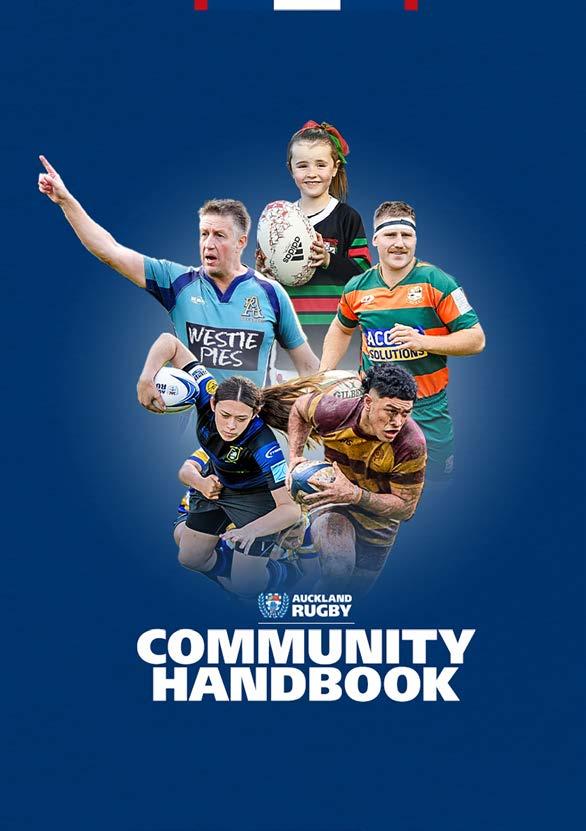
Permanent, Contract and On-hire solutions Call now on 0800 868 436 or check us out at roblawmax.co.nz The Civil Infrastructure, Engineering and Construction recruitment specialists for over 35 years

Contents 2024 Community Rugby Handbook List Of Officers 5 Board Of Directors 5 Message From The Chair Of Auckland Rugby 9 Auckland Rugby Staff 10 Club Officers And Delegates 17 2024 Rules Of Competition - Grades Under Control Of Adult Rugby Committee 54 New Experimental Domestic Safety Law Variations (EDLSVs) & World Rugby Changes 2024 83 Junior Club Section 91 2024 Junior Rugby Grade Weight/Age Chart 138 2024 School Rugby Contacts 146 2024 Rugby Dates 149 Auckland Secondary Schools Rugby Union Constitution 151 Club and Council Grounds 154 Blue Card Overview 156 Disciplinary Section 157 AUCKLAND RUGBY HANDBOOK 2022 PARTNERS Postal Address P O Box 56 152, Dominion Road, Auckland 1446 Office Entry B, Level 6, North Stand, Eden Park, Walters Road, Auckland Office Hours 8.30am to 5.00pm Telephone 815 4850 www.aucklandrugby.co.nz www.aucklandrugby.co.nz 1




Auckland Rugby | Handbook 2024 2
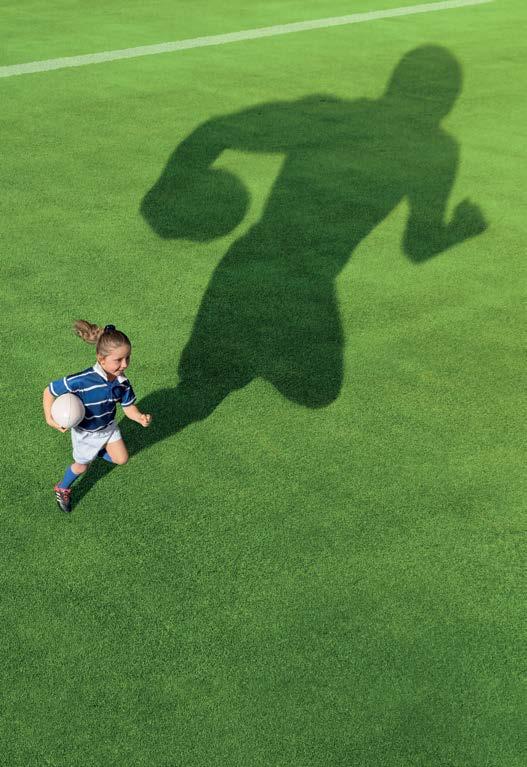
www.aucklandrugby.co.nz 3

OFFICIAL APPAREL PARTNER OF AUCKLAND RUGBY PALADIN - THE BEST KIT FOR YOUR CLUB OR SCHOOL Liam Robinson E: liam@paladinsports.com M: 027 548 6464 SHOP ARFU MERCH! Auckland Rugby | Handbook 2024 4
List Of Officers
Patron
Life Members
President
Honorary Lawyer
K Nelson
K Baguley
MJ Dick
RA Fisher
J Hart
W Jelicich
D McKay
K Nelson
P Thompson
G Whetton
Sir BG Williams
Seiuli Fiao’o Fa’amausili
Anil Rana
Board Of Directors
Seiuli Fiao’o Fa’amausili
Amanda Cox
Keven Mealamu
Brandon Jackson
Tony Catton
Lara McKittrick

R Davy
G Donovan
G Fox
Sir G Henry
B McCahill
D Mullins
T O’Hanlon
G Wahlstrom
A Whetton
B Wilsher
Brent Metson
Greg Edmonds
Chris Fairbairn
Andy Roberts
Michaela Barnes
Printed by AlpinePrint an environmentally friendly company using only sustainable resources in the production of this publication.
an environmentally friendly company using only sustainable resources in the production of this publication.
Please remember to recycle when disposing of this product.
Printed by www.aucklandrugby.co.nz

5
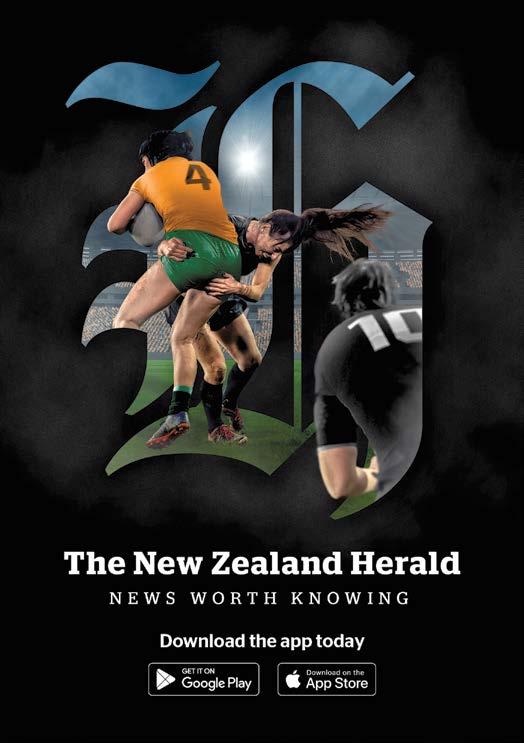
Auckland Rugby | Handbook 2024 6
Proud supporters of Auckland Rugby



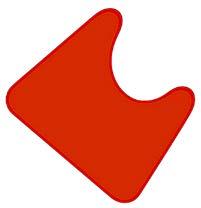



If you’re after a mobile or broadband plan that scores big on value and price, find us in store or online at 2degrees.nz
7
www.aucklandrugby.co.nz

to partner with Auckland Rugby WE’RE PROUD
For 20 years we’ve proudly serviced New Zealand sporting clubs, schools and weekend warriors.
We pride ourselves on supporting community partners, from grassroots to the elite.
Our wide range of Sport, Fitness & Active Play equipment has been developed by our professional team who live and breathe the industry.
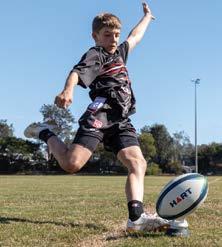
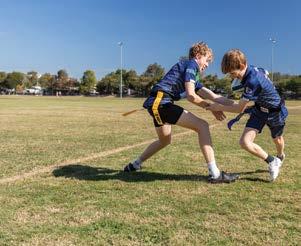
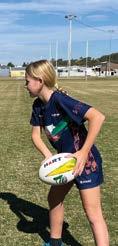
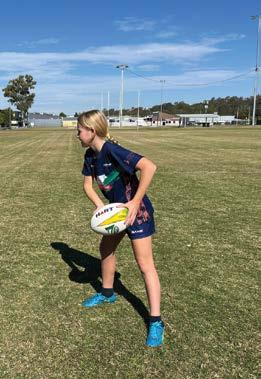
Balls
Post Pads
Contact Training
Corner Posts & Field Marking
Training Accessories
Advertising Wedges
We’re always ready to help your club.
We proudly manufacture over 700 products in our own factory.
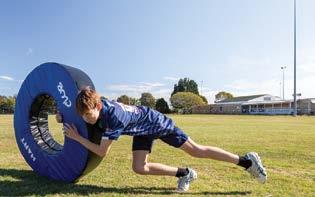

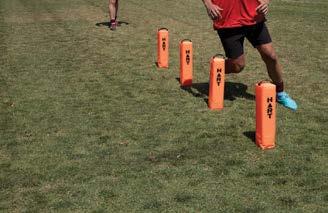






Check out the full range online! START DESIGNING
HART Auckland Rugby A5 Ad.indd 1 16/02/2024 2:45:54 PM Auckland Rugby | Handbook 2024 8
The Chair Of Auckland Rugby
Kia ora, Malo e lelei, Talofa lava, welcome to another exciting season of community rugby in Auckland. We hope you will enjoy another year of fun footy experiences with your mates.
On behalf of everyone at Auckland Rugby I would like to thank you for your contribution and support of our Community game. There are over 20,000 community rugby participants in Auckland playing over 10,000 games every year.
Your support is critical to ensuring these participants have the opportunity play our game at club and at school. We value your help!
Auckland Rugby has a simple and heartfelt goal – Create a better Auckland, built by Rugby. We recognise, particularly in these uncertain times for our youth, the value of being involved in community sport and fostering the sense of belonging and mate-ship that comes with club and team.
Our board and staff are working hard and are committed to innovating where we need to, whilst respecting the traditions and values that have built our game.
I wish you all the best for the coming season, trusting it will be fun and rewarding and look forward to welcoming you back in the future.
Kind Regards
Brent Metson Chair
Auckland Rugby Union.
www.aucklandrugby.co.nz 9
Auckland Rugby Staff
Management DDI Mobile Chief Executive Jarrod Bear Executive Assistant Anna Neville 815 4833 021 263 8254 Business Support & Planning Head of Business Support & Planning Paula Kent 021 645 132 Assistant Accountant Gavin Tansey 815 4862 022 016 6716 Accountant Bruce Whiteman 815 4800 Insights Analyst Alex Dalzell 027 727 7280 Commercial & Partnerships Head of Commercial & Partnerships Dan Dale 021 453 361 Commercial Partnerships Manager Lauren Mitchell 027 433 8740 Communications & Content Manager Jared London 027 1800 2712 Marketing & Membership Manager Grant McKenzie 027 201 0826 Ticketing Services Manager Nic Mowday 027 201 0833 Auckland Rugby | Handbook 2024 10
Auckland Rugby Staff
Operations & Facilities DDI Mobile Head of Operations & Facilities Grant Wilson 021 435 376 Event Manager Cody Neilson 021 151 5379 Match Operations Manager David Gainsford 027 288 9807 Operations Administrator Sophie Booth 027 1800 1350 Referee Manager Junior Khan Referee Development Manager Antony Petrie 027 1800 4330 Pro Sport Education Manager Paul Van Etten 021 822 831 Pro Sport Program Teacher Kate Baskerville 021 417 622 Pro Sport Coordinator Jacob Saunders 021 268 2785 Participation & Development Club Rugby Manager Joe Blundell 027 425 2951 Game Development Manager Joseph Tuitavake 027 201 0821 Game Development Officer Roi Hansell-Pune 021 244 0104 Game Development Officer Anna Peterson 021 253 9010 www.aucklandrugby.co.nz 11
Auckland Rugby Staff
Participation & Development DDI Mobile Club Development Manager Strahan McIntosh 027 960 6558 Club Rugby Partner Alexander Jane 027 808 0304 Club Rugby Partner Jack Johnston 022 850 0489 Club Rugby Partner Caoimhe Hunt 021 286 9040 Rugby Experience & Schools Manager Jarrod Syman 027 622 5853 Rugby Delivery Lead Marcel Milo-Harris 021 238 0160 Rugby Delivery Lead Taurima Morris 027 917 4168 Rugby Delivery Lead Eamon Reily 027 1800 4727 Rugby Delivery Lead Kennedy Limpus 021 141 0228 High Performance Head of High-Performance TBC Women’s Player Development Manager Anna Richards 021 403 840 High Performance Academy Manager Brent Ward 021 322 565 Personal Development Manager Andrea Thomas 027 200 1866 Auckland Rugby | Handbook 2024 12
Auckland Rugby Staff
NPC
Head
Assistant
Brent Ward
Assistant Strength &
Doctor
Physiotherapist
Performance Analyst
FPC Team
Head Coach
Assistant Coach
Manager
Head
Physiotherapist
Performance Analyst
Hayden Nelson
Ilze Jacobs
Mark Plummer
Josh Yarnton
Greg Aldous
Anna Richards
Francis Stowers
Ben Sinnamon
TBC
Ashleigh Parrott
Courtney Wilson
Daniel Rees
High Performance DDI Mobile Talent ID & Recruitment Manager James Stevenson-Wright 027 808 8533 Strength & Conditioning Coach Hayden Nelson 022 174 4132
Team
Coach Craig McGrath
Coach
Hickey Manager
Steven Bates Jono
Grant Wilson
& Conditioning Coach
Head Strength
Scott Pinfold
Conditioning
Strength & Conditioning Coach
13
www.aucklandrugby.co.nz
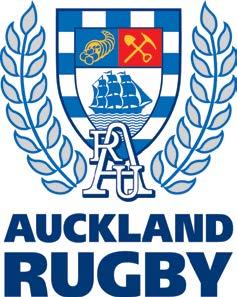
AUCKLAND RUGBY HANDBOOK 2022 13
Auckland Rugby | Handbook 2024 14
PARTNERS
PARTNERS
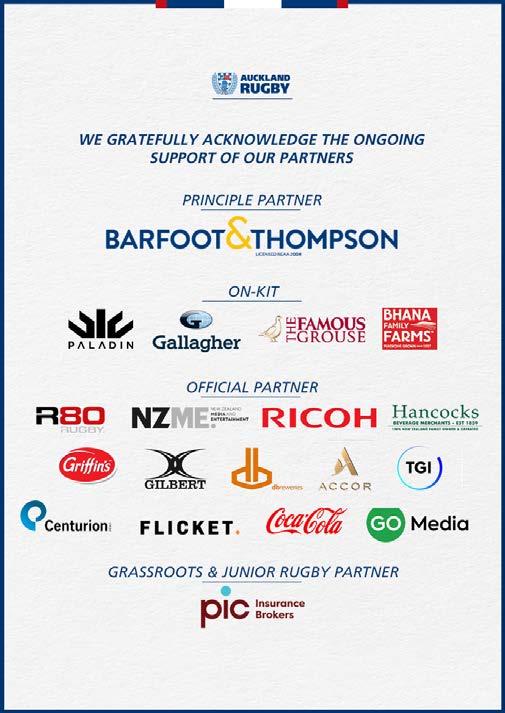
www.aucklandrugby.co.nz 15
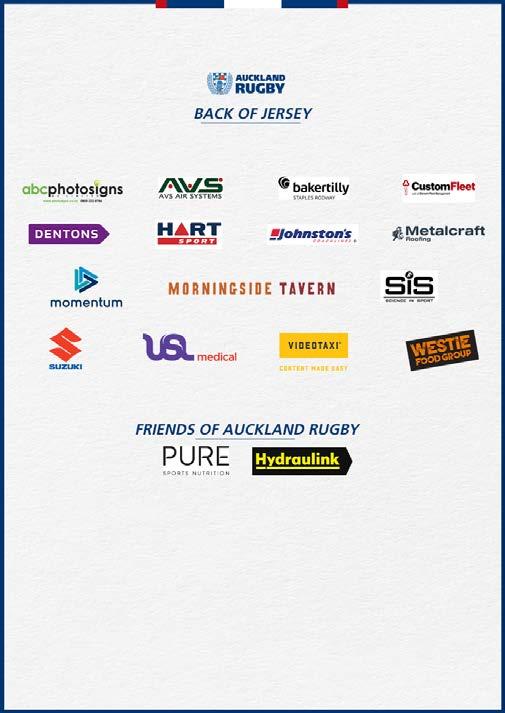
Auckland Rugby | Handbook 2024 16

AUCKLAND RUGBY HANDBOOK 2022 13
www.aucklandrugby.co.nz 17
PARTNERS CLUB OFFICERS AND DELEGATES

15% OFF for All Auckland Rugby Community Members - Use Code AKLRUGBY24 puresportsnutrition.com Interested in a Wholesale Account for Your Club? Email sales@puresportsnutrition.com Your training and game day hydration and nutrition are sorted with PURE Sports Nutrition. Scientifically formulated to give you everything you need and nothing you don’t, tested by real athletes for proven performance in training and on game day. PURE Sports Nutrition boasts a range of Electrolyte Hydration, Protein and Energy Gels that are gluten free, have no artificial flavours or colours and are made in New Zealand with only premium ingredients. Stomach friendly formulations that are easy to digest, not super sweet and taste great. Fuel your game with PURE Sports Nutrition Auckland Rugby | Handbook 2024 18
Auckland University Rugby Football Club
Clubrooms Situated at Colin Maiden Park, 71-73 Merton Rd, Glen Innes
Club Colours Royal Blue, Silver & White
Club Phone Number 528 0688
Club Fax Number 528 0662
Postal Address Po Box 18 213, Glen Innes
Email
Website

admin@aurfc.co.nz
www.aurfc.co.nz Mobile Email President Dave Clark 0274 985 274 dave@clarkfamily.co.nz Board Chairman David Hutchens 0274 991 824 hutchensnz@gmail.com General Manager John Afoa 021 060 9086 john.afoa@aurfc.co.nz Secretary Simon Cartwright 022 301 9870 simon.cartwright@heskethhenry.co.nz Game Development Officer & JRC Delegate Saua Leaupepe 021 273 24770 ce@aurfc.co.nz Community Engagement Officer Saua Leaupepe 021 273 24770 ce@aurfc.co.nz Junior Rugby Development Officer Max Douglas 027 280 0198 max.douglas@aurfc.co.nz COD Delegate Daniel Braid 027 403 0282 braid144@msn.com Premier Head Coach Jason McLean 021 537 074 jason.mc1@xtra.co.nz Premier Head Coach Tyrone Elkington-MacDonald 027 8280353 tyroneelkington@gmail.com Premier Manager Kevin Dick 021 271 5815 kdick70@gmail.com Junior Chairman David Sisam 021 650 721 David.Sisam@webbhenderson.com www.aucklandrugby.co.nz 19
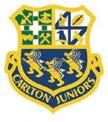

Carlton Juniors Rugby Club Clubrooms Situated at Puriri Drive, Epsom, Auckland Club Colours White, Green & Gold Club Phone Number 021 651 777 Mobile Email JRC Delegate Joel Stewart 021 651 777 carltonjuniors@gmail.com Junior Rugby Development Officer Joel Stewart 021 651 777 carltonjuniors@gmail.com ARDING EDEN GOLD! We offer a complete range of painting and decorating services “Supporting Grassroots Rugby” NORTH HARBOUR DECORATING SERVICES RESIDENTIAL | COMMERCIAL | QUALITY WORKMANSHIP Phone Eddie: 021 657 578 Auckland Rugby | Handbook 2024 20
College Rifles Rugby Union Football & Sports Club Inc

Clubrooms Situated at 33 Haast St, Remuera Club Colours Blue & White Club Phone Number 520 3201 Club Fax Number 520 6729 Postal Address Po Box 28 186, Remuera Email info@collegerifles.co.nz Website www.collegerifles.co.nz Mobile Email President Craig Lawson 021 521 196 craig.skoop@gmail.com Rugby Chairman Gavin Neil 021 620997 gavin@gdfnz.co.nz General Manager Bevan Cadwallader 027 201 0824 bevan@collegerifles.co.nz J Functions / Facilities Sarah Petrie 021 289 9800 functions@collegerifles.co.nz Junior Sport Development Officer Jessika Rowe 027 478 0287 juniorsport@collegerifles.co.nz Rugby Development Officer Trent Freeman 021 399 779 rdo@collegerifles.co.nz COD Delegate Logan O’Connel 021 521 196 loganoconnell2011@gmail.com JRC Delegate Jessika Rowe 027 478 0287 juniorsport@collegerifles.co.nz Premier Head Coaches Graeme Phillips 021 02641385 Graeme.phillips@teamwass.com Terry Kimiangatau 021 524 350 tkimiangatau@onetreehillcoege.school.nz Premier Manager Simon Craig 021 688031 simon_rugby@xtra.co.nz www.aucklandrugby.co.nz 21
East Tamaki Rugby Football Club
Clubrooms Situated at: 244 East Tamaki Road, East Tamaki, Auckland 2023
Club Colours: Emerald / Bottle Green, Red & White
Club Phone Number: 021 233 4177
Postal Address: PO Box 217 190, Botany Junction, Auckland 2164
Email: operations@easttamakirugby.co.nz
Website: www.sporty.co.nz/easttamakirfc
Mobile Email
President
Francis Leilua
Vice President
Poutoa Papali’i
Chairman
021 210 9825 fleilua@shec.school.nz
021 481 501 poutoapapalii@xtra.co.nz
Becker Broughton 021 043 8042 beckerbro@yahoo.co.nz
Club Secretary
Lorrain Robson 021 043 8042 admin@easttamakirugby.co.nz
Club Treasurer
Meliame Mafi-Paongo
COD Delegate
Ioane Ioane
JRC Delegate
021 169 6228 Etreasurer@easttamakirugby.co.nz
021 0275 7109 ioaneioane300@gmail.com
Atunaisa Namoa admin@easttamakirugby.co.nz
Premier Head Coach Manitisa Pongi
Premier Manager
Premier
U21s
U21s
President Coach Amosa
President Manager
Edie-May Johnson
021 233 4177 operations@easttamakirugby.co.nz
Grounds Rep TBC operations@easttamakirugby.co.nz
Teni Mafi
Development Head Coaches Lafaele Sefo & Pili Magele
Coach
Makoni
Oliveti
027 647 5020
Manager
Willie Eleele 022 532 4157 willz0405@hotmail.com
Amosa
EASTTAMAKI RUGBY FOOTBALL CLUB Est. 1962 IMPOR Master Auckland Rugby | Handbook 2024 22
Eden Rugby Football Club
Clubrooms Situated at Gribblehirst Park, 225 Sandringham Rd, Auckland
Club Colours Gold, Black & White Hoops
Club Phone Number 846 2107
Postal Address PO Box 16 083, Sandringham
Email clubmanager@edenrugby.co.nz
Website www.edenrugby.co.nz
Junior Facebook www.facebook.com/EdenRugbyFootballClub/
Senior Facebook www.facebook.com/edenrugbynz/
Senior
Senior/COD
Junior
JRC
Premier
Club
Greg
Mobile Email President Phil Hall 021 4995 0225 president@edenrugby.co.nz Chairman Nga Mareva 021 916 764 chairman@edenrugby.co.nz
Club Captain Cleith Tausi 021 836 236 clubcaptain@edenrugby.co.nz
Delegate
Saggers 027 457 3532 seniordelegate@edenrugby.co.nz
Paul
Club Captain Aaron Gilbert-Smith 021 025 54743 juniorclubcaptain@edenrugby.co.nz
Delegate Daniel Erickson 021 333 844 juniordelegate@edenrugby.co.nz
Head Coach Iggy Costa 021 089 02662 David Bateman 027 493 7700
Booking (Hireage)
clubmanager@edenrugby.co.nz EASTTAMAKI RUGBY FOOTBALL CLUB Est. 1962 IMPORTANT INFORMATION REGARDING EDEN GOLD! Master Logo www.aucklandrugby.co.nz 23
de Joux



Grammar Juniors Rugby Club Clubrooms Situated at Shore Road Reserve, 32B Shore Road, Remuera Club Colours Navy & Gold Club Phone Number 021 396 356 Postal Address PO Box 28109, Remuera, Auckland Website www.grammarjuniors.org.nz JRC Delegate Craig Caesar 022 102 8453 craig@caesarhomes.co.nz Operations Manager Kerin Edwards 021 396 356 grammarjuniorsrugby@gmail.com Club Captain Barry Boyden 021 955 050 barry.boyden@craigsip.com MAKI ALL CLUB 1962 IMPORTANT INFORMATION REGARDING EDEN GOLD! Master Logo SIMPLY GREAT TEAM PHOTOS 0800 274 6868 | photos@farrelly.co.nz since for ages Search ‘FARRELLY PHOTOS’ of older people Centre’? also clients needs. answer Co-ordinator service Chris. Response 9840 Janette Turner Age Concern Southland Manager From the Manager... Follow us on facebook type ‘Age Concern Southland’ Welcome to the last magazine for the year, this year has gone fast. Christmas songs and decorations are starting to appear and so is the more settled weather. All restrictions are lifted and people are starting to move about more, if you still want to wear a mask please ensure you do. You still need to wear a mask in the Chemist, Rest Homes and Doctors office. If you have any concerns about coming back out into the community please contact Age Concern and one of the staff can pop out and have a chat to see if we can help. AGE CONCERN VISITING SERVICE Living with the uncertainty and the worry of all that is happening of late for some older people is they are becoming even more anxious and isolated. One way we can promote healthy ageing is through our in home befriending Accredited Visiting Service. Why is having a regular visitor important? • Loneliness causes suffering, depression, alters your thought patterns, can bring on early health problems. • Being socially isolated is as bad for your health as smoking, drinking too much or obesity • Older people with weak social connections can be more likely to go into residential care early for support and companionship FIND US ON Auckland Rugby | Handbook 2024 24
Grammar Tec Rugby Club
Clubrooms Situated at 36 Reihana Street, Orakei Domain
Club Colours White, Green, Gold, Black / Blue & Navy
Club Phone Number 521 0538
Postal Address PO Box 42 210, Orakei
Website www.grammartec.co.nz

President
Mike Donovan
Chairman
Brandon Jackson
COD Delegate
Stephen Sinclair
General Manager
Shane van Velzen
JRC Delegate
John Hall
Junior Rugby Development Officer
donov.mj@gmail.com
TBC juniors@grammartec.co.nz
Premier
Premier
Mobile Email
0292012788
021 417 885 brandon_jackson@bnz.co.nz
021 330 053 stephen@thebakery.co.nz
021
271 0999 shane@grammartec.co.nz
021
100 7259 juniors@grammartec.co.nz
Coach Nooroa Tokahere 027 808 4197 nooroa@grammartec.co.nz
Manager Sarah Hutchinson 021 080 78372 hutchinsonsarah83@outlook.com Director of Rugby Nooroa Tokahere 027 808 4197 nooroa@grammartec.co.nz EASTTAMAKI RUGBY FOOTBALL CLUB Est. 1962 IMPORTANT INFORMATION REGARDING EDEN GOLD! Master Logo www.aucklandrugby.co.nz 25
Manukau Rovers Rugby Football Club
Clubrooms Situated at 65 Viscount Street, Mangere
Club Colours Red, Black and White
Club Phone Number 09 275 4934
Postal Address PO Box 43 006, Mangere
Email manukaurugby@xtra.co.nz
Website www.sporty.co.nz/manukaurovers
Mobile
Email
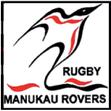
President
Max Woodard 021677695 flyers@orcon.net.nz
Chairman/Treasurer
Jason Myks 0212523011 jason.mk@hotmail.co.nz
Secretary
Teresa Lemalu 0275574374 tlemalu01@outlook.com
Senior COD Delegate
Samoa Sa’u 0273527218 samosau8@gmail.com
JRC Delegate
Scott Morrow 021 251 2802 scott@morrowfurniture.co.nz
Auckland Rugby | Handbook 2024 26
Marist Brothers Old Boys Rugby Club (Auckland Inc)
Clubrooms
Club Colours
Club Phone
Postal Address
Blue, Dark Blue, Scarlet
598
Box 14 354, Panmure
Website www.aucklandmarist.co.nz

Premier
Situated at 20
Dunkirk Rd, Panmure
Light
Number 021 875
PO
Mobile Email President Ivan Tasi 021 857 807 iktasi@hotmail.co.nz
of Operations
doo@aucklandmarist.co.nz Director of Rugby Doug Sanft 021 262 2807 gdm@aucklandmarist.co.nz COD Delegate Tony Catton 021 741 263
Coach Doug Sanft 021 262
gdm@aucklandmarist.co.nz
Chair Davida Suasua Director
TBC
Premier
2807
Manager
- Ken Johns 029 770
kenjohns@polymerprocessing.co.nz www.aucklandrugby.co.nz 27
TBC
9590
Marist Eastern Rugby Football Club
Clubrooms Situated at: Barry Curtis Park, Flatbush School Rd, Ormiston
Club Colours: Navy, Red, Sky
Club Phone Number: 020 4031 2425
Postal Address: 6 Millisle Place, Dannemorea
Email: operations@merugy.co.nz
Website: www.merugby.co.nz
Mobile
Email

President
Ross Blenkinsopp 021 761 362 president@merugby.co.nz
JRC Delegate
Ross Blenkinsopp
Choppa Casey (back-up) 027 271 0385 president@merugby.co.nz
Treasurer
Bob Prasad operations@merugby.co.nz
Secretary
Shona McCarthy operations@merugy.co.nz
Registrations
Tracey McNamara operations@merugy.co.nz
Nursery Rippa Co-Ordinator
Lynda Casey 021 2089 409 operations@merugy.co.nz
Auckland Rugby | Handbook 2024 28
Mount Roskill Juniors Rugby Football Club
Clubrooms
Patron
K Nelson
Club Colours
Club Phone Number
Life Members
K Baguley
Postal Address
R Davy
Roskill
P
Red, Black and White
G Wahlstrom
629 5948
Unit 2, 9 Longreach Drive, Sunnyvale
Sir
Email Sec.ros@xtra.co.nz

Website
MJ Dick
G Donovan
RA Fisher
G Fox
J Hart
President
Sir G Henry
W Jelicich
D McKay
Secretary/Treasurer Ross
D Mullins
Junior
K Nelson
T O’Hanlon
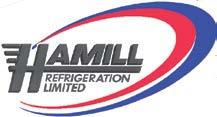


Situated at Fearon Park,
33 Akarana Ave, Mount
www.mountroskillrugby.co.nz Mobile Email
Dayle Cowley 021 972 447 daylegenys@hotmail.com
027 797 7420 sec.ros@xtra.co.nz
Kay
RDO Fou Tuivaiti 021 175 3950 foutuivaiti@hotmail.com
Thompson
G Whetton
A Whetton
President Seiuli Fiao’o Fa’amausili Honorary Lawyer Anil Rana LIST OF OFFICERS Estab 1984. Institution of Kingsland, Auckland Fully Licensed RestaurantDine in or Takeout Set menus, catering to group bookings, functions P: 09 849 4501 • www.papas1.co.nz 61 Sandringham Road, Kingsland OPEN 7 DAYS • Opposite Eden Park Proud to support rugby and invite supporters teams and management to drop by for one of our delicious wholemeal pizza’s Commercial & Marine Refrigeration Coolrooms/Freezer Rooms Bottlecooler Hoshizaki Icemakers BUNN Slushy Machine 21 Karaka Street Newton PO Box 68-557, Newton 24-Hour Phone: 0800 HAMILL (426455) Email: bill@hamill.co.nz www.hamillrefrigeration.co.nz Commercial & Marine Refrigeration Coolrooms | Freezer Rooms | Bottlecoolers Hoshizaki Icemakers | BUNN Slushy Machines www.hamillrefrigeration.co.nz 0800 HAMILL (426455) | bill@hamill.co.nz 21 Karaka Street, Newton | 24 Hours www.aucklandrugby.co.nz 29
BG Williams
Mt Wellington Rugby Club
Clubrooms Situated at Hamlin Park, Wilson Way, Mt Wellington
Club Colours Gold, Green
Club Phone Numbers 09 570 4527
Postal Address Po Box 62020 Sylvia Park
Email info@mtwellingtonrugby.co.nz
Website www.mtwellingtonrugby.co.nz.
Facebook www.facebook.com/mtwellingtonrfc

President / Chairman
George Gerrard
Treasurer
Jeff Towers
Secretary
Roka Pekepo
COD Delegate
Warren Makaua
Mobile Email
027 3350098 georgegerrard71@gmail.com
027 492 6285 jeff.towers@yahoo.co.nz
021 0538813 office.mwrugby@yahoo.com
021 049 7468 pigsy0688@gmail.com
JRC Delegate / Junior Rugby Coordinator
Natalia Solomon 021 0871 3155 junior.rugby02@gmail.com
Club Captain
Darin Housham
022 1698 622 proworxpropertycare@gmail.com
Auckland Rugby | Handbook 2024 30
Otahuhu Rugby Football Club
Clubrooms
Club
Club
Postal

Situated at 8 Awa Street,
Otahuhu
Colours Red
and Black
Phone Number 276
3558
Address Po
22
Email oatsrugby@gmail.com Mobile Email President Aiolupotea John Roache 027 5295 376 Jeroache@xtra.co.nz Secretary Jack Scanlan 021 562 792 J.Scanlan@massey.ac.nz JRC Delegate Jamie Hu’akau 021 084 49558 jmsua01@yahoo.co.nz Treasurer Penani Iuvale 021 483 650 iuvalepenani@yahoo.com COD Delegate Lino Faumauina 027 279 8318 onilanis@hotmail.com Operations Manager Tommy Roach 027 518 0336 otahuhurugby@admn@gmail.com Senior Rugby Coordinator Semau Tulaga 021 195 1695 lagatavita@gmail.com Premier Head Coach Sae Faalupepega Magele 020 406 76122 saefaalupega@gmail.com www.aucklandrugby.co.nz 31
Box
226, Otahuhu
Pakuranga United Rugby Club
Clubrooms Situated at 73 Bells Rd, Lloyd Elsmore Park, Pakuranga
Club Colours Green and Orange
Club Phone Number 576 7928
Club Fax Number 576 7966
Postal Address PO Box 38 076, Howick
Email gm@purc.co.nz
Website www.purc.co.nz
President
Michael
Chairman
Rob Neil
General Manager
Mike Bongiovanni
Accounts
Clare Zwaan
Junior Rugby Administrator
Charles Gibson
Club
Brent
Senior
Damon
COD
JRC Delegate
Dave
Grant
Premier
Grant
Premier
Neville
Junior
Andrew

576 7928 ext 3 accounts@purc.co.nz
576 7928 ext 1 juniors@purc.co.nz
Mobile Email
Biddick 027 492 0920 michael@accesssolutions.co.nz
021
robn@safarigroup.co.nz
227 6202
021 576
gm@purc.co.nz
786
Bus:
Bus:
Captain
Soper 027 722 109 brento22222@gmail.com
Chairman
Newton 021 687 893 damon@fgc.co.nz
Delegate
021 647 171 marcd@orcon.net.nz
Mark Diffey
of Rugby
Grant Mobile:021 512 567 davenjo56@gmail.com Director
Henson 027 255
rugbydirector@purc.co.nz
8082
Coach
Henson 027 255
rugbydirector@purc.co.nz
8082
Manager
Shirley 022 400
nshirley@xtra.co.nz
8424
Chairman
White 021 687
andrew.white@glowlab.co.nz Auckland Rugby | Handbook 2024 32
893
Patoetoe Rugby Football Club
Clubrooms
Club
Club
Postal
Email
Website
Facebook
& White Hoops

are Situated
at “Kolmar Centre” 295R Great South Rd, Papatoetoe or Sutton Cres, Opposite Hunters Plaza
Colours Red
Phone Number 2776710
dial 5 (Kolmar Centre)
Address PO
Box 23 229, Papatoetoe
paprfcgm@gmail.com (All general queries)
/ Online registration www.sporty.co.nz/papatoetoerugby
www.facebook.com/papatoetoeRFC Twitter @PapatoetoeRFC Instagram @papatoetoerugby Mobile Email President Rick Steedman 027 276 4279 rick.steedman@outlook.com Chairman Luke Mealamu 021 112 3127 mmcorporatesecuritys@gmail.com General Manager Faatiga Lemalu 021 02662 199 paprfcgm@gmail.com Vice President Paul Maguire 027 483 6494 manukau652@gmail.com COD Delegate Bill McCormick 021 233 2730 JRC Delegate Juliet Fa’aui 027 609 9684 paprugbyjrc@gmail.com Secretary Celia Hunkin 021 0277 8715 papatoetoerugby1946@gmail.com Kolmar Trust Board Member Neil Ronaldson 027 3355 862 User Group Rep & Grounds Rep Brett Young 021 02107744 facilitiesbybrett@gmail.com Premier Coach Sam Aiono 021 088 69423 samaiononz@gmail.com www.aucklandrugby.co.nz 33
Ponsonby Rugby Club Inc.
Clubrooms Situated at 1 Stadium Rd, Western Springs
Club Colours Blue & Black Hoops
Club Phone Number 846 9954
Postal Address Po Box 47 023, Ponsonby
Email admin@ponsonbyrugby.co.nz
Website www.ponsonbyrugby.co.nz Mobile Email
President
John Tetini
Chairman
Chris Clews
Club Administrator
Sandra Ioane
Club Ambassador
Bryan Williams
General Manager
Patrick Rhodes
Director of Rugby
Peter Leulusoo
Junior Chairman
Stephen Brown
COD Delegate
Michaela Barnes
JRC Delegate (City)
Geoff Buchanan
JRC Delegate (Kelston)
Mark Sutton
Premier
Premier

021 060 6736 jtetini@hotmail.com
021 728 622 chrisc@degroup.co.nz
021 029 96223 admin@ponsonbyrugby.co.nz
021 773 960 beegee.w@xtra.co.nz
027 869 8764 gm@ponsonbyrugby.co.nz
021 314 344 dor@ponsonbyrugby.co.nz
021838974 sljbrown@gmail.com
021 183 7554 michaelabarnes@gmail.com
Mobile:021 246 4861 gebuchanan@xtra.co.nz
021 246 4861 mark.sutton@carwarehouse.co.nz
Campbell
Managers Tyronne
021 318 225 ty@pioneerpies.co.nz
Ierome
Coach Jeff
Auckland Rugby | Handbook 2024 34
021 151 6823 jeromejeff@gmail.com
Puketapapa Roskill Sports Club

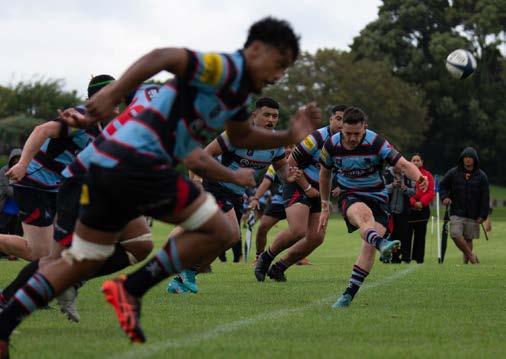
Club Colours Red and Black Club Phone Number N/A Postal Address 58A Frost Road, Mount Roskill Email puketapaparoskill@gmail.com Website N/A Mobile Email COD Delegate/Chairperson Russell Su’a 021 225 3036 russellsua@hotmail.com Administrator Ms Mattie TUIALII 021 177 1847 mattietuialii@gmail.com (shared with Lupe Havea) Health and Safety Officer Lupe Havea 021 130 3655 teukialupehavea@gmail.com www.aucklandrugby.co.nz 35
Suburbs Rugby Football Club
Clubrooms Situated at 200 Portage Road, New Lynn
Club Colours Red and Blue
Club Phone Number 828 9387 or 827 4812
Postal Address Po Box 19 336, Avondale
Email admin@suburbsrugby.co.nz
Website www.suburbsrugby.co.nz
Mobile Email
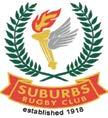
President
Peter Osborne
Chairman
Thomas Curtis
Club Secretary/Administrator
Wayne Dowd
Club Treasurer
Bryan Curtis
Club Captain
Scott Collings
COD Delegate
Dave Johnson
Junior Chairman
Darren Brewer
Junior Development Officer
Ethan Nisbett
Premier Coach
Glenn Climo
Premier Manager
Tai Kingi
021 106 9844 p_osborne@xtra.co.nz
027 477 7203 thomas.curtis@mainfreight.co.nz
0210482641 admin@suburbsrugby.co.nz
021 886 037 bryan.curtis@tdlgroup.co.nz
027 589 3154 scottc@mainfreight.co.nz
021 487 981 akajuganut@gmail.com
027 271 1414 juniors@suburbsrugby.co.nz
021 158 3832 rdo@suburbsrugby.co.nz
022 693 1824 glenn@5digital.co.nz
021 807 887 tai.kingi@asb.co.nz
Auckland Rugby | Handbook 2024 36
Te Papapa Onehunga Rugby & Sports Club
Clubrooms Situated at Fergusson Domain, 5 Olea Rd Onehunga, Auckland 1061
Club Colour Gold & Navy Blue
Club Phone Number C/- 027 281 7045
Postal Address Po Box 13 586 Onehunga, Auckland 1643
Email

www.tepapapasportsclub.nz Mobile Email Chairperson – Rugby Section Tee Mauga 022 425 3641 aitunum@hotmail.com Secretary Stacey Fainu 021 161 9505 corrigans312@gmail.com Treasurer - Rugby Section David Bell 022 010 5493 dbell.tempest@gmail.com Club Manager Ben Eder 027 326 0666 tepapapasportsclubassistant@gmail.com ARU Delegate Gary Froggatt 027 281 7045 gary.tram@xtra.co.nz COD Delegate Steve Hessey 021 314 729 tepapapajuniorsrugby@gmail.com Booking Officer Suzi Kata 027 587 4440 suzikata@hotmail.com JRC Delegate Steve Hessey 021 314 729 tepapapajuniorsrugby@gmail.com Junior Rugby Coordinator Steve Hessey 021 314 729 tepapapajuniorsrugby@gmail.com www.aucklandrugby.co.nz 37
gary.tram@xtra.co.nz Website
Waiheke Rugby Football Club
Clubrooms
at Pavilion, Onetangi Sports Park, O’Brien Rd, Waiheke Island
Club Colours Green, White and Gold Collar
Club Phone Number 0274536537 (Emma Musson Secretary)
Postal
Po Box 224, Ostend, Waiheke Is

Situated
Email waihekercsecretary@gmail.com Website www.sporty.co.nz/waihekerugby Mobile Email President Jimbo (James) Bailey 027 464 1310 jimbojamesbailey1@gmail.com Chairman Vanessa McTavish 021 278 1798 vanessa.waiheke@gmail.com Secretary James Campbell 021 897 213 waihekercsecretary@gmail.com Treasurer Nathan Musson 021 314 419 waihekerugbytreasurer@gmail.com COD Delegate James McKelvie 021 0264 2556 McKelvie.james@gmail.com Club Manager Anna Morrison 021 0265 4641 waihekerugbyclubmanager@gmail.com Club Captain Huia Pocklington 027 301 9277 waihekejuniorrugby@gmail.com Auckland Rugby | Handbook 2024 38
Address
Waitakere City Rugby Football Club
Clubrooms
Club
Club
Postal
Email
Box 21 241, Henderson

Situated
65-67 Central
at
Park Drive, Henderson
Colours: Maroon
and White
Phone Number 027 562
5446
Address Po
it.coordinator@waitakererugby.co.nz
www.waitakererugby.co.nz Mobile Email President Malcolm Marshall 021 044 213 malcolm@absolutekitchens.co.nz Chairman Tai Nuualiitia 027 562 5446 snr.rugby@waitakererugby.co.nz Treasurer Jason Rankin 021 811 978 treasurer@waitakererugby.co.nz Administrator Katie Mareva operations@waitakererugby.co.nz COD Delegate Don Urquhart 021 245 3713 snr.delegate@waitakererugby.co.nz JRC Delegate Saylesh Bhula jnr.delegate@waitakererugby.co.nz Club Captain Shaun Russell 021 183 9940 club.captain@waitakererugby.co.nz Head Coach Tu Nuualiitia 021 902 565 snr.rugby@waitakererugby.co.nz Senior Coaches Jake Curran 027 347 3318 Peña Falefa 021 155 9304 Nick Gordan 021 655 501 Womens Head Coach Collette Kalolo 021 078 4745 ckalolo@hotmail.co.nz www.aucklandrugby.co.nz 39
Website
DebtManagers are committed to helping manage customers out of debt, firstly by understanding their situation and then making repayment plans they car afford. We’re here to work with you and make a positive difference to your life and the communities we all live in.

Welcome to DebtManagers.
Auckland Rugby | Handbook 2024 40
Waitemata Rugby Football Club
Clubrooms Situated at 96 Swanson Road, Henderson
Club Colours Black Green and Red
Postal Address PO Box 21 065, Henderson
Email
admin@waitematarugby.co.nz
Website www.waitematarugby.co.nz
Mobile Email
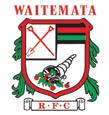
President
Peter Tubberty
Chairman
Vaughan Bridges
COD Delegate
Rod Gabb
Director of Rugby TBC
General Manager
Greg Aldous
Club Captain
Patrick Segi
JRC Delegate
Debbie Tane
Premier Coaches
021 319 529 chairman@waitematarugby.co.nz
021 923 424 rod@gabb.co.nz
021 345 265 gm@waitematarugby.co.nz
021 408 861 clubcaptain@waitematarugby.co.nz
027 213 7434 debbietane@hotmail.com
John Tu’ungafasi john@magicengineering.co.nx
Bryan Donnelly byrand@allblackshospitality.co.nz
Premier Manager
Dean Semmons
021 421 1149 semmons@xtra.co.nz
www.aucklandrugby.co.nz 41
Auckland Rugby Referees Association
President
Robert
Referee Manager
Junior Khan
Referee
Antony Petrie 027 439 0456 ant.petrie@aucklandrugby.co.nz
Chairman
COD
Paul
President
TBC
Chairperson
Jody Wong
Deputy Chairperson
John Fitch
Secretary
Jane
Treasurer
TBC
Mobile Email
Auckland Rugby Union Supporters Club
rob.harman@rmog.net
Harman 021 939 606
Development Manager
John Kennelly 021 497 890 john.kennelly@fisherpaykel.com
Delegate
Email
Van Etten 021 822 831 paul.vanetten@aucklandrugby.co.nz Mobile
0274 403 454 jodyfwong@gmail.com
027 472 7655 jafitchkiwi@gmaill.com
Kinghorn 0274 790 360 jane.kinghorn@airnz.co.nz
Auckland Rugby | Handbook 2024 42
Auckland Maori Rugby 2024
Tāmaki, Kia Mau! If you whakapapa Māori and enjoy rugby, whakapā mai. More information on our program can be found on our website, Facebook page or through Te Hiku o te Ika, Northern Region Māori Rugby website and Facebook page.
Facebook: Auckland Māori Rugby, Tāmaki Makaurau Whutupōro Māori
www.sporty.co.nz/aucklandmaorirugby
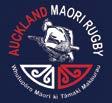
Tāmaki Makaurau Whutupōro Māori Board
Mihaere Emery
Jason
Ann
Alicia
Tracy Davis
Whakatauki (Mission Statement)
Herenga Tāngata, Herenga Rangatira
Weaving people together to become leaders.
Mobile Email President Rick Steedman 027 276 4279 rick.steedman@outlook.com Chairperson Max Guptill 027 474 2122 Max.guptill@mcct.org.nz
021 124 8560
Advisor)
(Cultural
Thompson 021 119 4927
Dawson 027 280 1705
Kerr 021 048 1683
027
318 2606
www.aucklandrugby.co.nz 43
Auckland Secondary Schools Rugby Union
Mobile Email
President
James Bentley Bus. 09 524 8108 jbentley@st-peters.school.nz
Chairperson
Brett Kingstone 09 524 8108 bkingstone@st-peters.school.nz
Secretary
Scott Mansell 021 510 257 mansell@tamaki.ac.nz
Executive Committee Members
Karl McLennan Botany Downs Secondary College
Allie Wright Mt Albert Grammar School
Tutuila Lio Vaauli St Pauls College
Chris Oates Auckland Grammar School
Francis Stowers Sacred Heart College
Max Guptill One Tree Hill College
Nigel Hurst De La Salle College
Scott Palmer Kings College
Jim Lonergan Macleans College
Alex Bing Marist College
Hamish Muirhead College Sport
Alison Hall Auckland Rugby Referees
Jarrod Syman Auckland Rugby Union
Auckland Rugby | Handbook 2024 44
Auckland Primary Schools Rugby Union
President/COD Delegate
Gareth Fetcher 021 255 4425 garethf@papint.school.nz
JRC Delegate
Gareth Fetcher 021 255 4425 garethf@papint.school.nz
Auckland P.I. Officers
Auckland Samoa
Moe Mataafa 021 237 6883 moemat2018@gmail.com
Nicholas Bakulich nbakulich@gmail.com
Auckland Tonga
Atunaisa Namoa 027 64 61571 naisa.namoa@gmail.com
Auckland Cook Island
President
Maia Samuela 021 142 5134 maia@cirugby.co.nz
Vice President
Stewart Tuatea stewart@cirugby.co.nz
Treasurer
Matilda Taruia matilda@cirugby.co.nz
Operations Manager
Opura Samuel opura@cirugby.co.nz
Auckland Niue (NARI)
Jimmy Kaufisi 027 650 0534 auckland.nari@gmail.com
Mobile Email
Mobile
Email
www.aucklandrugby.co.nz 45
NZ Barbarian Rugby Club Officers
Mobile Email
President
Craig Glendinning 027 241 1790 theglendinnings@hotmail.com
Past President
Bernie Allen 027 474 5073 bernie-allen@xtra.co.nz
Alan Whetton 0275 772 292 alan.whetton@qmsmedia.com
Ron Williams 021 908 610 ron.williams@zhdg.co.nz
Neil Cullimore 021 0422 067 neil.cullimore@yahoo.com
Bernie Allen 0274 745 073 bernie.allen@davenportswest.co.nz
Honorary Secretary
Monalisa Urquhart 021 426 354 sec@brfc.co.nz monalisa.urquhart@gmail.com
Honorary Treasurer
Grant McCurrach 021 779 8727 grant.mccurrach@findex.co.nz
Club Captain
Peter White 027 477 8485 petewhitenz@gmail.com
Club Manager
Trina Seits 021 059 803 manager@brfc.co.nz
Auckland Rugby | Handbook 2024 46
Condor Rugby Football Club Officers
Address 8a William Avenue, Greenlane
Postal Address PO Box 109 266, Newmarket
Phone Number 09 579 7426
Patron President
Glenn Wahlstrom Dave Hicks
027 435 5830 021 132 3818
wahlstrom@xtra.co.nz
davehicks2412@gmail.com
Chairman CEO
Eddie Mei Sonny Raina
0274 870 056 027 2512 254
eddie@condorsevens.co.nz
Board Member
sonny@condorsevens.co.nz
CFO
Jeni Pearce Andrew Higgs 027 4460 346 027 227 3412
jeni@condorsevens.co.nz
Board Member
andrew@condorsevens.co.nz
Board Member
Nic Lawrence Sean McGrath 027 842 2463 027 434 5420
nic@condorsevens.co.nz
sean@condorsevens.co.nz
Secretary Event Coordinator Vacant Vacant
Rugby Coordinator
Sam Rasch
Sponsorship & Marketing Coordinator
027 919 9919 021 189 2596
sam@condorsevens.co.nz
www.aucklandrugby.co.nz 47



We specialise in new builds, renovations, extensions, repiling, foundation repair, bathrooms, kitchens, decks, fences, landscaping and maintenance. We work with a team of highly qualified and skilled subcontractors to ensure the overall quality of a finished product. 022 676 8816 | jjbotica@rocbuild.co.nz RESOLVE I ORGANISE I CONSTRUCT www.rocbuild.co.nz Auckland Rugby | Handbook 2024 48
Provincial Unions - Union Contacts
NEW ZEALAND RFU
P.O. Box 2172, Wellington
e. info@nzrugby.co.nz
BAY OF PLENTY RFU
P.O. Box 4058, Mount Maunganui 3149
e. reception@boprugby.co.nz
BULLER RFU
P.O. Box 361, Westport 7866
e. andrew@bullerrugby.co.nz
CANTERBURY RFU
P.O. Box 755, Christchurch 8140
e. info@crfu.co.nz
COUNTIES MANUKAU RFU
P.O. Box 175, Pukekohe 2340
e. admin@steelers.co.nz
EAST COAST RFU
P.O. Box 106, Ruatoria 4043
e. admin@npec.co.nz
HAWKES BAY RFU
P.O. Box 201, Napier 4140
e. admin@hbrugby.co.nz
Ph 04 499 4995 Fax 04 499 4224
W. www.nzrugby.co.nz
Ph 07 574 2037
W. www.boprugby.co.nz
Ph 03 789 8330
W. www.bullerrugby.co.nz
Ph 03 379 8300 Fax 03 365 3565
W. www.crfu.co.nz
Ph 09 237 0033 Fax 0800 4 78429
W. www.steelers.co.nz
Ph 06 864 8812
Fax 06 864 8813
W. www.npec.co.nz
Ph 06 835 7617
W. www.hbmagpies.co.nz
www.aucklandrugby.co.nz 49
Provincial Unions - Union Contacts
HOROWHENUA KAPITI RFU
P.O. Box 503, Levin 5540
Ph 06 367 8059
e. office@hkrfu.co.nz W. www.hkrfu.co.nz
KING COUNTRY RFU
P.O. Box 394, Te Kuiti 3941
Ph 07 878 7545
e. office@kingcountryrugby.co.nz W. www.kingcountryrugby.co.nz
MANAWATU RFU
P.O. Box 1729, Palmerston North 4440 Ph 06 357 2633
e. pamh@manawaturugby.co.nz W. www.manawaturugby.co.nz
MID CANTERBURY RFU
P.O. Box 98, Ashburton 7740
Ph 03 308 8718
03 308 0103
e. admin@midcanterburyrugby.co.nz W. www.midcanterburyrugby.co.nz
NORTH HARBOUR RFU
P.O. Box 300492, North Harbour 0752
e. harbour@harbourrugby.co.nz
NORTH OTAGO RFU
P.O. Box 102, Oamaru 9400 Ph 03 434 2053
e. admin@northotagorugby.co.nz
NORTHLAND RFU
www.northotagorugby.co.nz
P.O. Box 584, Whangarei 0140 Ph 09 438 4743
e. reception@northlandrugby.co.nz
www.taniwha.co.nz
09 438 9185
Fax
Fax
Ph 09 447 2100
09 447 2101
W. www.harbourrugby.co.nz
W.
Fax
W.
Auckland Rugby | Handbook 2024 50
OTAGO RFU
P.O. Box 691, Dunedin 9054
e. orfu@orfu.co.nz
POVERTY BAY RFU
74 Grey St, Gisborne 4010
e. info@povertybayrugby.co.nz
RUGBY SOUTHLAND INC
P.O. Box 291, Invercargill 9840
e. reception@rugbysouthland.co.nz
SOUTH CANTERBURY RFU
P.O. Box 787, Timaru 7940
e. tracy@scrfu.co.nz
TARANAKI RFU
P.O. Box 5004, New Plymouth 4343
e. rachael@trfu.co.nz
TASMAN RFU
P O Box 7157, Nelson 7042
e. info@tasmanrugby.co.nz
THAMES VALLEY RFU
P.O. Box 245, Paeroa 3640
e. dianne@tvrfu.co.nz
W. www.thamesvalleyswampfoxes.co.nz
Ph 03 477 0928
W. www.orfu.co.nz
Ph 06 868 9968
W. www.povertybayrugby.co.nz
Ph 03 216 8694
Fax 03 216 8695
W. www.rugbysouthland.co.nz
Ph 03 688 8653
W. www.scrfu.co.nz
Ph 06 759 0167
W. www.trfu.co.nz
Ph 03 548 7030 (Nelson)
Ph 03 578 4070 (Blenheim)
W. www.tasmanrugby.co.nz
Ph 07 862 6352
www.aucklandrugby.co.nz 51
Provincial Unions - Union Contacts
WAIKATO RFU
P.O. Box 9507, Hamilton 3240
e. admin@mooloo.co.nz
WAIRARAPA BUSH RFU
P.O. Box 372, Masterton 5840
e. s.puddy@waibush.co.nz
WANGANUI RFU
P.O. Box 4213, Wanganui 4541
e. info@wanganuirugby.co.nz
WELLINGTON RFU
P.O. Box 7201, Wellington South 6242
e. mail@wrfu.co.nz
WEST COAST RFU
P.O. Box 31, Greymouth 7840
e. wcrugby@netaccess.co.nz
Ph 07 839 5675
Fax 07 838 1713
W. www.mooloo.co.nz
Ph 06 378 8369
W. www.waibush.co.nz
Ph 06 349 2313
Fax 06 347 8006
W. www.wanganuirugby.co.nz
Ph 04 389 0020
W. www.wrfu.co.nz
Fax 04 389 0889
Ph 03 768 7822
W. www.westcoastrfu.com
Auckland Rugby | Handbook 2024 52

www.aucklandrugby.co.nz 53
2024 Rules Of Competition
- Grades under Control of Council of Delegates
0.0 The Rules of Competition shall comprise two sections. They are:
(A) General Competition Rules; and (B) Schedule of Competition Formats.
0.1 As soon as practically possible in the year in which the ‘Rules of Competition’ apply, Section (A) ‘General Competition Rules’ may be amended by the Technical Committee and presented to the Council of Delegates for acceptance. The rules contained in Section (A) will then remain in force for the remainder of the season.
0.2 Section (B) ‘Schedule of Competition Formats’ shall be formulated by the Club Rugby Manager and presented to the Council of Delegates as soon as practically possible in the year the competitions occur. They shall remain in force throughout the season until amended from time to time during the season by the Club Rugby Manager (or their delegate) in consultation with the Council of Delegates, at their unfettered discretion. This includes but is not limited to the inclusion of any pre or post season competitions.
In 2024, competitions may be affected by COVID-19 and the Public Health directions associated with the pandemic. Accordingly, the Technical Committee may draft a COVID-19 framework that is to be presented to the Council of Delegates for ratification. If ratified, this framework will act as an umbrella over the Rules of Competition and Schedule of Competition Formats at the discretion of the Technical Committee to provide safe competitions for all participants.
(A) GENERAL COMPETITION RULES Grades and Player Numbers
1.1 Senior Grades and Remaining Adult Grades – the NZR Domestic Safety Law Variations:
1.1.1 The following grades are deemed senior or equivalent grades and will play games under the World Rugby Laws of the Game and the NZR Domestic Safety Law Variations.
a) Men’s Premier grade;
b) Women’s Premier grade;
c) Men’s Premier Development grade;
d) Women’s Premier Development grade;
e) Men’s Under 21 grade;
f) Under 85kg restricted weight grade;
g) Men’s First grade; and
h) Men’s Under 19 grade;
Auckland Rugby | Handbook 2024 54
1.1.2 The following grades are deemed senior or equivalent grades and will play matches under the World Rugby Laws of the Game and the NZR Domestic Safety Law Variations, with the exception of Law 19: The Scrum:
a) Women’s 10s grade;
b) Men’s President’s grade; and
c) Any other adult grade not referred to at rule 1.1.1 above.
(Together, “Scrum Variation Grades”)
1.1.3 Scrum Variation Grades will play under the World Rugby Under 19 Variations, namely:
a) Rule 19.38(g) – Maximum 1.5 metre push
b) Rule 19.38(i) – No intentional wheeling; and
c) Rule 19.34 (c) – Cannot unintentionally wheel past 45 degrees.
1.1.4 If NZR changes any domestic safety law variations for the 2024 playing year, the Club Rugby Manager will consult with COD as to whether the Rules of Competition are to be amended to incorporate these law variations.
1.2 Player Numbers
1.2.1 The teams (with the exception of Women’s 10s) are able to name up to 23 players per game, in order to provide an extra front row player. For clarity:
a) Teams of 15 or fewer players must have a minimum of 3 front row players named in the team each game;
b) Teams of 16 to 18 players must have a minimum of 4 front row players named in the team each game;
c) Teams of 19 to 22 players must have a minimum of 5 front row players named in the team each game;
d) Teams of 23 players must have a minimum of 6 front row players named in the team each game.
1.2.2 A team cannot name 23 players if it only has 5 front row players. In this situation, it must name only 22 players or less.
1.2.3 A replacement front row player may start the game in any other position.
1.2.4 It is a team’s responsibility to ensure that all front-row players and front row replacements are suitably trained and experienced.
Competitions
2.1 Allocation of Competition Points:
The following game points and bonus points will be allocated to establish a table of Competition Points during the round robin competition (excluding any quarter final, semi-final and grand final games):
2.1.1. The winner of each game will be awarded 4 game points.
2.1.2. If the result of a game is a draw, then both teams will be awarded 2 game points.
www.aucklandrugby.co.nz 55
2024 Rules Of Competition
- Grades under Control of Council of Delegates
2.1.3. If a team is beaten by 7 or less points in a game, then that team will be awarded 1 bonus point.
2.1.4. If a team is beaten by more than 7 points in a game, then that team is awarded no bonus point/s.
2.1.5. If either team scores 4 or more tries in a game, then that team will be awarded 1 bonus point.
2.1.6. If a team wins a game by default, then that team will be awarded 4 game points and 1 bonus point.
2.1.7. In the event that any team withdraws from the competition during the round robin competition (excluding any quarter final, semi-final and final games), every team that has played the withdrawn team will, at the time of their withdrawal:
a) Lose all game points and bonus points derived from any game played between them and the withdrawn team during round robin competition; and
b) Lose all For and Against points derived from any game played between them and the withdrawn team during round robin competition.
2.2 Allocation of rankings in the event that more than one team finishes on equal points:
2.2.1. In the event that more than one team finishes on equal points in the round robin competition, the following rules will apply in the order in which they appear below, until the higher ranked team is determined:
2.2.2. The winner of the game last played between the two teams in the round robin competition will have the higher ranking.
2.2.3. If the game last played between the two teams in the round robin competition is a draw, the team that scored the most tries will have the higher ranking.
2.2.4. If both teams scored the same number of tries in the game last played between the two teams in the round robin competition, the team that scored the first try will have the higher ranking.
2.2.5. If no tries are scored in the game last played between the two teams in the round robin competition, then the team that scored the first points will have the higher ranking.
2.2.6. If this does not resolve the situation, then the team that has the best ‘for and against’ differential will have the higher ranking. The differential is determined
Auckland Rugby | Handbook 2024 56
by deducting points scored ‘against’ from points scored ‘for’. However, only points for and against earned in games against teams both teams played during the round robin competition, will be taken into consideration when making this calculation.
2.2.7. If this does not resolve the situation, then the team that had the highest points ‘for’ will be allocated the higher ranking.
2.2.8. If this does not resolve the situation, then the higher ranking will be decided by ballot of the Technical Committee and officiated by the CEO of ARU or their delegate.
2.3 Procedure to establish a winner in the event of a draw at the end of a finals game (including quarterfinals, semi-finals and grand finals games):
2.3.1. The teams will play 20 minutes of extra time (i.e. 10 minutes each way).
2.3.2. If the game is still drawn, then the winner shall be the team that scored the most tries in that game.
2.3.3. If both teams scored the same number of tries, the winner shall be the team that scored the first try in that game.
2.3.4. If no tries were scored in the game, then the winner shall be the team that scored the first points in that game.
2.3.5. If no points were scored in the game, the winner shall be the team that won the game between the two competing teams in the round robin competition.
2.3.6. In the case of a quarterfinal or semi-final game, if there was no game between the two teams in the round robin competition or the game between them in the round robin competition was a draw, the winner shall be decided by the toss of a coin by the captains of the two teams immediately following the game.
2.3.7. In the case of a competition final, if there was no game between the two teams in the round robin competition or the game between them in the round robin competition was a draw, the trophy shall be shared and rankings (if required for any reason) will be decided by the toss of a coin by the captains of the two teams immediately following the game.
2.6 Registrations: The procedure for registrations as supplied by the CEO of ARU in accordance with by-laws 5 and 18 is as follows.
2.6.1 A player may only be registered into one team.
2.6.2 All players must register using the approved ARU online registration form, the NZR online registration form, or the NZR paper registration form.
2.6.3 A player is considered registered and eligible to play for his or her team, or any other team as permitted in these General Competition Rules or the ARU Bylaws, if:
www.aucklandrugby.co.nz 57
2024 Rules Of Competition
- Grades under Control of Council of Delegates
2.6.3.1 The office of the ARU holds a signed copy of the player’s registration form by 4.00pm of the day preceding the day the player wishes to play for his or her team; or
2.6.3.2 The player has signed a registration form (on paper or online) and has subsequently been registered on the NZR database; or
2.6.3.3 The player has completed the NZR registration form online and it has ubsequently been approved by the player’s club.
2.6.4 A player must be registered in accordance with rule 2.6 before playing any game.
2.6.5 Any player registered as per rule 2.6.3.1 must be listed on the NZR database by the player’s club within seven days of the ARU receiving the player’s registration form.
2.6.6 Each club will be responsible for registering their players and entering the players on the NZR database unless the player has registered in accordance with rule 2.6.3.3.
2.6.7 It is the responsibility of the player and the club to ensure that registration is completed accurately, and details entered on to the NZR database are accurate. Failure to comply with these registration procedures will be a breach of by-law 18.
2.6.8 The following players may be suspended from play at the sole discretion of the Technical Committee for up to four weeks if:
(a) A player fails to advise their club that he or she has already registered for another club in the current playing year; and/ or
(b) A player supplies false or wilfully misleading information at any stage of the registration process, including but not limited to when registering with their club, when completing their registration form, or when registering online.
2.6.9 It is the club’s responsibility to ensure that all their players are registered in accordance with rule 2.6.3 before the second to last game in the round robin competition of the grade the player wishes to be registered for.
2.6.10 In the event of a team withdrawing from a competition, players registered to that team may be unregistered and free to register for any other club, provided that:
a) The player registers in accordance with rule 2.6.3;
Auckland Rugby | Handbook 2024 58
b) The registration occurs before the second to last game in the round robin competition of the grade the player wishes to be registered for; and
c) The withdrawal of the player’s former team was not for disciplinary reasons.
2.6.11 If any club, team, or player wishes to obtain clarification or an exemption to rule 2.6, they must contact the Club Rugby Manager or his delegate at the ARU office in writing with the relevant details as to what they would like determined by the Technical Committee. He or she will then pass the request onto the Technical Committee for determination on a case by case basis. The Technical Committee’s determination is final.
2.7 Re-grades:
2.7.1 Players registered to a club may play (or be named) for any team within that club during the round robin of any grade’s competition, provided that they comply with the General Rules of Competition, including but not limited to rule 2.6 (registration), rule 2.9 (Under 21 grade specific rules), and rule 2.18 (U85kg grade specific rules).
2.7.2 No player may play (or be named) for a different grade within his or her club after a round robin competition is finished for that grade. If a grade finishes round robin competition and commences quarter-finals, semi-finals, or finals, and a player’s last game played was not for that grade, they cannot play in that grade’s quarter-finals, semi-finals, or finals apart from the following exceptions:
2.7.2.1 If a player’s last game played or named for was in the men’s U19 grade, that player may play in the finals series for U21s, premier development, and premier grades only.
2.7.2.2 If a player’s last game played or named for was in the U85kg restricted weight grade, that player may play in the finals series for U85kg restricted weight, premier development and premier grades only.
2.7.2.3 If a player’s last game played or named for was in the men’s U21 grade, that player may play in the finals series for U21s, premier development, and premier grades only.
2.7.2.4 If a player’s last game played or named for was in the premier development grade, that player may play in the finals series for premier development and premier grades only.
2.7.2.5 If a player’s last game played or named for was in the premier grade, that player may play in the premier grade finals series only or if the player has played 4 or more games for the premier development team during round robin, that player may play in the premier development finals series.
2.7.2.6 If a player’s last game played or named for was in the women’s Premier Development grade, that player may play in the women’s premier development finals series or in the premier women grade finals series.
www.aucklandrugby.co.nz
59
2024 Rules Of Competition
- Grades under Control of Council of Delegates
2.7.2.7 If a player’s last game played or named for was in the women’s premier grade, that player may play in the women’s premier finals series only or if the player has played 2 or more games for the women’s premier development grade, that player may play in the women’s premier development finals series.
2.7.2.8 If a player is registered for a club in accordance with the rules, but has not played (or been named) any games for that club during the season, that player may play in the finals series for the team they wish to play for. This includes but is not limited to players contracted to the national team and any Super Rugby franchise.
2.7.3 Should a club enter more than one team in any given grade, then the club must provide their separate team registrations by the Friday prior to their respective competition commencing. At any time in the playing year, a player may play for another team in the same grade. However, once the grade’s round robin competition finishes and commences quarter-finals, semi-finals, or finals, they will only be able to play for the last team they played for. For clarity, if a player’s last game was for U85kg club team ‘A’, he cannot play in U85kg team ‘B’’s semifinal.
2.8 Final date for transfers and registrations:
2.8.1 If a player has been registered to play for a club but wishes to transfer to another club in the same playing year, they must declare this fact when registering for their new club. The club the player is transferring to must then lodge an application for the player’s transfer and subsequent registration via the Sporty website (“Sporty”). Sporty will then notify the player’s former club of the transfer and subsequent registration request by the transferring player.
2.8.2 Within seven days of receipt of such notification, the player’s former club may request a reason for the player’s transfer at its own discretion. If such a request is made, the player must provide their reason in advance of transfer.
2.8.3 Within seven days of receipt of such notification, the former club must lodge any objection to the transfer and subsequent registration of the transferring player via Sporty. The objecting former club must also lodge their objection with the office of ARU for attention of the Technical Committee immediately following lodging their objection via Sporty. This objection must be in writing and clearly set out the grounds on which the club is objecting to transfer the player. The Technical Committee may:
(a) Prohibit any registration of the transferring player until the transferring player satisfies any obligation to their former club; or
Auckland Rugby | Handbook 2024 60
(b) Prohibit any registration of the transferring player until their former club agrees to the transfer and subsequent registration; or
(c) Authorise the transfer with the transferred player to complete a stand down period from the date the transfer application was made, before the transferring player can play for their new club.
2.8.4 If the former club does not lodge an objection to the transfer and subsequent registration of the transferring player via Sporty within seven days of such notification, the transferring player will be registered with the transferring player’s new club.
2.8.5 If a transferring player has been directed by the Technical Committee to complete a stand down period before he or she can play for their new club, the stand down period is calculated from the date the application is filed via Sporty.
2.8.6 Any player transferring from one club to another at any stage of the current playing year must complete transfer procedures before registration for the new club can be lodged with the ARU.
2.8.7 Registration procedures must be completed before the transferring player can play for their new Club. All registrations of transferred players must occur before the second to last game in the round robin competition of the grade the player wishes to be registered for. No transfers will be permitted after this date. For clarity, this rule applies to all players including but not limited to a player who:
a) Wishes to transfer from one club within the ARU to another club within the ARU;
b) Transfers out of the ARU and then wishes to return to the ARU in the same playing year; and
c) Wishes to transfer from another Rugby Union to a club in the ARU.
2.8.8 If a player applies for registration for a new club during an ARU year and fails to disclose they are already registered for another club, or if a player plays for a club before their registration for that club is completed, then the club may at the discretion of the Technical Committee lose all game and bonus points for games in which the player concerned took part. In addition, the Technical Committee may fine the Club in respect of each game in which the player took part.
2.8.9 If any club, team, or player wishes to obtain clarification or an exemption to rule 2.8, they must contact the Club Rugby Manager or his delegate at the ARU office in writing with the relevant details as to what they would like determined by the Technical Committee. He or she will then pass the request onto the Technical Committee for determination on a case by case basis. The Technical Committee’s determination is final.
www.aucklandrugby.co.nz 61
2024 Rules Of Competition
- Grades under Control of Council of Delegates
2.9 Proof of Age and Identification for Age Restricted Grade Players
2.9.1 All players who are to be registered as Under 21 or Under 19 players are to be photographed and identified using one of the following documents (Clear colour and legible photocopies are acceptable):
a) Current passport
b) Current New Zealand driver’s licence
c) Student photograph identification
2.9.2 Each player photograph is to be uploaded onto the player’s registration file on Sporty.
2.9.3 When all player registrations for the respective age group team have been completed with player photographs uploaded, the team sheet is printed off for verification of proof of identification by a COD delegate.
2.9.4 The COD Delegate is to sight the player’s proof of identification document and the player’s photo on the team photograph identification sheet, together with the player for identification purposes. The COD delegate will then check the player’s name and date of birth on the proof of identification document to ensure the details match the player’s details on the team photograph identification sheet. When the player’s identification has been verified, the COD delegate will sign off the player on the team photograph identification sheet.
2.9.5 Club COD delegates may choose to have proof of identification for late player registrations completed by any COD delegate or by making an appointment with the ARU Club Rugby office to have an ARU Staff Officer sight the proof of identity document, the team photo identification sheet, and the player. Otherwise, player identification verification will take place at ARU offices at a time as agreed with the office of the ARU. In any event, a player’s identification verification must be completed before that player can play a game for the agerestricted team.
2.9.6 Any player who wishes to register as a player for a club’s Under 21 team or Under 19 team, after the team photo identification sheet has been completed and is eligible to play in that age group team, must follow the same process of photo identification verification process as detailed in rules 2.9.1 to 2.9.6. The player cannot play a game for the age-restricted team until this process is completed.
2.9.7 It is a club’s responsibility to ensure the team photograph identification sheets for their Under 21 and Under 19 teams are completed and supplied to the office of the ARU before the third game in the round robin competition of the Under
Auckland Rugby | Handbook 2024 62
21 grade and Under 19 grades respectively. Teams that have not provided a team photograph identification sheet for their Under 21 and/or Under 19 teams before the second to last game in the round robin competition of the Under 21 and Under 19 grades respectively, will be withdrawn from the competition until they have submitted their team photo identification sheets to the satisfaction of the office of the ARU.
2.9.8 The team photograph identification sheet should be laminated to preserve the quality of the document but must in any event, be a clear legible record of all team players.
2.9.9 On game days, the manager of the Under 21 team and/or Under 19 team must be in possession of the Under 21 team and/or Under 19 team photo identification sheet.
2.9.10 Each club’s Under 21 and/or Under 19 team manager is to produce their respective team’s photo identification sheet on request to the opposition team manager. Team managers are to request the opposition team’s photo identification sheet no later than 10 minutes before kick-off time.
2.9.11 If any player listed on a team sheet has not been identified before the commencement of the game, the team manager must produce their team’s photo identification sheet so the player can be verified by the opposition team manager, before the player enters the field of play. The opposition team manager will verify the player’s age by sighting his identification document pursuant to Rule 2.9.1, the team’s photo identification sheet, and the player himself.
2.9.12 A player not verified by the team’s photo identification sheet or by the opposition manager cannot play in the game. An unverified player taking part in the game will be the subject of a protest by the opposition team. The team of the offending player may be penalised by losing some or all of the game and bonus points derived from the game, or by having the team’s competition points tally reduced by up to five points. This could result in a team ending up with a negative points tally. The deduction of points is at the sole discretion of the Technical Committee.
2.9.13 A team not having the team photo identification sheet available for disclosure on game day pursuant to General Competition Rule 2.9.11, will be the subject of a protest by the opposition team. Any offending team may be penalised by losing some or all of the game and bonus points derived from the game, or by having the team’s competition points tally reduced by up to five competition points. This could result in a team ending up with a negative points tally. The deduction of points is at the sole discretion of the Technical Committee.
2.9.14 For any quarterfinal, semi-final or final it is the club’s responsibility to ensure rules 2.9.13 and 2.9.14 are not breached by any of their teams. If this rule is breached for any quarterfinal, semi-final or final, the game may be forfeited or
www.aucklandrugby.co.nz
63
2024 Rules Of Competition
- Grades under Control of Council of Delegates
the club of the offending team will be fined an amount not exceeding $500.00. The amount determined is at the sole discretion of the Technical Committee.
2.9.15 Any other dispute by the opposition team on any player’s eligibility to play a game is to be the subject of a protest and referred to the Technical Committee for determination.
2.9.16 All proof of age photo identification for U21 grade players and/or Under 19 grade players, already verified and lodged on Sporty, are valid for subsequent season(s) where proof of age is a requirement to play. This will be identified on the ARU Players Team List as: “DOB PU Verified” “Yes”.
2.9.17 It is the responsibility of the player and the club to ensure that details are true and correct in the NZR database and on the photo identification team sheet.
2.9.18 If a club delegate verifies the proof of identification for any of their own club players and any of those players are verified incorrectly or fraudulently, the club will be fined $1,000 (plus GST). The team of the offending player may also be penalised by losing some or all of the game bonus points derived from any game played, or by having the team’s competition points tally reduced by up to ten points. This could result in a team ending up with a negative points tally. The deduction of points is at the sole discretion of the Technical Committee.
2.10 Playing Times:
2.10.1 All games will be played at any of the following times:
a) 1:00pm;
b) 2:45 pm; or
c) At any other time as determined by the Club Rugby Manager (or their delegate) in consultation with the Council of Delegates.
2.11 Deferment of Games:
2.11.1 Each season prior to the draws being finalised, the Club Rugby Manager (or their delegate) shall set aside a window for which requests for deferment of competition games may be considered, provided both teams are in agreement.
2.11.2 The Club Rugby Manager (or their delegate) in consultation with the Council of Delegates will determine the playing date and time for any deferred games.
2.11.3 Any team or teams who do not abide by the selected date and time for the playing of the deferred game will lose the game by default.
2.11.4
Once the draws have been finalised by ARU, ratified by the COD, and published there will be no changes to the draws except by the Club Rugby Manager (or
Auckland Rugby | Handbook 2024 64
their delegate) in consultation with the Council of Delegates.
2.11.5 Any team or teams who do not abide by the published draw will lose the game or games by default.
2.12 Defaults
2.12.1 If a team cannot play in any game, the club it represents must notify ARU’s administration office before 12.00pm (noon) of the working day preceding the match that the team intends to default.
2.12.2 If a team defaults two consecutive games or four games in aggregate it may be withdrawn from the grade’s competition at the sole discretion of the Technical Committee.
2.12.3 If a team fails to notify a default to the ARU and/ or the opposition club, the Technical Committee may fine that team a sum of money up to the maximum sum determined by the Council of Delegates from time to time at its sole discretion. The ARU will use the fine amount to offset the ground hire charge, to reimburse any travelling expenses of the Referee, or reimburse any costs of the home team.
2.12.4 If a team cannot field a minimum of 15 players or three experienced front row players at the scheduled time the match was due to start, they may invoke a 15 minute time allowance by notifying the referee and opposition team manager in the presence of the Referee. This game may then take place as scheduled.
2.12.5 Subject to rule 2.12.6, if a team cannot field the minimum of 15 players or three experienced front row players within 15 minutes from the time the game was due to start, they forfeit the game and all game and bonus points to the opposition. A game may still take place, but as a non-competition fixture. A team without three experienced front row players must apply uncontested scrum rules.
2.12.6 For grades that have agreed to play under the ‘Game On’ protocols, if a team cannot field the minimum of 15 players or three experienced front row players within 15 minutes from the time the game was due to start, they will play under the ‘Game On’ rules. If ‘Game On’ rules cannot be agreed to b both teams, the team which cannot field the minimum of 15 players, or three experienced front row players will default the game. Rules 2.12.1 to 2.12.3 will apply.
2.12.7 If NZR changes any ‘Game On’ protocols for the 2024 playing year, the Club Rugby Manager will consult with the COD as to whether the Rules of Competition are to be amended to incorporate these new protocols.
2.13 Blue Cards
2.13.1 A blue card may be issued by a fully trained and accredited referee in the event that the referee believes a player has suffered concussion.
www.aucklandrugby.co.nz 65
2024 Rules Of Competition
- Grades under Control of Council of Delegates
2.13.2 The issuing of a blue card covers all grades, levels and formats of New Zealand Rugby.
2.13.3 Once issued with a blue card, the player must leave the field immediately and may not resume playing in the game.
2.13.4 The player must follow the ‘blue card player clearance procedure’ as outlined by NZR before recommencing play in any game.
2.13.5 In the event of a player returning to play that has not had the correct player clearance, then at the sole discretion of the Technical Committee, the team of the offending player may be penalised by losing some or all game or bonus points from that game. This could result in a team ending up with a negative points tally.
2.13.6 Any coach or manager who plays a player that has not had the correct player clearance will be required to attend a technical hearing on the issue and may be subject to a further penalty at the sole discretion of the Technical Committe.
2.13.7 If rule 2.13 is breached for any quarter-final, semi-final or final, the game will be forfeited by the offending team and the Club of the offending team will be fined an amount not exceeding $500.00.
2.14 Disciplinary Hearings
2.14.1 Any player, coach or manager ordered from the field of play by a referee by way of red card receives an automatic two-week suspension unless;
i) The person or person’s club requests a hearing; or
ii) The Union Judicial Convenor or Union Complaints Review Officer requests a hearing.
2.14.2 ARU Disciplinary hearings are held on Tuesday nights at 5.30pm unless advised by the Union Judicial Convenor to the contrary. The venue will be advised from time to time. Please consult with your ARU Delegate as to the venue.
2.15 Protests and Disputes
2.15.1 If a team wishes to make a protest against the inclusion of any player in an opposing team for that game, the protesting team must notify its protest to the opposing team and to the Referee before the game commences.
2.15.2 If the opposing team does not remedy the cause of protest before the game commences, the game will proceed “under protest.” In this situation:
a) The player’s name will be recorded as under protest on the referee’s scoring card;
Auckland Rugby | Handbook 2024 66
b) The player under protest must sign their name beside the recorded protest on the scoring card;
c) The player’s signature must be in the presence of the referee and the protesting team’s manager (or their delegate); and
d) Within 72 hours of the game being played, the protesting team must make a formal protest in writing to the Technical Committee and pay a fee of $300. The protest must set out the full details and reasons for the protest.
2.15.3 If the cause of a protest arises or it becomes known during or after a game, a club, ARU, or the Referees’ Association may make a formal protest in writing to the Technical Committee and pay a fee of $300. The protest must be received within 72 hours of the game being played and must set out the full details and reasons for the protest. To clarify, a protest can be made by a club not directly involved with the particular breach subject to clause 2.15.
2.15.4 The ARU and / or Referees’ Association may bring any issue regarding any possible breach of the rules to the Technical Committee for determination at its discretion. No fee will be charged for this.
2.15.5 The Technical Committee may hear any protest or complaint out of time at its sole discretion.
2.15.6 All protests will be determined at the sole and unfettered discretion of the Technical Committee. The Technical Committee’s determination is final.
2.16 By-laws relevant to administration of competitions
2.16.1 In addition to the by-laws and rules as outlined in General Competition Rules 2 above, attention is drawn to the following by-laws that are relevant to the administration of competitions by the ARU:
a) By-law 12 – Official Team List
b) By-law 13 – Protests & Disputes
c) By-law 14 – Results of Matches
d) By-law 15 – Referees appointment
e) By-law 16 – Commencement of Matches
f) By-law 17 – Defaults
2.17 Duration of a Match (Senior Rules)
2.17.1 Senior rugby is played following World Rugby Laws of the Game (Rule 5 –‘Time’). This rule provides that a game last no longer than 80 minutes plus time lost and extra time, and any special conditions. A match is divided into two halves each of not more than 40 minutes of playing time.
www.aucklandrugby.co.nz 67
2024 Rules Of Competition
- Grades under Control of Council of Delegates
2.17.2 The following times apply to specific grades:
a) Premier Men’s - 80 minutes
b) Premier Women’s - 80 minutes
c) Premier Men’s Development - 80 minutes
d) Premier Women’s Development - 80 minutes
e) First Grade - 80 minutes
f) Under 21 - 80 minutes
g) U85kg - 80 minutes
h) Under 19 - 80 minutes
i) Presidents - 60 minutes
j) Women’s 10s - 40 minutes to 80 minutes (following Game On protocols)
2.18
Additional Rules for Restricted Grade U85Kg games
2.18. Clubs are to supply their own set of scales for each team. These are to be digital and hold a current calibrationcertificate.
2.18.2 Prior to each game, players listed on the team sheet of both teams are to be weighed using the home team’s scales in front of both team’s managers who will be responsible for ensuring that the process is completed fairly and to their satisfaction prior to kick-off
2.18.3 In the event of any match being played at a neutral venue, the home team will be the team listed first in the competition draw. In the event of any final, the higher finishing team in the preceding round of competition will be declared the home team. It will be the deemed home team’s responsibility to provide the scales
2.18.4 If the home team does not provide scales and scales are not available from the other team, the home team shall lose any competition points derived from the match.
2.18.5 If a manager is not available to ensure the weigh in process is completed fairly, that team will nominate a coach or player to oversee the process.
2.18.6 Weigh-ins are to be one team at a time in front of the managers of both teams. The opposition team are not to be in the weigh in area. The weigh-in is to be completed no later than 10 minutes before kick-off.
Auckland Rugby | Handbook 2024 68
2.18.7 Each player recorded on the team sheet for each game must be 85kg or under by the close of weigh-in pursuant to rule 2.18.6. If a player is over 85kg at the close of weigh-ins, that player will not be able to play that game without the agreement of the opposing team’s manager.
2.18.8 Any disputes regarding player weights, prior to matches, will mean the game is played under normal protest rules. The matter will be referred to the Technical Committee for determination and game and bonus points may be deducted from a team at the Technical Committee’s sole discretion.
2.18.9 If either team or both teams fail to weigh their players in accordance with rule 2.18, the offending team or teams shall be penalised at the sole discretion of the Technical Committee.
2.18.10 If a game within the ARU U85kg competition is also a game to be associated with the National U85kg Cup, then rule 2.18 will be subject to the rules of the National Cup. For clarity, the rules of the National Cup will override any opposing rules as set out in rule 2.18.
2.19 Additional Rules for Presidents Grade Games
2.19.1 All players who are to be registered as Presidents Grade players must be over 35 years old.
2.19.2 A player under 35 years old may play for a Presidents Grade team by applying to the Technical Committee for an exemption to play in the grade or with the express agreement of the opposition team.
2.20 Game Management
2.20.1 Where the playing jerseys of the two competing teams and/ or clubs are alike or similar, the visiting team and/ or club shall change to an alternative playing jersey that does not match with the basic colours contained in the home team’s jersey. Any alternative jersey used by any team must be approved in advance by ARU. Any disputes regarding a team’s jersey must be referred to the chairperson of the Technical Committee before 4.00pm on the day preceding the game to be played. Otherwise, the game is to proceed as arranged. The decision of the chairperson is final.
2.20.2 In the event of any match being played at a neutral venue, the home team will be the team listed first in the competition draw. In the event of any final, the higher finishing team in the preceding round of competition will be declared the home team.
2.20.3 At any game, the home team’s club is responsible to erect crowd control barriers or ropes on both sides of the field. These must be at least 5 metres (or as far as practicable) from the touch lines. The area inside these crowd control barriers form part of the playing enclosure and forms part of the area under the jurisdiction of the referee.
www.aucklandrugby.co.nz 69
2024 Rules Of Competition
- Grades under Control of Council of Delegates
2.20.4 At any game, the home team’s club is responsible to designate two technical zones on the same side of the field for each team. The technical zones shall each be approximately 10 metres long by 3 metres long, with one zone either side of the halfway line or on that team’s dead ball line. Only team reserves, coaches, managers, and water carriers are permitted in the confines of the technical zone during the game. All other personnel are to remain outside the playing enclosure.
2.20.5 Medical personnel, water carriers, and/ or ball boys or girls must be clearly identified and are the only personnel permitted to enter onto the field of play during playing time. For clarity, team reserves, coaches, and managers are not permitted in the playing enclosure during playing time, including but not limited to the dead ball area. The referee is the sole judge of who can and who cannot enter the field of play during a game and when they can do that.
2.20.6 At any game, each team can allocate one medical person only. During playing time, a team’s medical person may roam along the touch line, touch in goal line, or dead ball line, ensuring that they do not interfere with or get in the way of any player or match official performing their duties. A team’s medical person may enter the playing area during play to attend to an injured person.
2.20.7 At any game, each team can allocate two water carriers only. Water carriers must remain between the halfway and 10 metre line or in the technical zone, ensuring that they do not interfere with or get in the way of any player or match official performing their duties. Water carriers may enter the playing area at a stoppage in play or at a conversion attempt. Water carriers (or another person) may bring on the kicking tee at an attempted penalty kick at goal. However, this is not a stoppage in play and drinks are not permitted at this time.
2.20.8 Any person clearly identified as media personnel are permitted inside the playing enclosure but outside the playing area and technical zones with their camera or video equipment for the purposes of performing their media role, so long as they do not interfere with or get in the way of any player or match official performing their duties.
2.20.9 Coaches and managers must remain in the designated technical zone or behind the goal line during playing time.
2.20.10 At halftime, team reserves, coaches, managers, and water carriers are permitted in the playing area.
2.20.11 If any rule under clause 2.20 is breached, a club may make a formal complaint in writing, within 72 hours of the game being played, to the Technical Committee
Auckland Rugby | Handbook 2024 70
and pay a fee of $300. The complaint must set out the full details, reasons and evidence for the complaint.
2.20.12 If the Technical Committee finds there to have been a breach of the rules under clause 2.19, it may apply any or none of the following sanctions at its unfettered discretion:
(a) Written warning;
(b) Monetary fine;
(c) Loss of one competition point;
(d) Loss of three competition points.
Premier Men’s Competition
3.0 Additional rules for Men’s Premier team competition
3.1 In order for a club’s Premier Men’s team to play in the Premier Club competition, a club shall first meet the following criteria
(a) In the current playing year, a club must have a Premier Men’s team, a Men’s Premier Development team, and a Men’s U21s team (“Premier Club Requirement”).
3.2 If a club is unable to field all three teams, that club may apply to the Technical Committee to play in the Men’s Premier Grade by showing evidence of an attempted effort to fill all three teams. This evidence will be tied to the club’s recruitment and retention plans as submitted to the ARU each year. If the Technical Committee is satisfied that a genuine attempt to fill all three teams has been made by the club, it may at its unfettered discretion, allow an exemption for that club to play in the Men’s Premier Gradeimpor. This exemption will only be allowed once every 5 years.
3.3 Subject to clauses 3.1 and 3.2 above, after the round robin competition, the four men’s premier teams earning the highest game and bonus points will be eligible to play in the Gallaher Shield finals series for the Gallaher Shield.
3.4 At the sole discretion of the Technical Committee, if a club enters a men’s premier team and then that team is withdrawn from the competition after the cut-off date or during the season, that club will have the option of being:
a. Withdrawn from the premier competition for the year following its withdrawal from the men’s premier competition. For clarity, if a team is removed from the premier grade in 2024, the club cannot enter a premier team until 2026: OR
b. Pay $10,000 by way of a bond. This bond will only be reimbursed to the club if the club enters a men’s premier team the following season and that team remains in the competition for the next two years.
www.aucklandrugby.co.nz 71
2024 Rules Of Competition
- Grades under Control of Council of Delegates
3.5 Auckland Rugby will have a date in which entries for the premier grade close. This date remains at the discretion of Auckland Rugby. The cut- off date in which this sanction comes into force is on 20 February each year. For the 2024 playing year, the cut off date will be 13 March 2024.
B) SCHEDULE OF COMPETITION FORMATS
Grades – Premier, Premier Development, First Grade, Under 21, Under 85kg Restricted, Womens Premier, Womens Premier Development, Womens 10s, and Presidents
1. COMPETITION FORMATS FOR PREMIER TEAMS
1.1. Premier Round Robin (15 Teams – 15 Weeks):
1.2.1. Teams will play a full round robin against all other teams for the Alan McEvoy Memorial Trophy
1.2.2. Where possible, all teams will receive an even balance of home and away games.
1.2.3. Where possible, games played against the same opposition from the previous season will be held the reverse venue of that fixture.
1.2.4. Competition points will be allocated as detailed in ‘General Competition Rule 2.1’.
1.2.5. The team in the Alan McEvoy Memorial Trophy section with the highest competition points at the end of this round will be awarded the Alan McEvoy Memorial Trophy.
1.2.6. At the end of this Round the teams will be ranked based on their finishing position to determine their play-off ranking. In the event of more than one team finishing equal on the competition points table then the final finishing position will be determined as detailed in ‘General Competition Rule 2.2’.
1.3. Play Offs (3 Weeks):
1.3.1. Based on a team’s Round Robin ranking, the quarterfinals will be played in the following format:
Gallaher Shield
Teams ranked 1st and 2nd at the end of round robin will go straight to the Semi-Final (weekend off).
Auckland Rugby | Handbook 2024 72
Remaining teams’ playoff:
• 3rd ranked team plays 6th ranked team
• 4th ranked team plays 5th ranked team
• Winning teams advance through to the Semi Finals against ranked 1st and 2nd.
Portola Trophy
Teams ranked 7th and 8th at the end of Round Robin go straight to Semi-Finals (meaning they will have a weekend off following Round Robin to line up with the Gallaher Shield dates).
Remaining team’s play-off:
• 9th ranked plays 12th ranked
• 10th ranked plays 11th ranked
• Winning teams go through to the Semi Finals against teams ranked 7th and 8th.
Presidents Cup
• Teams ranked 13th and 14th will play-off for the Presidents Cup
• Team ranked 15th will play no further games
1.3.2. The winners of each semi-final will progress to the final for their respective Trophies with the exception of the 13th and 14th teams who play a straight final. Losing teams will play no further games.
1.3.3. In the event of a draw in any play-off fixture the process to determine a winner will follow ‘General Competition Rule 2.3’
1.3.4. For all play-off fixtures, the team that finished higher on the competition table will host the match unless otherwise determined by the ARU. Where the highest qualifying team is NOT from an ARU affiliated club and the second qualifying team is, the final will be played at a venue determined by the ARU.
1.4. Sir Fred Allen Challenge Cup:
1.4.1. The trophy will be played for during the Round Robin of Premier Club rugby.
1.4.2. The trophy will not be challenged for during the Play Off matches.
1.4.3. The holders must play every “home” game, or “designated home” game for the trophy.
1.4.4. If the game is a draw at fulltime, no extra time is played. The “holders” keep the trophy.
1.4.5. If the holder of the trophy no longer meets Premier Club status and is demoted to a lower grade, then the trophy must stay in the Premier grade. The trophy will be assigned to the bottom placed side in the Premier grade competition.
www.aucklandrugby.co.nz 73
2024 Rules Of Competition
- Grades under Control of Council of Delegates
2. COMPETITION FORMAT FOR PREMIER DEVELOPMENT
2.1. Premier Development Round Robin (14 Teams - 13 Weeks):
2.1.1. Teams will play a full Round Robin against all other teams i.e., 15 playing occasions, for the Tramways Memorial Cup
2.1.2. Where possible, all teams will receive an even balance of home and away games.
2.1.3. Where possible, games played against the same opposition from the previous season will be held the reverse venue of that fixture.
2.1.4. Competition points will be allocated as detailed in ‘General Competition Rule 2.1’.
2.1.5. The team in the Tramways Memorial Cup section with the highest competition points at the end of this round will be awarded the Tramways Memorial Cup.
2.1.6. At the end of this Round the teams will be ranked based on their finishing position to determine their play-off ranking. In the event of more than one team finishing equal on the competition points table then the final finishing position will be determined as detailed in ‘General Competition Rule 2.2’.
2.2. Play Offs (3 Weeks):
2.2.1. Based on a team’s Round Robin ranking, the top 6 finals will be played in the following format:
George Nicholson Trophy
Teams ranked 1st and 2nd at the end of round robin will go straight to the Semi-Final (weekend off).
Remaining teams’ playoff:
• 3rd ranked team plays 6th ranked team
• 4th ranked team plays 5th ranked team
• Winning teams advance through to the Semi Finals against ranked 1st and 2nd.
Peter Fatialofa Memorial Cup
Teams ranked 7th and 8th at the end of Round Robin go straight to Semi-Finals (meaning they will have a weekend off following Round Robin to line up with the Gallaher Shield dates).
Auckland Rugby | Handbook 2024 74
Remaining team’s play-off:
• 9th ranked plays 12th ranked
• 10th ranked plays 11th ranked
• Winning teams go through to the Semi Finals against teams ranked 7th and 8th.
• Teams ranked 13th and 14th will play no further games
2.2.2. Winning semi-finalists will progress through to their respective Finals. Losing teams will play no further games.
2.2.3. In the event of a draw in any play-off fixture the process to determine a winner will follow ‘General Competition Rule 2.3’
2.2.4. For all play-off fixtures, the team that finished higher on the competition table will host the match unless otherwise determined by the ARU. Where the highest qualifying team is NOT from an ARU affiliated club and the second qualifying team is, the final will be played at a venue determined by the ARU.
2.3. Lawrie Knight Challenge Cup:
2.3.1. The trophy will be played for during Round Robin of Premier Development Club rugby.
2.3.2. The trophy will not be challenged for during the Play Offs.
2.3.3. The holders must play every “home” game, or “designated home” game for the trophy.
2.3.4. If the game is a draw at fulltime, no extra time is played. The “holders” keep the trophy.
2.3.5. If the holder of the trophy no longer meets Premier Development Club status and is demoted to a lower grade, then the trophy must stay in the Premier Development grade. The trophy will be assigned to the bottom placed side in the Premier Development grade competition.
3. COMPETITION FORMAT FOR WOMENS PREMIER
3.1. Round Robin (8 Teams – 7 Weeks):
3.1.1. Round Robin is to be played involving all entered teams.
3.1.2. Where possible all teams will receive an even balance of home and away games.
3.1.3. Competition points will be allocated as per ‘General Competition Rule 2.1.’
3.1.4. At the end of Round Robin, the teams will be ranked from highest to lowest.
3.1.5. In the event of more than one team finishing equal on the competition points table then the final finishing position will be determined as detailed in ‘General Competition Rule 2.2’.
www.aucklandrugby.co.nz 75
2024 Rules Of Competition
- Grades under Control of Council of Delegates
3.2. Top 4/Bottom 4 Pools (3 Weeks)
3.2.1. Teams will play a full round robin against all other teams for the Emma Jensen Cup.
3.2.2. Where possible, all teams will receive an even balance of home and away games.
3.2.3. Where possible, games played against the same opposition from the previous season will be held the reverse venue of that fixture.
3.2.4. Competition points will be allocated as detailed in ‘General Competition Rule 2.1’.
3.2.5. The team in the Emma Jensen Cup section with the highest competition points at the end of this round will be awarded the Emma Jensen Cup.
3.2.6. At the end of this Round the teams will be ranked based on their finishing position to determine their play-off ranking. In the event of more than one team finishing equal on the competition points table then the final finishing position will be determined as detailed in ‘General Competition Rule 2.2’.
4. COMPETITION FORMAT FOR WOMENS PREMIER DEVELOPMENT
4.1. Round Robin (12 Teams – 11 Weeks):
4.1.1. Round Robin is to be played involving all entered teams.
4.1.2. Where possible all teams will receive an even balance of home and away games.
4.1.3. Competition points will be allocated as detailed in ‘General Competition Rule 2.1’.
4.1.4. At the end of Pool Play, the teams will be ranked from highest to lowest.
4.1.5. In the event of more than one team finishing equal on the competition points table then the final finishing position will be determined as detailed in ‘General Competition Rule 2.2’.
4.2 Top 4/Bottom 4 Pools (3 Weeks):
4.2.1. Based on Round Robin rankings, teams will be placed into two pools (top 4 teams and bottom 4 teams)
4.2.2. Teams will play a full round robin
4.2.3. At the end of round robin, teams will be ranked
4.2.4. In the event of more than one team finishing equal on the competition points
Auckland Rugby | Handbook 2024 76
table then the final finishing position will be determined as detailed in ‘General Competition Rule 2.2’
Womens Premier Development Cup Semi-finals
• 1st ranked team plays 4th
• 2nd ranked team plays 3rd
• Teams ranked 5th – 12th will play no further games
4.2.5. Winning semi-finalists will progress through to their respective Finals. Remaining teams will play no further games.
4.2.6. In the event of a draw in any play-off fixture the process to determine a winner will follow ‘General Competition Rule 2.3’
4.2.7. For all play-off fixtures, the team that finished higher on the competition table will host the match unless otherwise determined by the ARU. Where the highest qualifying team is NOT from an ARU affiliated club and the second qualifying team is, the final will be played at a venue determined by the ARU.
5. COMPETITION FORMAT FOR FIRST GRADE
5.1. Round Robin (9 Teams – 10 Weeks):
5.1.1. Round 1 is to be played as a full Round Robin format involving all teams entered into First Grade
5.1.2. Where possible all teams will receive an even balance of home and away games.
5.1.3. Competition points will be allocated as detailed in ‘General Competition Rule 2.1’.
5.1.4. At the end of Round Robin, the teams will be ranked from highest to lowest.
5.1.5. In the event of more than one team finishing equal on the competition points table then the final finishing position will be determined as detailed in ‘General Competition Rule 2.2’.
5.2. Play Offs (2 Weeks):
5.2.1. Based on a team’s Round Robin Pool ranking, the first week of the Play Offs will be played using the following format:
Reuben O’Neill Cup Semi Finals
• 1st ranked team plays 4th
• 2nd ranked team plays 3rd
Peter Hall Cup Semi Finals
• 5th ranked team plays 8th
• 6th ranked team plays 7th
• Remaining teams will play no further games
5.2.2. Winning semi-finalists progress through to their respective Finals. Losing teams play no further games.
www.aucklandrugby.co.nz 77
2024 Rules Of Competition
- Grades under Control of Council of Delegates
5.2.3. In the event of a draw in any play-off fixture the process to determine a winner will follow ‘General Competition Rule 2.3’
5.2.4. For all play-off fixtures, the team that finished higher on the competition table will host the match unless otherwise determined by the ARU. Where the highest qualifying team is NOT from an ARU affiliated club and the second qualifying team is, the final will be played at a venue determined by the ARU.
3.3. Bryan Williams Challenge Cup:
5.3.1. The trophy will be played for during Round Robin of the First-Grade competition.
5.3.2. The trophy will not be challenged for during the Play Offs.
5.3.3. The holder must play every “home” game, or “designated home” game for the trophy.
5.3.4. If the game is a draw at fulltime, no extra time is played. The “holders” keep the trophy.
6. COMPETITION FORMAT FOR UNDER 21s
6.1. Round Robin (13 Teams & 13 Weeks)
6.1.1. Teams will play a full Round Robin against all other teams for the Whetton Brothers Trophy
6.1.2. Where possible all teams will receive an even balance of home and away games.
6.1.3. Competition points will be allocated as per ‘General Competition Rule 2.1.’
6.1.4. At the end of the round, teams will be ranked highest to lowest.
6.1.5. The team with the highest competition points at the end of this round will be awarded the Whetton Brothers Trophy.
6.1.6. In the event of more than one team finishing equal on the competition points table, then the final finishing positions will be determined as detailed in ‘General Competition Rule 2.2’.
6.2. Play Offs (3 Weeks)
6.2.1. Based on a team’s Round Robin ranking, the semi-finals will be played in the following format
Arthur Bayliss Cup
Teams ranked 1st and 2nd at the end of round robin will go straight to the Semi-Final (weekend off).
Auckland Rugby | Handbook 2024 78
Remaining teams’ playoff:
• 3rd ranked team plays 6th ranked team
• 4th ranked team plays 5th ranked team
• Winning teams advance through to the Semi Finals against ranked 1st and 2nd.
Stan Foster Memorial Shield
Teams ranked 7th and 8th at the end of Round Robin go straight to Semi-Finals (meaning they will have a weekend off following Round Robin to line up with the Gallaher Shield dates).
Remaining team’s play-off:
• 9th ranked plays 12th ranked
• 10th ranked plays 11th ranked
• Winning teams go through to the Semi Finals against teams ranked 7th and 8th.
• The team ranked 13th will play no further games
6.2.2. The winners of each semi-final will progress to the Final for their respective Trophy. Losing teams will play no further games.
6.2.3. In the event of a draw in any play-off fixture the process to determine a winner will follow ‘General Competition Rule 2.3’
6.2.4. For all play-off fixtures, the team that finished higher on the competition table will host the match unless otherwise determined by the ARU. Where the highest qualifying team is NOT from an ARU affiliated club and the second qualifying team is, the final will be played at a venue determined by the ARU.
6.3. Sir Wilson Whineray Memorial Challenge Cup:
6.3.1. The trophy will be played for during Round Robin of the Under 21 competition.
6.3.2. The trophy will not be challenged for during the Play Offs
6.3.3. The holder must play every “home” game, or “designated home” game for the trophy.
6.3.4. If the game is a draw at fulltime, no extra time is played. The “holders” keep the trophy.
7. COMPETITION FORMAT FOR UNDER 85KG RESTRICTED
7.1. Round Robin – (14 Teams – 13 Weeks):
7.1.1. Teams will play a full Round Robin format involving the teams entered in to the U85kg competition.
7.1.2. Where possible all teams will receive an even balance of home and away games.
7.1.3. Competition Points will be allocated as per ‘General Competition Rule 2.1.’
www.aucklandrugby.co.nz
79
2024 Rules Of Competition
- Grades under Control of Council of Delegates
7.1.4. At the end of the round, teams will be ranked highest to lowest.
7.1.5. In the event of more than one team finishing equal on the competition points table then the final finishing position will be determined as detailed in ‘General Competition Rule 2.2’.
7.1.6. Prior to every match, teams must weigh in as per General Competition Rules and present the completed Team Sheet to the match referee.
7.2. Play Offs (2 Weeks):
7.2.1. Based on a team’s Round Robin ranking, the semi-finals will be played in the following format:
Championship Semi-finals - Maurice O’Connor Cup
• 1st ranked team plays 4th
• 2nd ranked team plays 3rd
Plate Semi-finals
• 5th ranked team plays 8th
• 6th ranked team plays 7th
• Teams ranked 9th - 12th will play no further games
7.2.2. Winning semi-finalists progress through to respective finals. Losing teams have no further games.
7.2.3. In the event of a draw in any play-off fixture the process to determine a winner will follow ‘General Competition Rule 2.3’
7.2.4. For all play-off fixtures, the team that finished higher on the competition table will host the match unless otherwise determined by the ARU. Where the highest qualifying team is NOT from an ARU affiliated club and the second qualifying team is, the final will be played at a venue determined by the ARU.
7.3. Speights Challenge Shield
7.3.1. The Shield will be played for during the First Round as a Challenge Trophy
7.3.2. The holders must play every game for the trophy (Home and away)
7.3.3. The first team to defend each shield in the current season will be successful holders from the previous season.
7.3.4. Should the holder from the previous season not have a team entered in the current season or should the holder from previous season qualify for a different division in the current season, a new holder will be drawn at random from the list of teams in the particular division.
Auckland Rugby | Handbook 2024 80
7.3.5. The Shield will not be played for during the Playoffs (Semis & Finals)
8. COMPETITION FORMAT FOR WOMENS 10S
8.1 Round Robin (9 Teams - 5 Weeks)
8.1.1. Round Robin is to be played involving all entered teams
8.1.2. Where possible all teams will receive an even balance of home and away games.
8.1.3. Competition points will be allocated as detailed in ‘General Competition Rule 2.1’.
8.1.4. At the end of Pool Play, the teams will be ranked from highest to lowest.
8.1.5. In the event of more than one team finishing equal on the competition points table then the final finishing position will be determined as detailed in ‘General Competition Rule 2.2’.
Note: Team entries may alter closer to the start of this grade. We will adapt the competition format where necessary.
8.2 Play Offs (2 Weeks):
8.2.1 Based on a team’s ranking from Round Robin, the first week of the Play Offs will be played using the following format:
Richard-Martins Shield Semi-finals
• 1st ranked team plays 4th ranked team
• 2nd ranked team plays 3rd ranked team
• Teams ranked 5th – 12th will play no further games
8.2.2. Winning semi-finalists will progress through to their respective Finals. Remaining teams will play no further games.
8.2.3. In the event of a draw in any play-off fixture the process to determine a winner will follow ‘General Competition Rule 2.3’
8.2.4. For all play-off fixtures, the team that finished higher on the competition table will host the match unless otherwise determined by the ARU. Where the highest qualifying team is NOT from an ARU affiliated club and the second qualifying team is, the final will be played at a venue determined by the ARU.
9. COMPETITION FORMAT FOR PRESIDENTS GRADE
9.1 Round Robin (21 Teams – 16 Weeks):
9.1.1 The Presidents Grade is a non-competition grade and play a round robin format on all available Saturdays, excluding Public holiday weekends.
www.aucklandrugby.co.nz 81
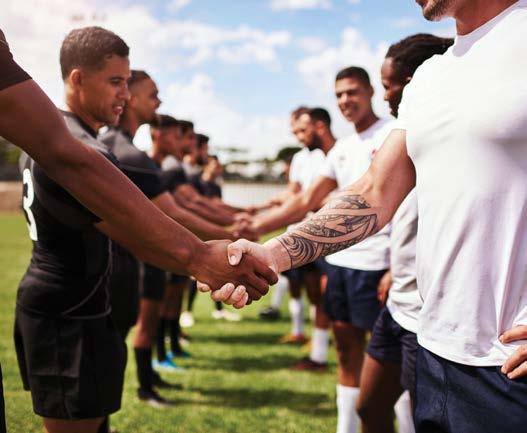
Auckland Rugby | Handbook 2024 82
New Experimental Domestic Safety Law
Variations (EDLSVs) & World Rugby Changes 2024
Small Blacks
Tackle
Trial: All tackles must target, and initially contact below the sternum. i.e., “the tummy” or below – Sanction PK
If a second tackler arrives, this player will be subject to the standard high tackle rugby law (no higher than the shoulder line of the ball carrier) – Sanction PK
If two or more tacklers arrive at the same time, at least one must target, and initially contact below the sternum i.e., “the tummy” or below, whilst the other/s will be subject to the existing high tackle rugby law (no higher than the shoulder line of the ball carrier) – Sanction PK
Why: The lowering of the tackle height is intended to reduce the incidence of injuries in the tackle.
Community rugby participants have told New Zealand Rugby they want improvements made to the tackle. Feedback from community grades trialling the reduced tackle height in the 2022 season found that 78% of participants believed it improved the tackler’s safety, 72% thought there were more opportunities for offloads and 73% felt it made the game faster.
Potential Benefits: Improved safety for both the tackled player and tackler, greater confidence when taking contact for tacklers and tackled players, more effective tackle technique, more opportunity for the defensive side to contest for the ball after the tackle has been made.
More offloads in the tackle and, consequently, a faster game
Who: All Small Blacks grades that tackle.
Teenage
Tackle
Trial: All tackles must target, and initially contact below the sternum. i.e., “the tummy” or below – Sanction PK
If a second tackler arrives, this player will be subject to the standard high tackle rugby law (no higher than the shoulder line of the ball carrier) – Sanction PK
If two or more tacklers arrive at the same time, at least one must target and initially contact below the sternum i.e., “the tummy” or below, whilst the other/s will be subject to the existing high tackle rugby law (no higher than the shoulder line of the ball carrier) – Sanction PK.
www.aucklandrugby.co.nz 83
New Experimental Domestic Safety Law
Variations (EDLSVs) & World Rugby Changes 2024
Why: The lowering of the tackle height is intended to reduce the incidence of injuries in the tackle.
Community rugby participants have told New Zealand Rugby they want improvements made to the tackle. Feedback from community grades trialling the reduced tackle height in the 2022 season found that 78% of participants believed it improved the tackler’s safety, 72% thought there were more opportunities for offloads and 73% felt it made the game faster.
Potential Benefits: Improved safety for both tackled player and tackler, greater confidence when taking contact for tacklers and tackled players, more effective tackle technique, more opportunity for the defensive side to contest for the ball after the tackle has been made.
More offloads in the tackle and, consequently, a faster game
Who: All secondary school and teenage rugby grades.
Offside at Scrum
Trial: If the halfback of the team not in possession of the ball at a scrum opts to stay in a position at the tunnel, they must remain within 1m of the scrum and may not advance past the tunnel until the scrum has ended – Sanction PK
Why: Promote positive play
Potential Benefits: Provides faster and cleaner ball, without disruption and allows No. 8 and 9 moves to take place more freely
Who: All grades of secondary school/teenage rugby
Senior/Club
Tackle
Trial: All tackles must target, and initially contact below the sternum. i.e., “the tummy” or below – Sanction PK
If a second tackler arrives, this player will be subject to the standard high tackle rugby law (no higher than the shoulder line of the ball carrier) – Sanction PK
If two or more tacklers arrive at the same time, at least one must target and initially contact below the sternum i.e., “the tummy” or below, whilst the other/s will be subject to the existing high tackle rugby law (no higher than the shoulder line of the ball carrier) – Sanction PK.
Auckland Rugby | Handbook 2024 84
Why: The lowering of the tackle height is intended to reduce the incidence of injuries in the tackle.
Community rugby participants have told New Zealand Rugby they want improvements made to the tackle. Feedback from community grades trialling the reduced tackle height in the 2022 season found that 78% of participants believed it improved the tackler’s safety, 72% thought there were more opportunities for offloads and 73% felt it made the game faster.
Potential Benefits: Improved safety for both tackled player and tackler, greater confidence when taking contact for tacklers and tackled players, more effective tackle technique, more opportunity for the defensive side to contest for the ball after the tackle has been made.
More offloads in the tackle and, consequently, a faster game
Who: All senior/club grades.
Offside at Scrum
Trial: If the halfback of the team not in possession of the ball at a scrum opts to stay in a position at the tunnel, they must remain within 1m of the scrum and may not advance past the tunnel until the scrum has ended – Sanction PK
Why: Promote positive play
Potential Benefits: Provides faster and cleaner ball without disruption and allows No. 8 and 9 moves to take place more freely.
Who: All grades of senior/club rugby.
Scrum 1.5m Push
Trial: 1.5m maximum push unless within 5m of the goal line – Sanction FK
Why: Improve scrum stability and reduce the frequency of resets.
Potential Benefits: Reduced risk of scrum injuries, reduced ability to scrum for penalties, and increased ball in-play time.
Who: All designated adult non-premier rugby
www.aucklandrugby.co.nz 85
New Experimental Domestic Safety Law Variations (EDLSVs) & World Rugby Changes 2024
20-Minute Red Card
1. Reduced tackle height to below the sternum targeting the belly area for all community rugby grades
The first tackler must tackle below the sternum and target the belly area. The second tackler can legally tackle below the shoulders in accordance with current rugby law.
2. Defensive halfback offside at scrum for all community rugby grades
The halfback of the team not in possession must remain 1 metre from the scrum and may not advance past the tunnel until the scrum has ended.
3. Maximum 1.5 metre scrum push for all community rugby, excluding senior premier club rugby grades
The maximum push of any scrum is limited to 1.5 metres, unless the scrum is within 5 metres of the goal line. Please note: Small Blacks rugby at U12 and U13s is already limited to a maximum 0.5 metre scrum push and teenage rugby is limited to a maximum 1.5 metre scrum push irrespective of location on the field.
4. Red card replacement
If a player receives a Red Card, they may be replaced after 20 minutes by another player.
Supplementary Notes on the Tackle:
Note 1: WR high tackle process applies. (Also see Note 3.)
Note 2: All players attempting to make a tackle must attempt to grasp the tackled player i.e., use the arms to “wrap” and grasp the player while making the tackle.
Note 3: Where the ball carrier lowers their torso into the tackler and foreshortens the tackle zone available to a front-on tackler, the ball carrier is deemed to have significantly lowered their body height. The requirement on the tackler is to ensure there is no contact with the neck or head of the tackled player.
Auckland Rugby | Handbook 2024 86
Senior Trophies
Grade Competition Cup Name 2023
Premier Pre-season Top 8 Waka Nathan N/A
Premier Pre-season Bottom 8 Pollard Cup N/A
Premier Challenge Cup Sir Fred Allen Manukau
Premier Top 8 Round Robin Alan McEvoy Memorial Shield Manukau
Premier Championship Gallaher Shield Manukau
Premier 5th Jubilee Trophy Papatoetoe
Premier 9th Portola Trophy Waitemata
Premier 13th Presidents Cup N/A
Development Challenge Cup Lawrie Knight Manukau
Development Top 8 Round Robin Tramways Memorial Cup Waitemata
Development Championship George Nicholson Trophy Waitemata
Development Bottom Section winner Peter Fatialofa Memorial Puketapapa
U21 Challenge Cup Sir Wilson Whineray Pakuranga
U21/U20 Round Robin Whetton Brothers Trophy Pakuranga
U21 Championship Arthur Bayliss Cup Pakuranga
U21/U20 Plate Stan Foster Memorial Waitemata
First Grade Challenge Cup Bryan Williams N/A
First Grade Championship Reuben O’Neil Cup Otahuhu
First Grade Plate Peter Hall Cup Eden
U85 ChampionshipChallenge Cup Speights Shield Grammar TEC
U85 Championship
Maurice O Connor Cup & Speights Cup Ponsonby Hustlers
U85 Plate Speights Plate Ponsonby
Womens Premier Coleman Shield Ponsonby
Womens Premier Reserves 15s
Women’s Premier Reserves Cup N/A
Womens 10s Richards-Martin Shield Grammar TEC
Men’s 7s Championship Supporters Club Trophy University
Women’s 7s Championship Womens 7s Cup Marist OB
U21’s 7s Championship U21s 7s Cup Marist OB
www.aucklandrugby.co.nz 87
Information For Senior Grades
AGE TO PLAY SENIOR RUGBY
• As per NZ Rugby Community Policies, players must be 16 years old as of their first match to play any senior rugby grade
• All players under 18 must receive signed parent/guardian consent in order to play
GAME TEAM SHEETS AND SCORING
• Team lists must be submitted into the MyRugby Manager app for every game prior to kick off. It is recommended this is submitted at least 10 minutes prior to kick off.
• The entry of a player’s name upon the Official Team List as a player or as a substitute deems the player or substitute to have taken part in the match
• Once you have submitted your team list you may begin scoring through the MyRugby Manager app. It is recommended you log points throughout the game.
• At the end of the game, submit the final score via MyRugby Manager app. It is recommended that you confirm the match details (score, disciplinary etc.) with the referee and opposition prior to submitting.
CHANGE OF FIXTURES
• If a Club wishes to change the scheduled venue, time or date of a match, they must complete the Match Schedule Change Request Form and submit to sophie.booth@ aucklandrugby.co.nz 48 hours prior to the proposed change.
REFEREES
• Any team refusing to play under the appointed referee is deemed to have lost the match
• As per World Rugby Law the referee must not start a match if they consider any part of the ground to be dangerous. If the referee does not allow a match to start – the result of the match will be referred to the Technical Committee for decision
• As per World Rugby Law the referee has the power to end the match at any time, if the referee believes that play should not continue because it would be dangerous
• If the referee ends the match during the game prior to half time, regardless of the score at the time, the result of the match will be referred to the Technical Committee for decision.
• If the referee ends the match during or after half time, the result at the times of the game ending will stand
SERIOUS INJURIES
• Any head or neck injury that requires the player to be transported directly from the ground to an emergency department, hospital or after hours medical centre
• Any Concussion – Refer to Blue Card Protocols
• Any injury that results in the admission of a player into hospital after a game
• Any injury that is expected to prevent a player from playing for a period of 8 weeks or longer
• Serious Injury Report to be completed by medical person or team Manager then given to club H & S officer to be loaded into Risk Manager within 48 hrs
Auckland Rugby | Handbook 2024 88
RUGBYSMART
• All coaches and assistant coaches who are involved with teams from Secondary School Rugby upwards (Under 14 and above) are required to attend a RugbySmart Coaching Workshop every season. NZRU Policy makes this course compulsory.
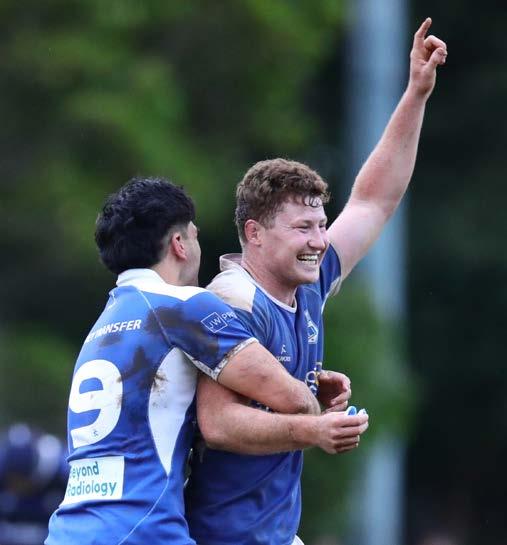
www.aucklandrugby.co.nz 89
International Clearances
This is a World Rugby regulation & applies to all member countries of World Rugby
A clearance is required if you wish to play rugby overseas in a country other than your own & also needs to be completed for returning to play in NZ.
Note: All Clearances should be completed prior to departure to avoid delays as they can take up to 10 days to process.
OUTBOUND CLEARANCE
(From NZ to another country)
OUTBOUND CLEARANCE
(From NZ to another country)
INBOUND CLEARANCE
(From another country to NZ)
INBOUND CLEARANCE
(From another country to NZ)
Player to complete & sign a World Rugby clearance form available at http://www. aucklandrugby.co.nz/senior/forms-documents-3
Completed & signed form sent to sophie.booth@aucklandrugby.co.nz
Auckland Rugby check for issues, notify current club, sign off on release, & send to NZ Rugby.
New National Union sign & forward to new provincial union & inform new club of clearance.
Player to complete & sign a World Rugby Clearance form at their overseas club
Overseas club to sign form & send to their provincial union
Overseas Provincial Union check for issues, sign off on release, & send to NZ Rugby.
NZ Rugby sign off & send to players new National Union
Auckland Rugby notify Club
Auckland Rugby | Handbook 2024 90

www.aucklandrugby.co.nz 91
Junior Rugby In Auckland
Welcome to Auckland Junior Rugby for the 2024 season!
Thank you for taking up the challenge of coaching and/or managing – for many of you this is one in a few years of involvement, for others the first of hopefully many.
The purpose of this booklet is to give you all the information you need to navigate your way through the season.
JUNIOR RUGBY IN AUCKLAND
Auckland Rugby is committed to growing and innovating in our community game through a wide range of vibrant community hubs. These community hubs (Clubs) facilitate the game to over 5000 junior players across 21 junior clubs. An offering of this size is only made possible by the hard work and dedication of all our clubs, and most importantly the many volunteers like yourself.
It is important that we as coaches, parents, administrators, managers, supporters all come together to focus on what our great game has to offer. Collectively we all make up Auckland Rugby and we cannot wait to see all our players running around enjoying those cold winter mornings.
From all the Auckland Rugby Staff, we wish you all a fun and enjoyable season.
JUNIOR RUGBY COUNCIL
Junior club rugby in Auckland is governed by the Junior Rugby Council (JRC), a subcommittee of the Council of Delegates.
The committee is made up of four members from affiliated Clubs: appointed by the COD Appointments Committee. Two independent members nominated by the Chair of the JRC and appointed by the COD Appointments Committee. One member nominated by each of the following affiliated bodies, such member to be elected by the Member’s own Association, Union or Board: The Auckland Rugby Referees Association; The Auckland Primary Schools Rugby Union. The COD ratifies the appointment of all members to this council on a ‘when needed’ basis.
The JRC works with Auckland Rugby to ensure that the game is administered appropriately so that all participants have an enjoyable safe and well-organised rugby experience. The JRC’s main purpose is to coordinate the efforts of junior clubs that cater for players in the 5yr to 8yr age groups across the Auckland region. Matters relating to development, coaching, compliance, team formats, playing opportunities and safety are but some of the areas that the JRC oversees.
Each club is represented by a delegate that plays a pivotal role in terms of communications between your club and Auckland Rugby. Delegates also communicate on a club-to-club basis for any matter that can be resolved on that basis. If you are unsure of anything, please do
Auckland Rugby | Handbook 2024 92
not hesitate to contact your club delegate. The Delegate is the club’s representative and all communications from junior club personnel should be channeled through him or her. The Delegate would represent the club’s interests in terms of player welfare, conflict management, standards and at certain times, Judiciary.
Junior Rugby Rules & Guidelines
COACHING CODE OF CONDUCT
Verbal or physical harassment of any kind towards match officials will result in the stoppage of play and/or person(s) evicted from grounds. Official complaints will result in an appearance with the Auckland Rugby Union Judicial Committee
Coaches Code of Conduct
• Be a leader – you have the biggest influence in relation to your players and supporter’s attitudes towards the referee and the opposition.
• Ensure your philosophy matches that of your players - fun and development are the foundation for them playing the game
• Be reasonable on the demand on player’s time, energy and enthusiasm
• Teach your team to play within the rules of the game
• Ensure all equipment and facilities meet safety standards and that you use drills and training methods that are both safe and effective for your player’s needs.
• Positively reinforce the actions of players.
• Give all players the opportunity to participate in the game.
• Insist on sportsmanship, fair play and discipline.
REFEREES
Becoming a Referee
Refereeing is fun and rewarding and without referees we would not have a game. Clubs are encouraged to have a qualified Junior Club Referee associated with each of their teams. Auckland Rugby provides full training, specific to each grade, for all of those interested in becoming a qualified Junior Club Referee.
Appointment of Referees
Where possible, the Auckland Referees Association will appoint an official referee for games, however as this process usually only extends down to the top few Junior Grades, the home club must provide a currently qualified Junior Club Referee. Where the home club cannot provide one, a qualified referee from the visiting team can be used.
For consistency, it is recommended that the same person referee the entire game. Games cannot progress without a qualified Junior Club (Associate) Referee.
www.aucklandrugby.co.nz 93
Junior Rugby In Auckland
Guidelines for Refereeing Junior Rugby
• Referees must have attended a current Small Blacks course or Junior Club (associate) Referee course.
• Referees need to attain a full understanding of the rules for the grade they are refereeing
• Appoint a person to be a touch judge, preferably not the team coach
• Blow the whistle with authority, use hand signals then give verbal explanations
• In set play, take time to make sure both backs and forwards are correctly in position.
• Ensure scrums are set in accordance with scrum safety procedures.
• Apply the advantage law as often as possible
• Apply penalties for penalty offences and try to keep scrums to a minimum
• Do not allow high tackles – High tackles are above the nipple line. Penalise immediately
• Explain decisions clearly, players will look to you for guidance, instructing offending players as to what they have done wrong.
• Referees must stop play if they think a player’s safety is at risk and discuss the situation with the coaches of both teams.
• Stop play immediately for over aggressive play, dangerous play, fighting or back chat.
• Stop play for injuries to players.
• Where appropriate use the sin bin in preference to sending off. Players can be forced to substitute for disciplinary measures.
• Do not hesitate to stop play for verbal or physical harassment from coaches, parents or spectators. Referees have the ability to evict unwanted persons from grounds under their control or report incidents to Junior Club Committees or Auckland Rugby.
Referee Code of Conduct
• Use common sense to ensure that the “spirit of the game” for children is not lost by “over refereeing” the game.
• Ensure that both on and off the field, your behaviour is consistent with the principles of good sportsmanship.
• Compliment both teams on their good play, whenever such praise is deserved.
• Be consistent, objective and courteous.
• Condemn the “deliberate foul” as being unsportsmanlike, thus retaining respect for fair play.
• Be a good communicator.
• Be unobtrusive, but exercise firmness.
• Be calm when player/spectator passions are high.
COMPLAINTS
Things don’t always go to plan, so whether you’re a coach, referee, or supporter it’s important that you know what to do regarding any inappropriate conduct or behaviour. All complaints should be directed to your club Junior Delegate who will work with the other club delegates and Auckland Rugby Union to resolve the issue and where necessary complaints will result in an appearance with The Auckland Rugby Union Judicial Committee.
Auckland Rugby | Handbook 2024 94
A complaint shall contain the following information:
(a) A date and place or the incident
(b) The name of the person(s) involved the club and team they were involved with
(c) Name of the opposing team
(d) Full details of the incident
RULES FOR ALL GRADES
Auckland Junior Rugby is played in accordance with World Rugby & NZRU “Laws of the Game” incorporating the Small Blacks Development Model guidelines.
Regular Saturday Junior Club Rugby is run in a non-competition format, meaning that while individuals, teams and clubs may record tries, conversions, wins and losses, the Union only collects scores for grading purposes and to mitigate score blowouts.
Players and coaches should strive to win; however, it is the responsibility of coaches, referees, parents and supporters to assist all players in developing the fundamental skills required to play the game safely, with enjoyment and in accordance with the Laws of the Game.
All Junior Club Rugby grades are to play under Game On rules when required.
Individual Player Registration
• All players must be registered and weighed each year
• All new players must provide a copy of their birth certificate to the club at the time of registration. Clubs must maintain a copy of the certificate for their records and ensure that all new players have complied with this requirement before allowing players onto the field of play.
Team Registration
Once all players are registered, for a team to be entered in the weekly draw the following conditions must be met:
• Teams must have the minimum number of players required for that grade
• All teams must complete an ARU Junior team Sheet created through SPORTY with players weights confirmed by an ARU representative
Team Composition
• Players must be placed in their grade as per their eligibility on the Junior Grades Chart set for the season.
• Selection of teams based on merit or ability within grades is not permitted. Where Clubs have more than one team in a grade, Club Committees are to ensure teams are balanced and players new to rugby should be evenly distributed.
• Teams must start play with an equal number of players on the field.
• As per the NZRU Small Blacks Development model – all players must play at minimum of half a game each week.
www.aucklandrugby.co.nz 95
Junior Rugby In Auckland
Score Blowouts
• In accordance with the Small Blacks Development Model guidelines, in the event that scores become one sided (defined by a halftime score differential of 35+ points), both coaches must meet at half time and come to agreement as to how the issue can be addressed to create a more even contest. (E.g., change dominant player positions, change dominant team tactics, rotate players, swap players between teams)
Trainings
• As young players are often involved in a number of sports and at times multiple rugby teams, Auckland Rugby recommends a maximum of two trainings of one-hour duration per week across all rugby teams.
Safety
Rugby Union is a sport which involves physical contact and any sport involving physical contact has inherent dangers. It is important that players can enjoy the game and play in the spirit with which the game is intended.
• All players in all grades (including RIPPA and RIP grades) must wear mouthguards
• Should a player be injured, play must be stopped immediately, and the player attended to.
• Players on the field who are injured in any way that results in bleeding must be immediately removed. A substitute can be played while they are being attended to –blood nose, etc. Jerseys should be changed, and the injury attended to and cleaned properly.
• Open cuts or wounds must have a protective cover over them while the player is on the field
• Players who receive slight head injuries must be checked properly – if in doubt remove the player from the field.
• Should a player suffer a concussion he/she must follow the ‘graduated return to play’ protocols outlined by ACC in the Small Blacks and Rugby Smart courses (note minimum 21 day stand down for the player).
• Coaches and parents must not put the player’s health at risk in any game.
• It is advisable for players of all grades to warm up before the start of a game.
Serious Injuries & Reporting
A Serious injury is defined as a situation in which the player/s involved require further medical treatment and are admitted to an A&E or hospital. In the event of a serious injury to one of your junior players the following steps must be taken:
1. The coach or manager must notify the club of the situation and give details of the player/s e.g. name, DOB, contact number.
2. Club administrator to load the serious injury into Risk Manager. (Coaches/Managers will need to identify who this person is. Please ask JRC delegate)
3. ARU to follow up injury and follow return to play procedure.
Auckland Rugby | Handbook 2024 96
Game On
Flexible rugby rules, less defaults, and more rugby for all grades.
With Game On, rugby can still kick off. If you do not have the correct number of players or feel safe pushing in a scrum, then teams can choose to play under Game On. Game On is a NZR initiative that has been designed around flexible rugby rules, less defaults, and more rugby. Auckland Rugby has adopted this philosophy and encourages all junior clubs to work together to reduce defaults.
Team Size
If teams do not have the correct number of players the match can still go ahead, simply even up the team numbers and play with reduced numbers. Teams will agree to match numbers. In the event of no agreement, the decision defers to the team with the smallest number of players.
Coaches/Managers can work together to ensure all players still get a game.
Contested or uncontested scrums
If teams do not feel safe to push in a scrum, scrums can be uncontested. Coaches/Managers can work together to ensure all players still get a game. Be sure to communicate this with each other and the referee.
Match length
The match length can be flexible and can be anywhere between 30 and 60 minutes if game times do not exceed maximum playing time for your grade.
Communication
To make sure everything runs smoothly the referee and team management will meet before kick-off to confirm the Game On process. Team management are also encouraged to communicate with each other as early as possible in the days leading up to the match.
www.aucklandrugby.co.nz 97
Guide To Rippa Rugby
Rippa Rugby is the non-contact version of rugby. It is designed to introduced players to the game without fear of contact so that they can learn the fundamental rugby skills of running, passing, catching, evasion and scoring tries.
These rules have been fully described to enable new players, coaches, referees and parents to gain a better understanding of the game.
The object of the game is to score a try by grounding the ball behing or on the opponents try line. To prevent a try being scored the defenders must ‘rip’ the flag from the belt of the ball carrier. This forces the ball carrier to pass the ball. Siz rips against the attacking team in one set of possession results in the ball being turned over to the defending team.
Field / Game Time
• Boys U6/U7 – Field size will be ¼ Field (Goal line to 10m line, long x closest goalpost to the sideline, wide)
• Girls U9 – Field size will be ½ Field (Touch line to Touch line , long x Goal line to 10m line, wide)
• 20 minutes each way with a 2 minute break at halftime. (Maximums)
Ball
• U6 & U7 - Size 2 ½, Girls U9 – Size 3
Mouthguard
• Compulsory for all players
Players
• Teams comprise seven players
• For normal Saturday games it is expected that all players should play as much as possible, therefore teams numbers can be manipulated at the agreement of both coaches.
Coaches
• Coaches are allowed on the field of play up to Under 8s to teach players general and positional play.
Starting/Restarting play
• Free pass - To make a free pass, the referee calls “Play” and the player passes the ball backwards to a member of their own team. The opposition team must remain five metres back from the free pass.
Attackers
• The ball carrier cannot fend or barge defenders in any manner to stop them from ripping their tags
• The ball carrier cannot hide or shield their tags from the defenders
• After being ripped, the ball carrier must pass the ball within three steps. They do not have to stop, return to the mark or tap the ball before passing.
• The attacker must then regain their flag from the defender before they rejoin play
Auckland Rugby | Handbook 2024 98
• The belt must be worn outside the clothing and flags positioned one on each hip.
• Six rips in a row leads to a turnover in possession.
Defenders
• To complete a ‘rip’ one of the two flags from the ball carriers belt must be removed.
• Only the ball carrier can be ripped
• The defender must stop, holds the flag above their head and shout “RIP!”
• After the ball carrier has passed the ball the ripper must hand the flag back to the player who then reattaches it to their belt before they rejoin play.
• Six rips in a row leads to a turnover in possession.
• If a player is ‘ripped’ when crossing the try line, they restart play five metres out from the try line.
Passing
• The game has been designed to encourage passing. The ball can only be passed in a sideways or backwards direction. There are no forward passes. If the ball is passed sideways or backwards landing on the ground and bounces forward, this is not a knock on or forward pass. Either team may re-gather the ball remaining on their feet to continue play.
Kicking, Scums & Lineouts
• There is no kicking, scrums, or lineouts in Rippa. A knock-on, forward pass, the ball or ball carrier going out results in a free pass to the opposition.
Offside
• Offside only occurs at the rip.
• When a rip is made, all players from the ripper’s team must get back until they are in front of where ball is being passed from (facing the opposition).
• If a player is offside and they intercept, prevent or slow down a pass, a free pass will be awarded to the non-offending team.
Refereeing a Game
• Shout, “RIP and the number of rip (1, 2, 3, 4, 5, 6) and PASS!” when a rip has been made.
• Where possible ‘advantage’ should be played to the non-offending team if there is any chance that they may get the ball. The referee should call ‘advantage’ followed by ‘play on’. If no advantage occurs play restarts with a free pass.
• Stand behind the defending team.
Penalties
• Given the age and ability of the players, penalties should be kept to a minimum with a focus on reinforcing the rules without penalty, but where ongoing infringing occurs, penalty offences are:
• Kicking, contact of any kind (pushing, tackling, fending), Hiding or shielding Rippa tags, Offside, Diving on the ball on the ground, Not handing back Rippa tags, Continuing to run after rip (more than 3 steps)
www.aucklandrugby.co.nz 99
U6 Rippa Rugby
These rules have been condensed to enable coaches, referees and parents to gain a better understanding of the game.
FIELD: ¼ Field (goal line to 10m line, long x goalpost to 5m line, wide) 40mx 27.5m max
GAME LENGTH: 20 minutes each way with a 2-minute break at halftime (maximum).
BALL: Size 2 ½.
MOUTHGUARD: Compulsory for all players.
RIP BELTS/RIPS: Rip belts must be worn on the outside of clothing and the Rips on each hip.
PLAYERS: Teams comprise seven players.
COACHES: Coaches are allowed on the field of play up to teach players general and positional play.
STARTING/RESTARTING PLAY: Free pass - To make a free pass, the referee calls “Play” and the player passes the ball backwards to a member of their own team. The opposition team must remain five metres back from the free pass.
ATTACKERS:
• The ball carrier cannot fend or barge defenders in any manner to stop them from ripping their Rips
• The ball carrier cannot hide or shield their Rips from the defenders
• After being ripped, the ball carrier must pass the ball within three steps. If they pass after the three steps post Rip, then it is a turnover. If the player oversteps the three step mark post rip and returns to the mark to pass the ball then it’s play on.
• The attacker must then regain their Rip from the defender before they re-join play
• Six rips in a row leads to a turnover in possession.
DEFENDERS
• To complete a ‘rip’ one of the two Rips from the ball carrier belt must be removed.
• The defender must stop, holds the flag above their head and shout “RIP!”
• After the ball carrier has passed the ball, the ripper must hand the Rip back to the player
• Six rips in a row leads to a turnover.
• If a player is ‘ripped’ when crossing the try line, they restart play five metres out from the try line.
PASSING: The ball can only be passed in a sideways or backwards direction. There are no forward passes.
KICKING, SCRUMS & LINEOUTS: There is no kicking, scrums or lineouts in Rippa.
Auckland Rugby | Handbook 2024 100
OFFSIDE:
• Offside only occurs at the rip.
• When a rip is made, all players from the ripper’s team must get back until they are in front of where ball is being passed from
• If a player is offside and they intercept, prevent or slow down a pass, a free pass will be awarded to the non-offending team.
REFEREEING A GAME:
• Shout, “RIP and the number of rip (1, 2, 3, 4, 5, 6) and PASS!” when a rip has been made.
• Where possible ‘advantage’ should be played to the non-offending team if there is any chance that they may get the ball. The referee should call ‘advantage’ followed by ‘play on’.
• Stand behind the defending team.
PENALTIES: Penalties should be kept to a minimum with a focus on reinforcing the rules without penalty, but where ongoing infringing occurs, penalty offences are:
• Kicking
• Contact of any kind (pushing, tackling, fending),
• Hiding or shielding Rips
• Offside
• Diving on the ball on the ground
• Not handing back Rips
• Continuing to run after rip (more than 3 steps).
www.aucklandrugby.co.nz 101
U7 Rippa Rugby
These rules have been condensed to enable coaches, referees and parents to gain a better understanding of the game.
FIELD: ¼ Field (goal line to 10m line, long x goalpost to 5m line, wide) 40mx 27.5m max
GAME LENGTH: 20 minutes each way with a 2-minute break at halftime (maximum).
BALL: Size 2 ½.
MOUTHGUARD: Compulsory for all players.
RIP BELTS/RIPS: Rip belts must be worn on the outside of clothing and the Rips on each hip.
PLAYERS: Teams comprise seven players.
COACHES: Coaches are allowed on the field of play up to teach players general and positional play.
STARTING/RESTARTING PLAY: Free pass - To make a free pass, the referee calls “Play” and the player passes the ball backwards to a member of their own team. The opposition team must remain five metres back from the free pass.
ATTACKERS:
• The ball carrier cannot fend or barge defenders in any manner to stop them from ripping their Rips
• The ball carrier cannot hide or shield their Rips from the defenders
• After being ripped, the ball carrier must pass the ball within three steps. If they pass after the three steps post Rip, then it is a turnover. If the player oversteps the three step mark post rip and returns to the mark to pass the ball then it’s play on.
• The attacker must then regain their Rip from the defender before they re-join play
• Six rips in a row leads to a turnover in possession.
DEFENDERS
• To complete a ‘rip’ one of the two Rips from the ball carrier belt must be removed.
• The defender must stop, holds the flag above their head and shout “RIP!”
• After the ball carrier has passed the ball, the ripper must hand the Rip back to the player
• Six rips in a row leads to a turnover.
• If a player is ‘ripped’ when crossing the try line, they restart play five metres out from the try line.
PASSING: The ball can only be passed in a sideways or backwards direction. There are no forward passes.
KICKING, SCRUMS & LINEOUTS: There is no kicking, scrums or lineouts in Rippa.
Auckland Rugby | Handbook 2024 102
OFFSIDE:
• Offside only occurs at the rip.
• When a rip is made, all players from the ripper’s team must get back until they are in front of where ball is being passed from
• If a player is offside and they intercept, prevent or slow down a pass, a free pass will be awarded to the non-offending team.
REFEREEING A GAME:
• Shout, “RIP and the number of rip (1, 2, 3, 4, 5, 6) and PASS!” when a rip has been made.
• Where possible ‘advantage’ should be played to the non-offending team if there is any chance that they may get the ball. The referee should call ‘advantage’ followed by ‘play on’.
• Stand behind the defending team.
PENALTIES: Penalties should be kept to a minimum with a focus on reinforcing the rules without penalty, but where ongoing infringing occurs, penalty offences are:
• Kicking
• Contact of any kind (pushing, tackling, fending),
• Hiding or shielding Rips
• Offside
• Diving on the ball on the ground
• Not handing back Rips
• Continuing to run after rip (more than 3 steps).
www.aucklandrugby.co.nz 103
U9 Rippa Rugby
These rules have been condensed to enable coaches, referees and parents to gain a better understanding of the game.
FIELD: ½ Field (touch line to touch line, long x goal line to 10m line, wide)
GAME LENGTH: 20 minutes each way with a 2-minute break at halftime (maximum).
BALL: Size 3
MOUTHGUARD: Compulsory for all players.
RIP BELTS/RIPS: Rip belts must be worn on the outside of clothing and the Rips on each hip.
PLAYERS: Teams comprise seven players.
COACHES: Coaches are allowed on the field of play up to teach players general and positional play.
STARTING/RESTARTING PLAY: Free pass - To make a free pass, the referee calls “Play” and the player passes the ball backwards to a member of their own team. The opposition team must remain five metres back from the free pass.
ATTACKERS:
• The ball carrier cannot fend or barge defenders in any manner to stop them from ripping their Rips
• The ball carrier cannot hide or shield their Rips from the defenders
• After being ripped, the ball carrier must pass the ball within three steps. If they pass after the three steps post Rip, then it is a turnover. If the player oversteps the three step mark post rip and returns to the mark to pass the ball then it’s play on.
• The attacker must then regain their Rip from the defender before they re-join play
• Six rips in a row leads to a turnover in possession.
DEFENDERS:
• To complete a ‘rip’ one of the two Rips from the ball carrier belt must be removed.
• The defender must stop, holds the flag above their head and shout “RIP!”
• After the ball carrier has passed the ball, the ripper must hand the Rip back to the player
• Six rips in a row leads to a turnover.
• If a player is ‘ripped’ when crossing the try line, they restart play five metres out from the try line.
PASSING: The ball can only be passed in a sideways or backwards direction. There are no forward passes.
KICKING, SCRUMS & LINEOUTS: There is no kicking, scrums or lineouts in Rippa.
Auckland Rugby | Handbook 2024 104
OFFSIDE:
• Offside only occurs at the rip.
• When a rip is made, all players from the ripper’s team must get back until they are in front of where ball is being passed from
• If a player is offside and they intercept, prevent or slow down a pass, a free pass will be awarded to the non-offending team.
REFEREEING A GAME:
• Shout, “RIP and the number of rip (1, 2, 3, 4, 5, 6) and PASS!” when a rip has been made.
• Where possible ‘advantage’ should be played to the non-offending team if there is any chance that they may get the ball. The referee should call ‘advantage’ followed by ‘play on’.
• Stand behind the defending team.
PENALTIES: Penalties should be kept to a minimum with a focus on reinforcing the rules without penalty, but where ongoing infringing occurs, penalty offences are:
• Kicking
• Contact of any kind (pushing, tackling, fending),
• Hiding or shielding Rips
• Offside
• Diving on the ball on the ground
• Not handing back Rips
• Continuing to run after rip (more than 3 steps).
www.aucklandrugby.co.nz 105
U11 Rippa Rugby
These rules have been condensed to enable coaches, referees and parents to gain a better understanding of the game.
FIELD: ½ Field (touch line to touch line, long x goal line to 10m line, wide)
GAME LENGTH: 20 minutes each way with a 5 -minute break at halftime (maximum).
BALL: Size 3
MOUTHGUARD: Compulsory for all players.
RIP BELTS/RIPS: Rip belts must be worn on the outside of clothing and the Rips on each hip.
PLAYERS: Teams comprise seven players.
COACHES: Coaches are allowed on the field of play up to teach players general and positional play.
STARTING/RESTARTING PLAY: Punt kick for start and restarting play after a try or half time. The kick must travel past the 5m mark. If the kick does not make the 5m mark, a free pass is awarded to the receiving team on half-way. When a try is scored, the team that scores then kicks the restart.
ATTACKERS:
• The ball carrier cannot fend or barge defenders in any manner to stop them from ripping their Rips
• The ball carrier cannot hide or shield their Rips from the defenders
• After being ripped, the ball carrier must pass the ball within three steps. If they pass after the three steps post Rip, then it is a turnover. If the player oversteps the three step mark post rip and returns to the mark to pass the ball then it’s play on.
• The attacker must then regain their Rip from the defender before they re-join play
• Six rips in a row leads to a turnover in possession.
DEFENDERS:
• To complete a ‘rip’ one of the two Rips from the ball carrier belt must be removed.
• The defender must stop, holds the flag above their head and shout “RIP!”
• After the ball carrier has passed the ball, the ripper must hand the Rip back to the player
• Six rips in a row leads to a turnover.
• If a player is ‘ripped’ when crossing the try line, they restart play five metres out from the try line.
PASSING: The ball can only be passed in a sideways or backwards direction. There are no forward passes.
KICKING, SCRUMS & LINEOUTS: There is no kicking, scrums or lineouts in Rippa.
Auckland Rugby | Handbook 2024 106
OFFSIDE:
• Offside only occurs at the rip.
• When a rip is made, all players from the ripper’s team must get back until they are in front of where ball is being passed from
• If a player is offside and they intercept, prevent or slow down a pass, a free pass will be awarded to the non-offending team.
REFEREEING A GAME:
• Shout, “RIP and the number of rip (1, 2, 3, 4, 5, 6) and PASS!” when a rip has been made.
• Where possible ‘advantage’ should be played to the non-offending team if there is any chance that they may get the ball. The referee should call ‘advantage’ followed by ‘play on’.
• Stand behind the defending team.
PENALTIES: Penalties should be kept to a minimum with a focus on reinforcing the rules without penalty, but where ongoing infringing occurs, penalty offences are:
• Kicking
• Contact of any kind (pushing, tackling, fending),
• Hiding or shielding Rips
• Offside
• Diving on the ball on the ground
• Not handing back Rips
• Continuing to run after rip (more than 3 steps).
www.aucklandrugby.co.nz 107
U13 Rip Rugby
These rules have been condensed to enable coaches, referees and parents to gain a better understanding of the game.
PLAYERS: 7 players per team
MOUTHGUARD: Compulsory
BALL SIZE: 4
FIELD SIZE: 1/2 Field (touch line to touch line long x goal line to 10m line, wide)
LENGTH OF GAME: 2 x 20-minute halves with a 5-minute break at halftime (maximum).
SUBS: Teams to use rolling subs to achieve satisfactory game time for all players
RIP BELTS/RIPS: Rip belts must be worn on the outside of clothing and the Rips on each hip.
COACHES: Coaches are not allowed on the field of play.
STARTING/RESTARTING PLAY: Punt kick or Drop kick for start and restarting play after a try or half time. The kick must travel past the 5m mark. If the kick does not make the 5m mark or goes dead in goal, a free pass is awarded to the receiving team on half-way. When a try is scored, the team that scores then kicks the restart.
ATTACKERS:
• The ball carrier cannot fend or barge defenders in any manner to stop them from ripping their Rips.
• The ball carrier cannot hide or shield their Rips from the defenders.
• After being ripped, the ball carrier must pass the ball within three steps. If they pass after the three steps post Rip, then it is a turnover. If the player oversteps the three step mark post rip and returns to the mark to pass the ball then it’s play on.
• The attacker must then regain their Rip from the defender before they re-join play.
• Four rips in a row leads to a turnover in possession.
DEFENDERS:
• To complete a ‘rip’ one of the two Rips from the ball carrier belt must be removed.
• The defender must stop, holds the flag above their head and shout “RIP!”
• After the ball carrier has passed the ball, the ripper must hand the Rip back to the player.
• Four Rips in a row leads to a turnover.
PASSING: The ball can only be passed in a sideways or backwards direction. There are no forward passes. If the ball is passed sideways or backwards landing on the ground and bounces forward, this is not a knock on or forward pass. Either team may re-gather the ball remaining on their feet to continue play.
Auckland Rugby | Handbook 2024 108
KICKING, SCRUMS & LINEOUTS:
• There are uncontested scrums and lineouts in Rip Rugby. Three players from each team per scrum and lineout.
• Kicking is allowed in Rip Rugby. Normal off-side rules apply. There are no conversions or shots at goal.
OFFSIDE:
• Offside only occurs at the rip.
• When a rip is made, all players from the ripper’s team must get back until they are in front of where ball is being passed from (facing the opposition).
REFEREEING A GAME: Shout, “RIP and the number of rip (1, 2, 3, 4,) and PASS!” when a rip has been made. Where possible ‘advantage’ should be played to the non-offending team if there is any chance that they may get the ball. The referee should call ‘advantage’ followed by ‘play on’. Stand behind the defending team.
PENALTIES: Penalties should be kept to a minimum with a focus on reinforcing the rules without penalty, but where ongoing infringing occurs, penalty offences are:
• Contact of any kind (pushing, tackling, fending).
• Hiding or shielding Rips.
• Offside.
• Diving on the ball on the ground
• Not handing back Rips
• Continuing to run after rip (more than 3 steps).
www.aucklandrugby.co.nz 109
U15 Rip Rugby
These rules have been condensed to enable coaches, referees and parents to gain a better understanding of the game.
PLAYERS: 7 players per team
MOUTHGUARD: Compulsory
BALL SIZE: 4
FIELD SIZE: 1/2 Field (touch line to touch line long x goal line to 10m line, wide)
LENGTH OF GAME: 2 x 20-minute halves with a 5-minute break at halftime (maximum).
SUBS: Teams to use rolling subs to achieve satisfactory game time for all players
RIP BELTS/RIPS: Rip belts must be worn on the outside of clothing and the Rips on each hip.
COACHES: Coaches are not allowed on the field of play.
STARTING/RESTARTING PLAY: Punt kick or Drop kick for start and restarting play after a try or half time. The kick must travel past the 5m mark. If the kick does not make the 5m mark or goes dead in goal, a free pass is awarded to the receiving team on half-way. When a try is scored, the team that scores then kicks the restart.
ATTACKERS:
• The ball carrier cannot fend or barge defenders in any manner to stop them from ripping their Rips.
• The ball carrier cannot hide or shield their Rips from the defenders.
• After being ripped, the ball carrier must pass the ball within three steps. If they pass after the three steps post Rip, then it is a turnover. If the player oversteps the three step mark post rip and returns to the mark to pass the ball then it’s play on.
• The attacker must then regain their Rip from the defender before they re-join play.
• Four rips in a row leads to a turnover in possession.
DEFENDERS:
• To complete a ‘rip’ one of the two Rips from the ball carrier belt must be removed.
• The defender must stop, holds the flag above their head and shout “RIP!”
• After the ball carrier has passed the ball, the ripper must hand the Rip back to the player.
• Four Rips in a row leads to a turnover.
PASSING: The ball can only be passed in a sideways or backwards direction. There are no forward passes. If the ball is passed sideways or backwards landing on the ground and bounces forward, this is not a knock on or forward pass. Either team may re-gather the ball remaining on their feet to continue play.
Auckland Rugby | Handbook 2024 110
KICKING, SCRUMS & LINEOUTS:
• There are uncontested scrums and lineouts in Rip Rugby. Three players from each team per scrum and lineout.
• Kicking is allowed in Rip Rugby. Normal off-side rules apply. There are no conversions or shots at goal.
OFFSIDE:
• Offside only occurs at the rip.
• When a rip is made, all players from the ripper’s team must get back until they are in front of where ball is being passed from (facing the opposition).
REFEREEING A GAME: Shout, “RIP and the number of rip (1, 2, 3, 4,) and PASS!” when a rip has been made. Where possible ‘advantage’ should be played to the non-offending team if there is any chance that they may get the ball. The referee should call ‘advantage’ followed by ‘play on’. Stand behind the defending team.
PENALTIES: Penalties should be kept to a minimum with a focus on reinforcing the rules without penalty, but where ongoing infringing occurs, penalty offences are:
• Contact of any kind (pushing, tackling, fending).
• Hiding or shielding Rips.
• Offside.
• Diving on the ball on the ground
• Not handing back Rips.
• Continuing to run after rip (more than 3 steps).
www.aucklandrugby.co.nz 111
Under 17 Rip Rugby
These rules have been condensed to enable coaches, referees and parents to gain a better understanding of the game.
PLAYERS: 7 players per team
BALL SIZE: 4
FIELD SIZE: ½ Field (touch line to touch line long x goal line to 10m line, wide)
LENGTH OF GAME: 2 x 20-minute halves with a 5-minute break at halftime (maximum).
SUBS: Teams to use rolling subs to achieve satisfactory game time for all players.
MOUTHGUARD: Optional
RIP BELTS/RIPS: Rip belts must be worn on the outside of clothing and the Rips on each hip.
UNIFORM: Teams to wear the same uniform
STARTING/RESTARTING PLAY: Drop kick for start and restarting play after a try or half time. The kick must travel past the 5m mark. If the kick does not make the 5m mark or goes dead in goal, a free pass is awarded to the receiving team on half-way. When a try is scored, the team that scores then kicks the restart. If the ball goes dead from kick off and is not touchedreceiving team get a free pass at half-way.
ATTACKERS:
• The ball carrier cannot fend or barge defenders in any manner to stop them from ripping their Rips.
• The ball carrier cannot hide or shield their Rips from the defenders.
• After being ripped, the ball carrier must pass the ball within three steps. If they pass after the three steps post Rip, then it is a turnover. If the player oversteps the three step mark post rip and returns to the mark to pass the ball then it’s play on.
• The attacker must then regain their Rip from the defender before they re-join play.
• Four rips in a row leads to a turnover in possession.
DEFENDERS:
• To complete a ‘rip’ one of the two Rips from the ball carrier belt must be removed.
• The defender must stop, hold the flag above their head and shout “RIP!”
• After the ball carrier has passed the ball, the ripper must hand the Rip back to the player.
• Four Rips in a row leads to a turnover.
PASSING: The ball can only be passed in a sideways or backwards direction. There are no forward passes. If the ball is passed sideways or backwards landing on the ground and bounces forward, this is not a knock on or forward pass. Either team may re-gather the ball remaining on their feet to continue play.
Auckland Rugby | Handbook 2024 112
KICKING, SCRUMS & LINEOUTS:
• Scrums are uncontested, 3 players each.
• The lineout must consist of three players from each team, plus a thrower who can also play receiver after the ball is thrown in. Lifting is Optional.
• Kicking is allowed in Rip Rugby. Normal off-side rules apply. There are no conversions or shots at goal.
OFFSIDE:
• Offside only occurs at the rip.
• When a rip is made, all players from the ripper’s team must get back until they are in front of where ball is being passed from (facing the opposition).
• If a player is offside and they intercept, prevent, or slow down a pass, a free pass will be awarded to the non-offending team.
REFEREEING A GAME: Shout, “RIP and the number of rip (1, 2, 3, 4,) and PASS!” when a rip has been made. Where possible ‘advantage’ should be played to the non-offending team if there is any chance that they may get the ball. The referee should call ‘advantage’ followed by ‘play on’. If no advantage within a reasonable period, play returns with a scrum, penalty, or free pass.
PENALTIES: Penalties should be kept to a minimum with a focus on reinforcing the rules without penalty, but where ongoing infringing occurs, penalty offences are:
• Contact of any kind (pushing, tackling, fending, collisions).
• Hiding or shielding Rips.
• Offside.
• Diving on the ball on the ground.
• Not handing back Rips.
• Continuing to run after rip (more than 3 steps).
www.aucklandrugby.co.nz 113

Auckland Rugby | Handbook 2024 114
Under 8 Open Rules
COMPETITION PURPOSE: Fun and Enjoyment.
PLAYERS: 7 players per team.
WEIGHT: Open.
AGE: Born April 1, 2016 – March 31, 2017
MOUTHGUARD: Compulsory.
FIELD SIZE: ¼ Field. Goal line to 10metre (Playing down the field) Sidelines are 5 metre line to first post. Goal posts on touchline must have bolsters on them.
BALL SIZE: 3
LENGTH OF GAME: 2x 25 minute halves
COACHING ON THE FIELD: The Coach may assist players by being on the field. The Coach should remain at least 5 metres behind their team. On field Coaches are not permitted to question or influence Referee decisions. The aim of the coach is to help players understand where to be on the field.
SUBS: Teams to use rolling subs in order to achieve satisfactory game time for all players.
SCORING/RESTART: A try is scored by grounding the ball on or over the goal line. The non-scoring team will restart play with a tap from halfway (rotate through all players). The opposing team will be back 5 metres from halfway.
TACKLE: Tackle must be below the sternum, NO fending is allowed. A player must not tackle an opponent whose feet are off the ground. The tackled player must release the ball when either the player or the ball is grounded.
SCRUM AND LINEOUT: There is no scrums or lineouts in U8. A knock-on, forward pass, the ball or ball carrier going out results in a free pass.
BREAKDOWN: There is no breakdown in U8 rugby. Once a player is tackled the tackler must roll away and re-join the defensive line.
MAUL: Players must not join from the side; players must be bound to the maul or behind the last player; players must not collapse a maul.
PENALTY: The defending team will be 5 metres back from the infringement mark. All penalties are tapped on the ground.
KICKING: No kicking allowed. Encourage running & passing.
REFEREE: If no Associate Referee, then no tackling.
SCORE BLOWOUTS: Score blowouts have a detrimental effect on both teams. If the score is 35 plus at halftime both Coaches must meet to find a way they can generate a more even contest.
www.aucklandrugby.co.nz
115
Under 8 Restricted Rules
COMPETITION PURPOSE: Fun and Enjoyment.
PLAYERS: 7 players per team.
WEIGHT: 30kg & under
AGE: Born April 1, 2016 – March 31, 2017
MOUTHGUARD: Compulsory.
FIELD SIZE: ¼ Field. Goal line to 10metre (Playing down the field) Sidelines are 5 metre line to first post. Goal posts on touchline must have bolsters on them.
BALL SIZE: 3
LENGTH OF GAME: 2x 25 minute halves
COACHING ON THE FIELD: The Coach may assist players by being on the field. The Coach should remain at least 5 metres behind their team. On field Coaches are not permitted to question or influence Referee decisions. The aim of the coach is to help players understand where to be on the field.
SUBS: Teams to use rolling subs in order to achieve satisfactory game time for all players.
SCORING/RESTART: A try is scored by grounding the ball on or over the goal line. The nonscoring team will restart play with a tap kick from halfway (rotate through all players). The opposing team will be back 5 metres from halfway.
TACKLE: Tackle must be below the sternum, NO fending is allowed. A player must not tackle an opponent whose feet are off the ground. The tackled player must release the ball when either the player or the ball is grounded.
SCRUM AND LINEOUT: There is no scrums or lineouts in U8. A knock-on, forward pass, the ball or ball carrier going out results in a free pass.
BREAKDOWN: There is no breakdown in U8 rugby. Once a player is tackled the tackler must roll away and re-join the defensive line.
MAUL: Players must not join from the side; players must be bound to the maul or behind the last player; players must not collapse a maul.
PENALTY: The defending team will be 5 metres back from the infringement mark. All penalties are tapped on the ground.
KICKING: No kicking allowed. Encourage running & passing.
REFEREE: If no Associate Referee, then no tackling.
SCORE BLOWOUTS: Score blowouts have a detrimental effect on both teams. If the score is 35 plus at halftime both Coaches must meet to find a way, they can generate a more even contest.
Auckland Rugby | Handbook 2024 116
Under 9 Open Rules
PLAYERS: 10 players per team
MOUTHGUARD: Compulsory
WEIGHT: Open
AGE: Born April 1, 2015 – March 31, 2016
FIELD SIZE: ½ field. 5metre to 10metre (across the field) 5metre to 5metre (Try Lines) Goal posts on touchline must have bolsters on them
BALL SIZE: 3
LENGTH OF GAME: 2x 25 minute halves
COACHING ON THE FIELD: The Coach may assist players by being on the field. The Coach should remain at least 5 metres behind their team.
SUBS: Teams to use rolling subs to achieve satisfactory game time for all players
SCORING/RESTART: A try is scored by grounding the ball on or over the goal line. The nonscoring team will restart play with a tap kick from halfway (rotate through all players). The opposing team will be back 5 metres from halfway.
TACKLE: Tackle must be below the sternum, no fending to the head/face or neck regions. A player must not tackle an opponent whose feet are off the ground. The tackled player must release the ball when either the player or the ball is grounded
SCRUM: 5 person. The side feeding the ball into the scrum wins the ball (no contest, no pushing). The opposing halfback must not advance past the tunnel. The opposing backline must be 5 metres behind the hindmost feet of the scrum and cannot advance until the halfback has played the ball. Scrum ends when: Ball comes out of the scrum or when half back passes the ball (half back cannot run with the ball)
LINEOUT: 5 person. ALL lineouts are not contested. The side throwing the ball into the lineout wins the ball. If the ball is not caught the ball becomes fair game. The two lines of players to be 1 metre apart. Backlines must stand 5 metres back from the centre of the lineout. Players can advance when the receiver (half back) passes the ball, Half Back MUST pass the ball. NO reduced numbers are allowed (ALL forwards to be part of the line out).
RUCK AND MAUL: Players must not join from the side; players must be bound to the maul or behind the last player; players must not collapse a maul.
PENALTY: The defending team will be 5 metres back from the infringement mark. All penalties are tapped on the ground.
KICKING: No kicking allowed. Encourage running & passing.
REFEREE: If no Associate Referee, then no tackling.
SCORE BLOWOUTS: Score blowouts have a detrimental effect on both teams. If the score is 35 plus at halftime both Coaches must meet to find a way they can generate a more even contest.
www.aucklandrugby.co.nz 117
Under 9 Restricted Rules
PLAYERS: 10 players per team
MOUTHGUARD: Compulsory
WEIGHT: 35kg & under
AGE: Born April 1, 2015 – March 31, 2016
FIELD SIZE: ½ field. 5metre to 10metre (across the field) 5metre to 5metre (Try Lines) Goal posts on touchline must have bolsters on them
BALL SIZE: 3
LENGTH OF GAME: 2x 25 minute halves
COACHING ON THE FIELD: Coaches, Manager, Reserves, Supporters are not permitted on the field of play.
SUBS: Teams to use rolling subs to achieve satisfactory game time for all players
SCORING/RESTART: A try is scored by grounding the ball on or over the goal line. The nonscoring team will restart play with a tap kick from halfway (rotate through all players). The opposing team will be back 5 metres from halfway.
TACKLE: Tackle must be below the sternum, no fending to the head/face or neck regions. A player must not tackle an opponent whose feet are off the ground. The tackled player must release the ball when either the player or the ball is grounded
SCRUM: 5 person. The side feeding the ball into the scrum wins the ball (no contest, no pushing).The opposing halfback must not advance past the tunnel. The opposing backline must be 5 metres behind the hindmost feet of the scrum and cannot advance until the halfback has played the ball. Scrum ends when: Ball comes out of the scrum or when half back passes the ball (half back cannot run with the ball)
LINEOUT: 5 person. ALL lineouts are not contested. The side throwing the ball into the lineout wins the ball. If the ball is not caught the ball becomes fair game. The two lines of players to be 1 metre apart. Backlines must stand 5 metres back from the centre of the lineout. Players can advance when the receiver (half back) passes the ball, Half Back MUST pass the ball. NO reduced numbers are allowed (ALL forwards to be part of the line out).
RUCK AND MAUL: Players must not join from the side; players must be bound to the maul or behind the last player; players must not collapse a maul.
PENALTY: The defending team will be 5 metres back from the infringement mark. All penalties are tapped on the ground.
KICKING: No kicking allowed. Encourage running & passing.
REFEREE: If no Associate Referee, then no tackling.
SCORE BLOWOUTS: Score blowouts have a detrimental effect on both teams. If the score is 35 plus at halftime both Coaches must meet to find a way they can generate a more even contest.
Auckland Rugby | Handbook 2024 118
Under 9 Open Girls Rules
PLAYERS: 10 players per team
MOUTHGUARD: Compulsory
WEIGHT: Open
AGE: Born April 1, 2015 – March 31, 2016
FIELD SIZE: ½ field. 5metre to 10metre (across the field) 5metre to 5metre (Try Lines) Goal posts on touchline must have bolsters on them
BALL SIZE: 3
LENGTH OF GAME: 2x 25 minute halves
COACHING ON THE FIELD: Coaches, Manager, Reserves, Supporters are not permitted on the field of play.
SUBS: Teams to use rolling subs to achieve satisfactory game time for all players
SCORING/RESTART: A try is scored by grounding the ball on or over the goal line. The nonscoring team will restart play with a tap kick from halfway (rotate through all players). The opposing team will be back 5 metres from halfway.
TACKLE: Tackle must be below the sternum, no fending to the head/face or neck regions. A player must not tackle an opponent whose feet are off the ground. The tackled player must release the ball when either the player or the ball is grounded
SCRUM: 5 person. The side feeding the ball into the scrum wins the ball (no contest, no pushing). The opposing halfback must not advance past the tunnel. The opposing backline must be 5 metres behind the hindmost feet of the scrum and cannot advance until the halfback has played the ball. Scrum ends when: Ball comes out of the scrum or when half back passes the ball (half back cannot run with the ball)
LINEOUT: 5 person. ALL lineouts are not contested. The side throwing the ball into the lineout wins the ball. If the ball is not caught the ball becomes fair game. The two lines of players to be 1 metre apart. Backlines must stand 5 metres back from the centre of the lineout. Players can advance when the receiver (half back) passes the ball, Half Back MUST pass the ball. NO reduced numbers are allowed (ALL forwards to be part of the line out).
RUCK AND MAUL: Players must not join from the side; players must be bound to the maul or behind the last player; players must not collapse a maul.
PENALTY: The defending team will be 5 metres back from the infringement mark. All penalties are tapped on the ground.
KICKING: No kicking allowed. Encourage running & passing.
REFEREE: If no Associate Referee, then no tackling.
SCORE BLOWOUTS: Score blowouts have a detrimental effect on both teams. If the score is 35 plus at halftime both Coaches must meet to find a way they can generate a more even contest.
www.aucklandrugby.co.nz 119
Under 10 Open Rules
PLAYERS: 10 players per team
MOUTHGUARD: Compulsory
WEIGHT: Open.
AGE: Born April 1, 2014 – March 31, 2015
FIELD SIZE: ½ field. Goal to 10metre (across the field) Goal posts on touchline must have bolsters on them.
BALL SIZE: 3
LENGTH OF GAME: 2x 25-minute halves
COACHING ON THE FIELD: Coaches, Manager, Reserves, Supporters are not permitted on the field of play.
SUBS: Teams to use rolling subs to achieve satisfactory game time for all players
SCORING/RESTART: A try is scored by grounding the ball on or over the goal line. The nonscoring team will restart play with a tap kick from halfway (rotate through all players). The opposing team will be back 5 metres from halfway.
TACKLE: Tackle must be below the sternum, no fending to the head/face or neck regions. A player must not tackle an opponent whose feet are off the ground. The tackled player must release the ball when either the player or the ball is grounded.
SCRUM: 5 people. The side feeding the ball into the scrum wins the ball (no contest, no pushing). The opposing halfback must not advance past the tunnel. The opposing backline must be 5 metres behind the hindmost feet of the scrum and cannot advance until the halfback has played the ball. Scrum ends when: Ball comes out of the scrum or when half back passes the ball (half back cannot run with the ball)
LINEOUT: 5 person. ALL lineouts are not contested. The side throwing the ball into the lineout wins the ball. If the ball is not caught the ball becomes fair game. The two lines of players to be 1 metre apart. Backlines must stand 5 metres back from the centre of the lineout. Players can advance when the receiver (half back) passes the ball, Half Back MUST pass the ball. NO reduced numbers are allowed (ALL forwards to be part of the line out).
RUCK AND MAUL: Players must not join from the side; players must be bound to the maul or behind the last player; players must not collapse a maul.
PENALTY: The defending team will be 5 metres back from the infringement mark. All penalties are tapped on the ground.
KICKING: No kicking allowed. Encourage running & passing.
REFEREE: If no Associate Referee, then no tackling.
SCORE BLOWOUTS: Score blowouts have a detrimental effect on both teams. If the score is 35 plus at halftime both Coaches must meet to find
Auckland Rugby | Handbook 2024 120
Under 10 Restricted Rules
PLAYERS: 10 players per team
MOUTHGUARD: Compulsory
WEIGHT: 40kg & under
AGE: Born April 1, 2014 – March 31, 2015
FIELD SIZE: ½ field. Goal to 10metre (across the field) Goal posts on touchline must have bolsters on them.
BALL SIZE: 3
LENGTH OF GAME: 2x 25-minute halves
COACHING ON THE FIELD: Coaches/Manager/Reserves/Supporters are not permitted on the field of play.
SUBS: Teams to use rolling subs to achieve satisfactory game time for all players
SCORING/RESTART: A try is scored by grounding the ball on or over the goal line. The nonscoring team will restart play with a tap kick from halfway (rotate through all players). The opposing team will be back 5 metres from halfway.
TACKLE: Tackle must be below the sternum, no fending to the head/face or neck regions. A player must not tackle an opponent whose feet are off the ground. The tackled player must release the ball when either the player or the ball is grounded.
SCRUM: 5 people. The side feeding the ball into the scrum wins the ball (no contest, no pushing). The opposing halfback must not advance past the tunnel. The opposing backline must be 5 metres behind the hindmost feet of the scrum and cannot advance until the halfback has played the ball. Scrum ends when: Ball comes out of the scrum or when half back passes the ball (half back cannot run with the ball)
LINEOUT: 5 person. ALL lineouts are not contested. The side throwing the ball into the lineout wins the ball. If the ball is not caught the ball becomes fair game. The two lines of players to be 1 metre apart. Backlines must stand 5 metres back from the centre of the lineout. Players can advance when the receiver (half back) passes the ball, Half Back MUST pass the ball. NO reduced numbers are allowed (ALL forwards to be part of the line out).
RUCK AND MAUL: Players must not join from the side; players must be bound to the maul or behind the last player; players must not collapse a maul.
PENALTY: The defending team will be 5 metres back from the infringement mark. All penalties are tapped on the ground.
KICKING: No kicking allowed. Encourage running & passing.
REFEREE: If no Associate Referee, then no tackling.
SCORE BLOWOUTS: Score blowouts have a detrimental effect on both teams. If the score is 35 plus at halftime both Coaches must meet to find a way they can generate a more even contest.
www.aucklandrugby.co.nz 121
Under 11 Open Rules
PLAYERS: 10 players per team
MOUTHGUARD: Compulsory
WEIGHT: Open.
AGE: Born April 1, 2013 – March 31, 2014
FIELD SIZE: 3/4 Field (From try line to 22metre on opposite side and 5metres in from each side lines)
BALL SIZE: 3
LENGTH OF GAME: 2 x 25-minute halves.
SUBS: Teams to use rolling subs to achieve satisfactory game time for all players.
SCORING/RESTART: Scoring team to drop kick from halfway (rotate through all players). Opposition to be 10m back.
TACKLE: Tackle must be below the sternum, no fending to the head/face or neck regions. A player must not tackle an opponent whose feet are off the ground. The tackled player must release the ball when either the player or the ball is grounded.
SCRUM: 5 person. The side feeding the ball into the scrum wins the ball (no contest, no pushing).
The opposing halfback must not advance past the tunnel. The opposing backline must be 5 metres behind the hindmost feet of the scrum and cannot advance until the halfback has played the ball. Scrum ends when: Ball comes out of the scrum or when half back passes the ball (half back cannot run with the ball)
LINEOUT: 5 person contested NO reduced numbers are allowed (ALL forwards to be part of the line out). No lifting and the two lines of players to be 1 metre apart. A lineout participant, who catches the ball, may then run off with the ball. If the throw is not straight advantage applies to the non-offending team. Backlines must stand 10 metres back from the centre of the lineout. Players can advance when the receiver catches the ball.
RUCK AND MAUL: Players must not join from the side; players must be bound to the maul or behind the last player; players must not collapse a maul.
PENALTY: The defending team will be 5 metres back from the infringement mark. Kicking for touch is allowed.
KICKING & CONVERSIONS: Yes. Try line with goal posts: As per normal with no kicks to be taken wider than 15m line. Try line without goal posts: Conversion to be taken from try scoring end. Normal conversion rules apply. Can come within 22m area to take conversion. Defending teams to still go behind the goal line. (No portable posts to be used)
REFEREE: If no Associate Referee, then no tackling.
SCORE BLOWOUTS: Score blowouts have a detrimental effect on both teams. If the score is 35 plus at halftime both Coaches must meet to find a way they can generate a more even contest
Auckland Rugby | Handbook 2024 122
Under 11 Restricted Rules
PLAYERS: 10 players per team
MOUTHGUARD: Compulsory
WEIGHT: 45 & under
AGE: Born April 1, 2013 – March 31, 2014
FIELD SIZE: 3/4 Field (From try line to 22metre on opposite side and 5metres in from each side lines)
BALL SIZE: 3
LENGTH OF GAME: 2 x 25-minute halves.
SUBS: Teams to use rolling subs to achieve satisfactory game time for all players.
SCORING/RESTART: Scoring team to drop kick from halfway (rotate through all players). Opposition to be 10m back.
TACKLE: Tackle must be below the sternum, no fending to the head/face or neck regions. A player must not tackle an opponent whose feet are off the ground. The tackled player must release the ball when either the player or the ball is grounded.
SCRUM: 5 person. The side feeding the ball into the scrum wins the ball (no contest, no pushing).
The opposing halfback must not advance past the tunnel. The opposing backline must be 5 metres behind the hindmost feet of the scrum and cannot advance until the halfback has played the ball. Scrum ends when: Ball comes out of the scrum or when half back passes the ball (half back cannot run with the ball)
LINEOUT: 5 person contested NO reduced numbers are allowed (ALL forwards to be part of the line out). No lifting and the two lines of players to be 1 metre apart. A lineout participant, who catches the ball, may then run off with the ball. If the throw is not straight advantage applies to the non-offending team. Backlines must stand 10 metres back from the centre of the lineout. Players can advance when the receiver catches the ball.
RUCK AND MAUL: Players must not join from the side; players must be bound to the maul or behind the last player; players must not collapse a maul.
PENALTY: The defending team will be 5 metres back from the infringement mark. Kicking for touch is allowed.
KICKING & CONVERSIONS: Yes. Try line with goal posts: As per normal with no kicks to be taken wider than 15m line. Try line without goal posts: Conversion to be taken from try scoring end. Normal conversion rules apply. Can come within 22m area to take conversion. Defending teams to still go behind the goal line. (No portable posts to be used)
REFEREE: If no Associate Referee, then no tackling.
SCORE BLOWOUTS: Score blowouts have a detrimental effect on both teams. If the score is 35 plus at halftime both Coaches must meet to
www.aucklandrugby.co.nz 123
Under 11 Open Girls Rules
PLAYERS: 10 players per team
MOUTHGUARD: Compulsory
WEIGHT: Open.
AGE: Born April 1, 2013 – March 31, 2014
FIELD SIZE: 3/4 Field (From try line to 22metre on opposite side and 5metres in from each side lines)
BALL SIZE: 3
LENGTH OF GAME: 2 x 25-minute halves.
SUBS: Teams to use rolling subs to achieve satisfactory game time for all players.
SCORING/RESTART: Scoring team to drop kick from halfway (rotate through all players). Opposition to be 10m back.
TACKLE: Tackle must be below the sternum, no fending to the head/face or neck regions. A player must not tackle an opponent whose feet are off the ground. The tackled player must release the ball when either the player or the ball is grounded.
SCRUM: 5 person. The side feeding the ball into the scrum wins the ball (no contest, no pushing). The opposing halfback must not advance past the tunnel. The opposing backline must be 5 metres behind the hindmost feet of the scrum and cannot advance until the halfback has played the ball. Scrum ends when: Ball comes out of the scrum or when half back passes the ball (half back cannot run with the ball)
LINEOUT: 5 person contested NO reduced numbers are allowed (ALL forwards to be part of the line out). No lifting and the two lines of players to be 1 metre apart. A lineout participant, who catches the ball, may then run off with the ball. If the throw is not straight advantage applies to the non-offending team. Backlines must stand 10 metres back from the centre of the lineout. Players can advance when the receiver catches the ball.
RUCK AND MAUL: Players must not join from the side; players must be bound to the maul or behind the last player; players must not collapse a maul.
PENALTY: The defending team will be 5 metres back from the infringement mark. Kicking for touch is allowed.
KICKING & CONVERSIONS: Yes. Try line with goal posts: As per normal with no kicks to be taken wider than 15m line. Try line without goal posts: Conversion to be taken from try scoring end. Normal conversion rules apply. Can come within 22m area to take conversion. Defending teams to still go behind the goal line. (No portable posts to be used)
REFEREE: If no Associate Referee, then no tackling.
SCORE BLOWOUTS: Score blowouts have a detrimental effect on both teams. If the score is 35 plus at halftime both Coaches must meet to find a way they can generate a more even contest.
Auckland Rugby | Handbook 2024 124
Under 12 Open Grade Rules
PLAYERS: 15 players per team
MOUTHGUARD: Compulsory
WEIGHT: Open
AGE: Born April 1, 2012 – March 31, 2013
FIELD SIZE: Full Field
BALL SIZE: 4
LENGTH OF GAME: 2 x 30-minute halves
SUBS: Teams to use rolling subs to achieve satisfactory game time for all players
SCORING/RESTART: Conceding team to restart. Opposition to be 10m back.
TACKLE: Tackle must be below the sternum, no fending to the head/face or neck regions. A player must not tackle an opponent whose feet are off the ground. The tackled player must release the ball when either the player or the ball is grounded.
SCRUM: 8 person contest (safety is paramount). The push is limited to half a metre maximum & the opposing halfback must not advance past the tunnel. The opposing backline must be 5 metres behind the hindmost feet of the scrum and cannot advance until the halfback has played the ball. The #8 can detach with the ball, however teams are discouraged from using this tactic at every scrum. During the grading rounds there will be no contested scrums, #8 must stay bound and cannot detach with the ball. If either coach has any safety concerns about scrumming - before or during the game - then the associate ref must play uncontested scrums - #8 must then stay bound.
LINEOUT: 8 person contested (no short lineouts). No lifting and the two lines of players to be 1 metre apart. A lineout participant, who catches the ball, may then run off with the ball. If the throw is not straight advantage applies to the non-offending team. Backlines must stand 10 metres back from the centre of the lineout. Players can advance when the receiver catches the ball.
RUCK AND MAUL: Players must not join from the side; players must be bound to the maul or behind the last player; players must not collapse a maul.
PENALTY: The defending team will be 10 metres back from the infringement mark. Kicking for touch is allowed.
KICKING & CONVERSIONS: Yes
REFEREE: If no Associate Referee, then no tackling.
SCORE BLOWOUTS: If the score is 35 plus at halftime both Coaches must meet to find a way they can generate a more even contest.
www.aucklandrugby.co.nz 125
Under 12 Restricted Grade Rules
PLAYERS: 15 players per team
MOUTHGUARD: Compulsory
WEIGHT: 55kg & under
AGE: Born April 1, 2012 – March 31, 2013
FIELD SIZE: Full Field
BALL SIZE: 4
LENGTH OF GAME: 2 x 30-minute halves
SUBS: Teams to use rolling subs to achieve satisfactory game time for all players
SCORING/RESTART: Conceding team to restart. Opposition to be 10m back.
TACKLE: Tackle must be below the sternum, no fending to the head/face or neck regions. A player must not tackle an opponent whose feet are off the ground. The tackled player must release the ball when either the player or the ball is grounded.
SCRUM: 8 person contest (safety is paramount). The push is limited to half a metre maximum & the opposing halfback must not advance past the tunnel. The opposing backline must be 5 metres behind the hindmost feet of the scrum and cannot advance until the halfback has played the ball. The #8 can detach with the ball, however teams are discouraged from using this tactic at every scrum. During the grading rounds there will be no contested scrums, #8 must stay bound and cannot detach with the ball. If either coach has any safety concerns about scrumming - before or during the game - then the associate ref must play uncontested scrums - #8 must then stay bound.
LINEOUT: 8 person contested (no short lineouts). No lifting and the two lines of players to be 1 metre apart. A lineout participant, who catches the ball, may then run off with the ball. If the throw is not straight advantage applies to the non-offending team. Backlines must stand 10 metres back from the centre of the lineout. Players can advance when the receiver catches the ball.
RUCK AND MAUL: Players must not join from the side; players must be bound to the maul or behind the last player; players must not collapse a maul.
PENALTY: The defending team will be 10 metres back from the infringement mark. Kicking for touch is allowed.
KICKING & CONVERSIONS: Yes
REFEREE: If no Associate Referee, then no tackling.
SCORE BLOWOUTS: If the score is 35 plus at halftime both Coaches must meet to find a way they can generate a more even contest.
Auckland Rugby | Handbook 2024 126
Under 13 Open Grade Rules
PLAYERS: 15 players per team
MOUTHGUARD: Compulsory
WEIGHT: Open.
AGE: Born April 1, 2012 – March 31, 2011
FIELD SIZE: Full Field
BALL SIZE: 4
LENGTH OF GAME: 2 x 30-minute halves
SUBS: Teams to use rolling subs to achieve satisfactory game time for all players
SCORING/RESTART: Conceding team to restart. Opposition to be 10m back.
TACKLE: Tackle must be below the sternum, no fending to the head/face or neck regions. A player must not tackle an opponent whose feet are off the ground. The tackled player must release the ball when either the player or the ball is grounded.
SCRUM: 8 person contest (safety is paramount). The push is limited to half a metre maximum & the opposing halfback must not advance past the tunnel. The opposing backline must be 5 metres behind the hindmost feet of the scrum and cannot advance until the halfback has played the ball. The #8 can detach with the ball, however teams are discouraged from using this tactic at every scrum. During the grading rounds there will be no contested scrums, #8 must stay bound and cannot detach with the ball. If either coach has any safety concerns about scrumming - before or during the game - then the associate ref must play uncontested scrums - #8 must then stay bound.
LINEOUT: 8 person contested (no short lineouts). No lifting and the two lines of players to be 1 metre apart. A lineout participant, who catches the ball, may then run off with the ball. If the throw is not straight advantage applies to the non-offending team. Backlines must stand 10 metres back from the centre of the lineout. Players can advance when the receiver catches the ball.
RUCK AND MAUL: Players must not join from the side; players must be bound to the maul or behind the last player; players must not collapse a maul.
PENALTY: The defending team will be 10 metres back from the infringement mark. Kicking for touch is allowed.
KICKING & CONVERSIONS: Yes
REFEREE: If no Associate Referee, then no tackling.
SCORE BLOWOUTS: If the score is 35 plus at halftime both Coaches must meet to find a way they can generate a more even contest.
www.aucklandrugby.co.nz 127
Under 13 Capped Grade Rules
PLAYERS: 15 players per team
MOUTHGUARD: Compulsory
WEIGHT: 80kg & under
AGE: Born April 1, 2012 – March 31, 2011
FIELD SIZE: Full Field.
BALL SIZE: 4
LENGTH OF GAME: 2 x 30-minute halves
SUBS: Teams to use rolling subs to achieve satisfactory game time for all players
SCORING/RESTART: Conceding team to restart. Opposition to be 10m back.
TACKLE: Tackle must be below the sternum, no fending to the head/face or neck regions. A player must not tackle an opponent whose feet are off the ground. The tackled player must release the ball when either the player or the ball is grounded.
SCRUM: 8 person contest (safety is paramount). The push is limited to half a metre maximum & the opposing halfback must not advance past the tunnel. The opposing backline must be 5 metres behind the hindmost feet of the scrum and cannot advance until the halfback has played the ball. The #8 can detach with the ball, however teams are discouraged from using this tactic at every scrum. During the grading rounds there will be no contested scrums, #8 must stay bound and cannot detach with the ball. If either coach has any safety concerns about scrumming - before or during the game - then the associate ref must play uncontested scrums - #8 must then stay bound.
LINEOUT: 8 person contested (no short lineouts). No lifting and the two lines of players to be 1 metre apart. A lineout participant, who catches the ball, may then run off with the ball. If the throw is not straight advantage applies to the non-offending team. Backlines must stand 10 metres back from the centre of the lineout. Players can advance when the receiver catches the ball.
RUCK AND MAUL: Players must not join from the side; players must be bound to the maul or behind the last player; players must not collapse a maul.
PENALTY: The defending team will be 10 metres back from the infringement mark. Kicking for touch is allowed.
KICKING & CONVERSIONS: Yes
REFEREE: If no Associate Referee, then no tackling.
SCORE BLOWOUTS: If the score is 35 plus at halftime both Coaches must meet to
Auckland Rugby | Handbook 2024 128
Under 13 Girls Open Grade Rules
PLAYERS: 10 players per team
MOUTHGUARD: Compulsory
WEIGHT: Open.
AGE: Born April 1, 2012 – March 31, 2011
FIELD SIZE: 3/4 Field (From try line to 22metre on opposite side)
BALL SIZE: 4
LENGTH OF GAME: 2 x 30-minute halves
SUBS: Teams to use rolling subs to achieve satisfactory game time for all players
SCRUM: 5 person. The side feeding the ball into the scrum wins the ball (no contest, no pushing). The opposing halfback must not advance past the tunnel. The opposing backline must be 5 metres behind the hindmost feet of the scrum and cannot advance until the halfback has played the ball. Scrum ends when: Ball comes out of the scrum or when half back passes the ball (half back cannot run with the ball)
LINEOUT: 5 person contested NO reduced numbers are allowed (ALL forwards to be part of the line out). No lifting and the two lines of players to be 1 metre apart. A lineout participant, who catches the ball, may then run off with the ball. If the throw is not straight advantage applies to the non-offending team. Backlines must stand 10 metres back from the centre of the lineout. Players can advance when the receiver catches the ball.
SCORING/RESTART: Conceding team to restart. Opposition to be 10m back.
TACKLE: Tackle must be below the sternum, no fending to the head/face or neck regions. A player must not tackle an opponent whose feet are off the ground. The tackled player must release the ball when either the player or the ball is grounded.
RUCK AND MAUL: Players must not join from the side; players must be bound to the maul or behind the last player; players must not collapse a maul.
PENALTY: The defending team will be 10 metres back from the infringement mark. Kicking for touch is allowed.
KICKING & CONVERSIONS: Yes
REFEREE: If no Associate Referee, then no tackling.
SCORE BLOWOUTS: If the score is 35 plus at halftime both Coaches must meet to find a way they can generate a more even contest.
www.aucklandrugby.co.nz 129
Girls Under 15 Rules
PLAYERS: 15 players per team
MOUTHGUARD: Compulsory
WEIGHT: 60kg & under
AGE: Born April 1, 2012 – March 31, 2011
FIELD SIZE: Full Field
BALL SIZE: 4
LENGTH OF GAME: 2 x 30-minute halves
SUBS: Teams to use rolling subs to achieve satisfactory game time for all players
SCORING/RESTART: Conceding team to restart. Opposition to be 10m back.
TACKLE: Tackle must be below the sternum, no fending to the head/face or neck regions. A player must not tackle an opponent whose feet are off the ground. The tackled player must release the ball when either the player or the ball is grounded.
SCRUM: 8 person contest (safety is paramount). The push is limited to half a metre maximum & the opposing halfback must not advance past the tunnel. The opposing backline must be 5 metres behind the hindmost feet of the scrum and cannot advance until the halfback has played the ball. The #8 can detach with the ball, however teams are discouraged from using this tactic at every scrum. During the grading rounds there will be no contested scrums, #8 must stay bound and cannot detach with the ball. If either coach has any safety concerns about scrumming - before or during the game - then the associate ref must play uncontested scrums - #8 must then stay bound.
LINEOUT: 8 person contested (no short lineouts). No lifting and the two lines of players to be 1 metre apart. A lineout participant, who catches the ball, may then run off with the ball. If the throw is not straight advantage applies to the non-offending team. Backlines must stand 10 metres back from the centre of the lineout. Players can advance when the receiver catches the ball.
RUCK AND MAUL: Players must not join from the side; players must be bound to the maul or behind the last player; players must not collapse a maul.
PENALTY: The defending team will be 10 metres back from the infringement mark. Kicking for touch is allowed.
KICKING & CONVERSIONS: Yes
REFEREE: If no Associate Referee, then no tackling.
SCORE BLOWOUTS: If the score is 35 plus at halftime both Coaches must meet to find a way they can generate a more even contest.
Auckland Rugby | Handbook 2024 130
Under 15 Girls Open Grade Rules
PLAYERS: 10 players per team
MOUTHGUARD: Compulsory
WEIGHT: Open.
AGE: Born April 1, 2009 – March 31, 2010
FIELD SIZE: Full Field
BALL SIZE: 4
LENGTH OF GAME: 2 x 30-minute halves
SUBS: Teams to use rolling subs to achieve satisfactory game time for all players
SCORING/RESTART: Conceding team to restart. Opposition to be 10m back.
TACKLE: Tackle must be below the sternum, no fending to the head/face or neck regions. A player must not tackle an opponent whose feet are off the ground. The tackled player must release the ball when either the player or the ball is grounded.
SCRUM: 5 person contest (safety is paramount). The push is limited to half a metre maximum & the opposing halfback must not advance past the tunnel. The opposing backline must be 5 metres behind the hindmost feet of the scrum and cannot advance until the halfback has played the ball. Scrum ends when: Ball comes out of the scrum or when half back passes the ball (half back cannot run with the ball)
During the grading rounds there will be no contested scrums. If either coach has any safety concerns about scrumming - before or during the game - then the associate ref must play uncontested scrums - #8 must then stay bound.
LINEOUT: 5 person contested (no short lineouts). No lifting and the two lines of players to be 1 metre apart. A lineout participant, who catches the ball, may then run off with the ball. If the throw is not straight advantage applies to the non-offending team. Backlines must stand 10 metres back from the centre of the lineout. Players can advance when the receiver catches the ball.
RUCK AND MAUL: Players must not join from the side; players must be bound to the maul or behind the last player; players must not collapse a maul.
PENALTY: The defending team will be 10 metres back from the infringement mark. Kicking for touch is allowed.
KICKING & CONVERSIONS: Yes
REFEREE: If no Associate Referee, then no tackling.
SCORE BLOWOUTS: If the score is 35 plus at halftime both Coaches must meet to find a way they can generate a more even contest.
www.aucklandrugby.co.nz 131


021 345 887 1 2019-202 1 2019-202 number 1 salesperson number 1 team number 1 in luxury Auckland Rugby | Handbook 2024 132
Under 17 Girls Open Grade Rules
PLAYERS: 15 players per team
MOUTHGUARD: Compulsory
WEIGHT: Open.
AGE: Born April 1, 2009 – March 31, 2010
FIELD SIZE: Full Field
BALL SIZE: 5
LENGTH OF GAME: 2 x 30-minute halves
SUBS: Teams to use rolling subs to achieve satisfactory game time for all players
SCORING/RESTART: Conceding team to restart. Opposition to be 10m back.
TACKLE: Tackle must be below the sternum, no fending to the head/face or neck regions. A player must not tackle an opponent whose feet are off the ground. The tackled player must release the ball when either the player or the ball is grounded.
SCRUM: 8-person contest (safety is paramount). The push is limited to half a metre maximum & the opposing halfback must not advance past the tunnel. The opposing backline must be 5 metres behind the hindmost feet of the scrum and cannot advance until the halfback has played the ball. The #8 can detach with the ball, however teams are discouraged from using this tactic at every scrum. If either coach has any safety concerns about scrumming - before or during the game - then the associate ref must play uncontested scrums - #8 must then stay bound.
LINEOUT: Contested. Two lines of players to be 1 metre apart. If the throw is not straight advantage applies to the non-offending team. Backlines must stand 10 metres back from the centre of the lineout. Players can advance when the receiver catches the ball.
RUCK AND MAUL: Players must not join from the side; players must be bound to the maul or behind the last player; players must not collapse a maul.
PENALTY: The defending team will be 10 metres back from the infringement mark. Kicking for touch is allowed.
KICKING & CONVERSIONS: Yes
REFEREE: If no Associate Referee, then no tackling.
SCORE BLOWOUTS: If the score is 35 plus at halftime both Coaches must meet to find a way they can generate a more even contest.
www.aucklandrugby.co.nz 133
1/4 Field (40m x 27.5m)
Portable goal post if possible
Full size posts on sideline need bolsters.
Applicable to
• U6 Rippa / U7 Rippa
• U8 Tackle
1/2 Field (60m x 35m)
5m to 10m line (across the field)
5m to 5m line (Try lines)
Portable goal post recommended
Full size posts on sideline need bolsters.
Applicable to
• U9 – U11 Rippa
• U12 – U17 Rip
• U9 – U10 Tackle

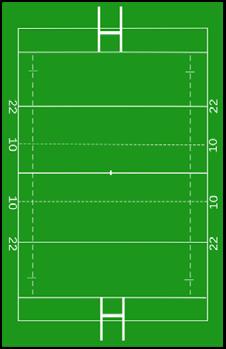
¼ FIELD
¼ FIELD
Portable Full bolsters.
Portable Full bolsters.
Applicable
Applicable
½ FIELD
½ FIELD
Goal
Goal
Portable Full
Portable Full
Applicable
Applicable
© 2018 AUCKLAND RUGBY. ALL RIGHTS RESERVED.
• •
• • •
© 2018 AUCKLAND RUGBY. ALL RIGHTS RESERVED.
• •
• • •
Auckland Rugby | Handbook 2024 134
FIELD (40m x 27.5m)
FIELD (40m x 27.5m)
3/4 Field (80m x 60m)
Portable goal post if possible size posts on sideline need bolsters.
Portable goal post if possible size posts on sideline need bolsters.
Portable goal post recommended
Full size posts on sideline need bolsters.
Applicable to
Applicable to
• U11 Tackle
Applicable to
U6 Rippa / U7 Rippa
• U13 Open Girls Tackle
U6 Rippa / U7 Rippa
U8 Tackle
U8 Tackle
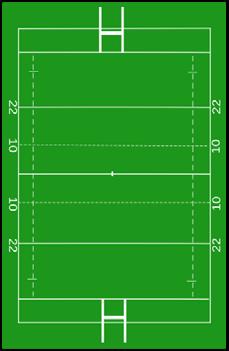
Full Field
FIELD (60m x 35m)
FIELD (60m x 35m)
Goal to 10m line (across the field)
Full size posts on sideline need bolsters.
Goal to 10m line (across the field)
Applicable to
• U12 Tackle
Portable goal post recommended size posts on sideline need bolsters.
Portable goal post recommended size posts on sideline need bolsters.
Applicable to
• U13 Tackle (except U13 Open Girls Tackle)
Applicable to
U9 – U11 Rippa
U9 – U11 Rippa
• U15 Open girls Tackle
U12 – U17 Rip
• U17 Open girls Tackle
U12 – U17 Rip
U9 – U10 Tackle
U9 – U10 Tackle
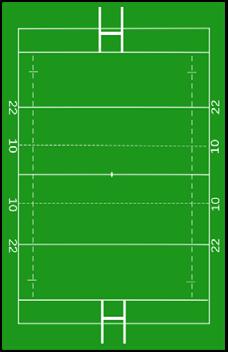
Portable Full Applicable
Portable Full Applicable
FULL Full Applicable
FULL Full Applicable
1
• •
¾
• • • •
1
• •
¾
• • •
•
www.aucklandrugby.co.nz 135
Club Delegate Contacts Email Mobile Carlton Juniors Joel Stewart carltonjuniors@gmail.com 021 651 777 College Rifles Jess Rowe juniorsport@collegerifles.co.nz 027 478 0287 East Tamaki Naisa Namoa naisa.namoa@gmail.com 027 646 157 Eden Morganne Sale juniordelegate@edenrugby.co.nz 021 255 6747 Grammar Juniors Craig Caesar craig@caesarhomes.co.nz 022 102 8453 Grammar TEC John Hall juniors@grammartec.co.nz 027 622 3383 Manukau Rovers Scott Morrow scott@morrowfurniture.co.nz 021 251 2802 Marist Ernesto Bruni Zani ernibz67@gmail.com 021 881 068 Marist Eastern Ross Blenkinsopp president@merugby.co.nz 021 761 362 Mount Roskill Mount Wellington Natalia Solomon junior.rugby02@gmail.com 021 115 7025 Otahuhu Jaymee Hu’akau jmsua01@yahoo.co.nz 021 123 6282 Pakuranga Dave Grant davenjo56@gmail.com 021 512 567 Papatoetoe Juliet Faaui Ponsonby Geoff Buchanan gebuchanan@xtra.co.nz 021 246 4841 Ponsonby - Kelston Mark Sutton mark.sutton@carwarehouse.co.nz Suburbs Darren Brewer Darren@suburbsrugby.co.nz 027 271 1414 Te Papapa Steve Hessey shessey@labelmakers.co.nz 021 314 729 Auckland Rugby | Handbook 2024 136
Junior
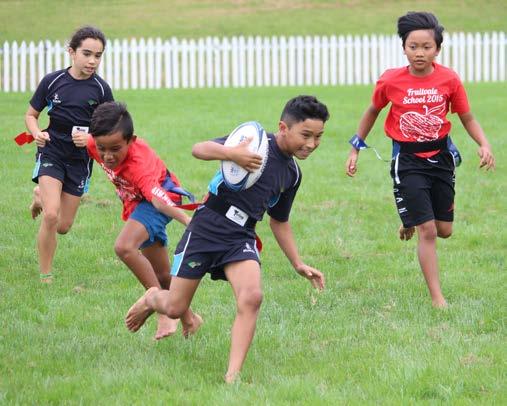
University Max Douglas max.douglas@aurfc.co.nz 027 2800 198 Waiheke Island James Bailey waihekejuniorrugby@gmail.com 027 464 1310 Waitakere City Saylesh Bhula jnr.delegate@waitakererugby.co.nz 021 444 522 Waitemata Debbie Tane debbietane@hotmail.com 021 213 7434 www.aucklandrugby.co.nz 137
2024 Junior Rugby Grade Weight/Age Chart
Primary Determinants for Age Grade Eligibility:
• A player’s Year Group at School will serve as the primary determinant in determining the relevant age grade. For instance, Year 3 children will play U8s, and Year 8 children will play U13s, aligning with NZR’s approach.
Secondary Determinant for Irregularities:
• A player’s age as of 1 April of the year in question will be used as a secondary determinant for any potential irregularities arising from differences in a player’s entry into Primary School and their age.
These amendments aim to streamline the age grade eligibility process, ensuring players are placed in teams based on their educational progression and age, thereby enhancing the quality of experience for participants. Clubs must make informed decisions around players close to the weight limit for their preferred grade during player registration/weigh-in and make allowances for growth (weight increase of 4kgs) to avoid the disruption and unsettling effect of moving a player mid-season to a higher grade to achieve weight compliance. Their Club’s JRC Delegate must sign off team sheets before submitting them to the ARU – JRC Delegates to ensure all players comply with the applicable grade criteria.
Player Eligibility Determinants (in order):
Year Level Club administrators can initially determine player eligibility based on year level and date of birth without applying for dispensation.
Date of Birth
Weight
JTC will also consider these determinants when considering a dispensation request. Clubs should identify this information within their application. Ability
For special dispensations.
• The player must be within three months of the age criteria for the grade they are applying for.
• The player must weigh a minimum of 5kg less than the maximum weight for the grade applying for
• The player must demonstrate rugby maturity aligned with the grade applying for (struggling to participate in the correct grade at the same level as his/her peers).
• Any player may play above his/her appropriate eligible grade (maximum one year or grade), providing the weight criteria for that grade are met and the player is comfortable participating at the higher level.
Auckland Rugby | Handbook 2024 138
The Junior Grades Chart is designed to be inclusive without risking player safety
The Junior Grades Chart is designed to be inclusive without risking player safety by allowing large size disparities.
age of Junior players is taken from the 1st of April in the current year.
Primary Determinant Secondary Determinant Determinant School Year Age on 1 April Grade Name Grade Info Team SizeField SizeDay Played Year 1 5 Any1/04/2019 U6 Rippa Mixed 7 a -side1/4 Field Saturday Year 2 62/04/20171/04/2018 U7 Rippa Mixed 7 a-side1/4 Field Saturday 2/04/20161/04/2017 U9 Rippa Mixed Friday Night 2/04/20151/04/2016 U9 Girls Rippa Girls Only Saturday 2/04/20141/04/2015 U11 Rippa Mixes 2/04/20131/04/2014U11 Girls RippaGirls Only 2/04/20121/04/2013U13 Boys RipBoys
Friday
2/04/20111/04/2012U13 Girls RipGirls
Saturday 2/04/20101/04/2011U15 Boys RipBoys Only 2/04/20091/04/2010U15 Girls Rip Girls Only Year 11 or 1215 or 162/04/20071/04/2009U17 Girls RipGirls Only 7 a side 1/2 Field Friday Night
WEIGHT/AGE
Only
Night
Only
2024 JUNIOR RUGBY GRADE
CHART
Year 7 or 8 13 or 14 Year 9 or 10 Friday
7 a-side1/2 Field Saturday 7 a side 1/2 Field 9 or 10 Year 5 or 6 7 a-side1/2 Field 7 or 8 11 or 12 Transition from RIPPA to RIP RugbyBegin to learn Scrum and lineout skills Date of Birth Range (Birthday falls between) 1/2 Field 7 a side Year 3 or 4 Primary Determinant Secondary Determinant Determinant School Year Age on 1 April Grade Name Grade Info Team SizeField SizeDay Played School Year 1 5 Any1/04/2019 U6 Rippa Mixed 7 a -side1/4 Field Saturday Year 2 62/04/20171/04/2018 U7 Rippa Mixed 7 a-side1/4 Field Saturday 2/04/20161/04/2017 U9 Rippa Mixed Friday Night 2/04/20151/04/2016 U9 Girls Rippa Girls Only Saturday 2/04/20141/04/2015 U11 Rippa Mixes 2/04/20131/04/2014U11 Girls RippaGirls Only 2/04/20121/04/2013U13 Boys RipBoys Only Friday Night 2/04/20111/04/2012U13 Girls RipGirls Only Saturday 2/04/20101/04/2011U15 Boys RipBoys Only 2/04/20091/04/2010U15 Girls Rip Girls Only Year 11 or 1215 or 162/04/20071/04/2009U17 Girls RipGirls Only 7 a side 1/2 Field Friday Night 2024 JUNIOR RUGBY GRADE WEIGHT/AGE CHART
The
Night Non-Contact Rugby
by
Year 7 or 8 13 or 14 Year 9 or 10 Friday Night Non-Contact Rugby 7 a-side1/2 Field Saturday 7 a side 1/2 Field 9 or 10 Year 5 or 6 7 a-side1/2 Field 7 or 8 11 or 12 Transition from RIPPA to RIP RugbyBegin to learn Scrum and lineout skills Date of Birth Range (Birthday falls between) 1/2 Field 7 a side Year 3 or 4 www.aucklandrugby.co.nz 139
allowing large size disparities. The age of Junior players is taken from the 1st of April in the current year.
2024 Junior Rugby Grade Weight/Age Chart
Other important notes
• Any player weighing over the listed grade weight limit during the season must be moved to the appropriate grade to achieve weight compliance.
• When weighing a player, the minimum items of clothing to be worn must be shorts & tee shirt (or top & bottom).
• Skins or compression apparel are not acceptable items of clothing unless covered by a top or bottom.
• U8 & U11 grades are compulsory transitions for all players. An application for exemption must be made to the JRC Technical Committee for any player with special circumstances that would not allow this.
• Club sanctions will apply for any team fielding players non-compliant with JRC rules.
• All tackle grade teams must present their 2024 ARU-endorsed Team Sheet to the opposition team management before the commencement of each game. This takes effect from the first drawn game.
CHART NOTES:
1. The child’s year at school should be used as the primary determinant for team allocation. The child’s age as of April 1 should be used as the secondary determinant.
2. Weight limits are the maximum weight a player may achieve through the end of the 2024 rugby season.
3. Players who weigh over the maximum weight for any grade must move to a weight appropriate grade.
4. Please plan for growth during the season and put players in the correct weight grade/ team to reduce disruption during the year

Contact Rugby Auckland Rugby | Handbook 2024 140
Contact Rugby
Primary Determinant Secondary Determinant SizeField SizeDay Played School Year Age on 1 April Grade NameGrade InfoTeam Size Field Size Day Played -side1/4 Field Saturday U8 Open a-side1/4 Field Saturday U8 Restricted 30kg & under Friday Night U9 Open Saturday 1/04/2016U9 Restricted 35kg & under U9 Open Girls U10 Open U10 Restricted 40kg & under Friday Night U11 Open Saturday 2/04/20131/04/2014U11 Restricted45kg & under U11 Open Girls U12 Open 1/2 Field Friday Night U12 Restricted 55kg & under U13 Open U13 Capped80kg & under U13 Restricted 60kg & under U13 Open Girls 10 a side 3/4 FieldFriday Night Year 9 or 1013 or 142/04/20091/04/2011U15 Open Girls 10 a side Full Field Friday Night Year 11 or 1215 or 162/04/20071/04/2009U17 Open Girls 15 a side Full Field Friday Night disparities. Friday Night a-side1/2 Field Saturday 1/2 Field a-side1/2 Field 7 a-side 1/4 FieldSaturday Year 6 10 8 Year 4 10 a-side 1/2 FieldSaturday 1/2 Field Saturday 10 a side 3/4 Field Saturday Full Field Year 7 Saturday FullField 15 a side Saturday Year 8 12 1/04/2013 2/04/20111/04/2012 11 2/04/2015 2/04/20141/04/2015 2/04/2012 15 a side 10 a side Date of Birth Range (Birthday falls between) 2/04/20161/04/2017 7 Year 3 1/2 Field 9 Year 5 1 should be used as the secondary during the year.
www.aucklandrugby.co.nz 141
Coach Education
Becoming a Coach
Coaching is fun and rewarding and without coaches the players would not get the opportunity to enjoy the game.
Auckland Rugby provides full training, specific to each grade, for all of those interested in becoming a qualified Junior Coach.
It is compulsory for all Small Blacks coaches to have an NZRU Small Blacks accreditation applicable to the grade level they will be coaching every year. Coaches who have attended and completed the requirements of the Small Blacks modules will be awarded NZRU Small Black accreditation
There are three Small Blacks grade levels:
• Beginning Rugby – All Rippa Grades
• Learning Rugby U8 –U11
• Playing Rugby U12 – U13
For more information check http://www.aucklandrugby.co.nz/Coaching/Coaching-3 for venues, dates and times of courses.
Guidelines for Coaches
• Coaches of U6-U8 grades are allowed on the field of play with their teams.
• You are only on the field to teach your players general and positional play.
• Stand well clear of all players so you do not interrupt the flow of play.
• Do not show any aggression towards your own and the opposing players and coach.
• Do not intimidate opposition players – leave it to their coach to control them.
• You must have a clear and full understanding of the rules.
• Do not tell the referee how to do their job.
• Should the referee take offence at your coaching attitude he/she has the right to warn you. Failing that, they can ask you to leave the field of play. A replacement is permitted.
• Children at this age need your guidance. Done properly you will get good results and a lot of enjoyment out of this rugby
Coaches Responsibilities
• Make a personal commitment to keep yourself informed on sound coaching principles through Auckland Rugby Coaching Courses.
• Ensure all equipment and facilities meet safety standards and that you use drills and training methods that are both safe and effective for your player’s needs.
• Teach your team to play within the rules of the game
• Positively reinforce the actions of players.
• Lead by example.
• Create an enjoyable environment in which to play the game.
• Develop team respect for referees.
• Give all players the opportunity to participate in the game.
• Insist on Fair Play and discipline.
Auckland Rugby | Handbook 2024 142
• Be reasonable on the demand on player’s time, energy and enthusiasm
• Encourage sportsmanship.
Verbal or physical harassment of any kind towards match officials will result in the stoppage of play and/or person(s) evicted from grounds. Official complaints will result in an appearance with the Auckland Rugby Union Judicial Committee
ASSRU EXECUTIVE COMMITTEE
President James Bentley 09 524 8108 jbentley@st-peters.school.nz
Chairman Brett Kingstone 09 524 8108 bkingstone@st-peters.school.nz
Secretary Scott Mansell 021 510 257 mansell@tamaki.ac.nz
Executive Committee Members
Karl McLennan Botany Downs Secondary College
Allie Wright Mt Albert Grammar School
Tutuila Lio Vaauli St Pauls College
Chris Oates Auckland Grammar School
Francis Stowers Sacred Heart College
Max Guptill One Tree Hill College
Nigel Hurst De La Salle College
Scott Palmer Kings College
Jim Lonergan Macleans College
Alex Bing Marist College
Hamish Muirhead College Sport
Alison Hall Auckland Rugby Referees
Jarrod Syman Auckland Rugby Union
www.aucklandrugby.co.nz 143
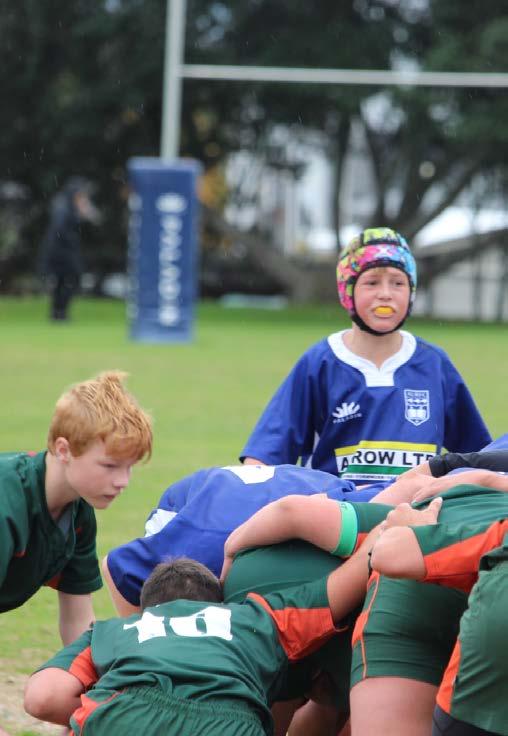
Auckland Rugby | Handbook 2024 144

www.aucklandrugby.co.nz 145
2024 School Rugby Contacts
School Delegate/Rais Email
ACG PARNELL
COLLEGE (ACG) GILLIAN MAGERKORTH gillian.magerkorth@acgedu.com
AORERE COLLEGE SHEPPARD TOKAHERE stokahere@aorere.ac.nz (AOR) TEVITA TUPOU ttupou@aorere.ac.nz
AUCKLAND GRAMMAR SCHOOL (AGS) CHRIS OATES c.oates@ags.school.nz
AUCKLAND GIRLS
GRAMMAR (AGG) JUDY REVELL jrevell@aggs.school.nz
ADVENTIST HIGH SCHOOL (ASDAH) GENESIS SUA TARIAU genesis@asdah.school.nz
AVONDALE GRACE HARPER-TIERNEY G.Harper-Tierney@avcol.school.nz COLLEGE (AC) JOSEPH BUCHANAN J.Buchanan@avcol.school.nz
BOTANY DOWNS
SECONDARY COLLEGE KARL McLENNAN k.mclennan@bdsc.school.nz (BDSC)
DE LA SALLE NIGEL HURST hurstn@delasalle.school.nz COLLEGE (DLS) ULU HAKEAGATOA Hakeagatoau@delasalle.school.nz
DILWORTH
SCHOOL (DIL) GARETH PICKERING g.pickering@dilworth.school.nz
EDGEWATER COLLEGE (EC) JODI BENJAMIN J.Benjamin@edgewater.school.nz
ELIM CHRISTIAN COLLEGE (ELIM) KIM BORTHWICK kim.borthwick@elim.school.nz
GLENDOWIE LYDIA BROWN brn@gdc.school.nz COLLEGE (GDW) JOEL WIGGANS joel.wiggans@gmail.com
GREEN BAY HIGH SCHOOL (GBHS) HAMISH MACKAY hamish.mackay@greenbayhigh.school.nz
HENDERSON HIGH SCHOOL (HHS) DAVID TILLER dtiller@hhs.school.nz
SIR EDMUND HILLARY COLLEGE (SEHC) JARED MATAUIAU jmatauiau@sehc.school.nz
HOWICK COLLEGE ADELITA SOTUTU adelita.sotutu@howick.school.nz (HC) WAISAKE SOTUTU waisake.sotutu@howick.school.nz
KELSTON BOYS HIGH SCHOOL (KBHS) MATT HOWLING m.howling@kbhs.school.nz
Auckland Rugby | Handbook 2024 146
KELSTON GIRLS
COLLEGE (KGC) THERESA TAEALII sportco@kelstongirls.school.nz
KIA AROHA
COLLEGE (KAC) KENNEDY SHAHWE kennedy.shahwe@kiaaroha.school.nz
KING’S COLLEGE (KC) SCOTT PALMER s.palmer@kingscollege.school.nz
LISTON COLLEGE (LIS) TANE HUGHES tane.hughes@liston.school.nz
DANIEL MORATH daniel.morath@liston.school.nz
LYNFIELD JONATHAN ILAUA jilaua@lynfield.school.nz
COLLEGE (LC) FELICITY WALBRAN fwalloran@lynfield.school.nz
MACLEANS BEVAN PACKER bevan.packer@macleans.school.nz
COLLEGFE (MCL) DEAN SIBSON Dean.Sibson@macleans.school.nz
MANGERE
COLLEGE (MAN) TAI UAMAKI t.uamaki@mangere.school.nz
MARCELLIN
COLLEGE (MC) DIVESH GOUNDAR goundard@marcellin.school.nz
MARIST COLLEGE ELYSE MCKECHNIE e.mckechnie@maristcollege.school.nz (MART) ANNA SENIO a.senio@maristcollege.school.nz
MCAULEY GIRLS
HIGH SCHOOL (MCAU) MRS ROBERTSON crobertson@mcauleyhigh.school.nz
MT ALBERT CARLIN CROSSAN Carlin.Crossan@mags.school.nz
GRAMMAR SCHOOL TUTU TAIREA Tutu.tairea@mags.school.nz (MAGS)
MT ROSKILL GRAMMAR SCHOOL (MRGS) CAMERON BITCHENER cameron.bitchener@mrgs.school.nz
ONEHUNGA
HIGH SCHOOL (OHS) STEVE FREAR Sfrear@ohs.school.nz
OTAHUHU
COLLEGE (OC) LEUA TAMATI ltamati@otahuhucollege.school.nz
ORMISTON SENIOR COLLEGE (ORMC) CAITLIN RARITY crarity@ormiston.school.nz
PACIFIC ADVANCE SENIOR SCHOOL DAVID AFOA davida@pass.school.nz (PASS)
PAKURANGA
COLLEGE (PC) CLIVE DANIELS cdaniels@pakuranga.school.nz
PAPATOETOE
HIGH SCHOOL (PAP) CHRIS LATHAM ChLatham@papatoetoehigh.school.nz
www.aucklandrugby.co.nz
147
2024 School Rugby Contacts
ONE TREE HILL NALE TAUKOLO Ntaukolo@onetreehillcollege.school.nz
COLLEGE (OTHC) MAX GUPTILL max.guptill@mcct.org.nz
RUTHERFORD
COLLEGE (RC) GILLIAN BLOXHAM BloxhamG@rutherford.school.nz
SACRED HEART NICK GUISE nguise@sacredheart.school.nz
COLLEGE (SHC) FRANCIS STOWERS fstowers@sacredheart.school.nz
SANCTA MARIA
COLLEGE (SMC) CHARLOTTE MCKELL c.mckell@sanctamaria.school.nz
SELWYN COLLEGE (SC) ALEX RAFFERTY raffertya@selwyn.school.nz
SOUTHERN CROSS
SENIOR SCHOOL ROD RATU rratu@southerncross.school.nz (SCSS) MAITUA FETERIKA mfeterika@southerncross.school.nz
ST KENTIGERN BEN SALT ben.salt@saintkentigern.com
COLLEGE (SKC) TASESA LAVEA tasesa.lavea@saintkentigern.com
ST PAUL’S MICHAEL JARVIS Mjarvis@stpaulscollege.co.nz
COLLEGE (SPL) DAVE MCDERMOTT dmcdermott@stpaulscollege.co.nz
ST PETER’S BRETT KINGSTONE bkingstone@st-peters.school.nz
COLLEGE (SPC) JEFF IEROME Jierome@st-peters.school.nz
TAMAKI COLLEGE (TC) SCOTT MANSELL mansell@tamaki.ac.nz
ANITA SARICH sarich@tamaki.ac.nz
TANGAROA RENEE TAWHI reneet@tangaroa.school.nz
COLLEGE (TAN) CHRIS BEAN chrisb@tangaroa.school.nz
WAIHEKE
HIGH SCHOOL (WHS) JOHN KEEVILL keevillj@waihekehigh.school.nz
WAITAKERE
COLLEGE (WAIT) PAUL MCGRATH pmcgrath@waitakerecollege.school.nz
WESTERN SPRINGS PETER MCINTYRE mcintyrep@wsc.school.nz
COLLEGE (WSPR) SAMI VAAULIA vaaulia@wsc.school.nz
ARRA ALISON HALL alison@koru.school.nz
COLLEGE SPORT MARK BARLOW mark@collegesport.co.nz
HAMISH MUIRHEAD hamish@collegesport.co.nz
AUCKLAND RUGBY JARROD SYMAN Jarrod.Syman@aucklandrugby.co.nz
EAMON REILY Eamon.Reily@aucklandrugby.co.nz
MARCEL MILO-HARRIS Marcel.Milo-Harris@aucklandrugby.co.nz
KENNEDY LIMPUS Kennedy.limpus@aucklandrugby.co.nz
TAURIMA MORRIS Taurima.Morris@aucklandrugby.co.nz
Auckland Rugby | Handbook 2024 148
2024 Rugby Dates
TERM 1
January 30 Tue Start of Term 1
February 7 Tue Waitangi Day Holiday
March 29 Good Fri
April 1 Easter Monday
April 12 Fri End of Term 1
April 25 Thurs ANZAC Day
TERM 2
April 29 Mon Start of Term 2
May 4 Promotion Relegation
May 11 Sat Round 1 - 1st XV
May 18 Sat Round 2 Start of Grade rugby
May 25 Sat Round 3
June 3 Mon King’s Birthday
June 8 Sat Round 4
June 15 Sat Round 5
June 22 Sat Round 6
June 28 Fri Matariki
June 29 Sat Round 7
July 5 Fri End of Term 2
July 6 Sat Round 8
TERM 3
July 22 Mon Start of Term 3
July 27 Sat Round 9
August 3 Sat Round 10
August 10 Sat Round 11
August 17 Sat Semi-finals First XV
August 24 Sat First XV Finals Grade Semi-finals
August 28 Wed Blues Semi
August 31 Sat Grade finals
Top 4 Blues playoffs
September 6 & 8 Fri & Sun NZSS Top 4
September 27 Fri End of Term 3
TERM 4
October 14 Mon Start of Term 4
October 28 Mon Labour Day
December 20 Fri End of Term 4
www.aucklandrugby.co.nz 149
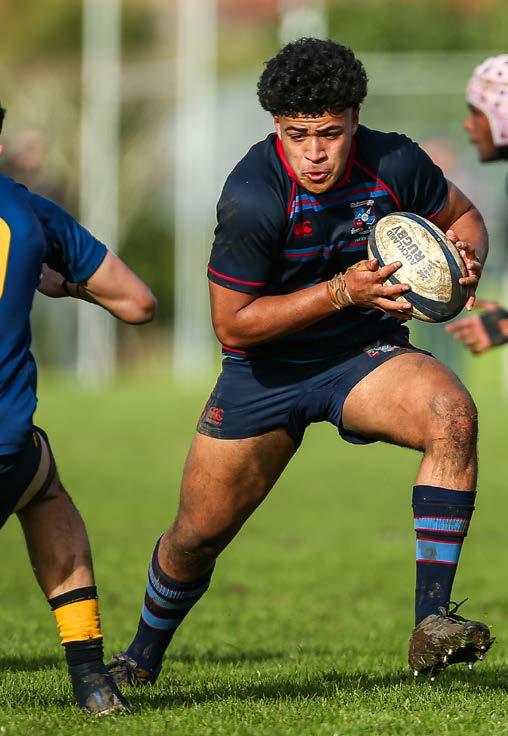
Auckland Rugby | Handbook 2024 150
Auckland Secondary Schools Rugby Union Constitution
(Amended March 2017)
1. NAME
The Union is called the “Auckland Secondary Schools Rugby Union” (ASSRU).
2. AFFILIATION
The Union is affiliated to the Auckland Rugby Union Inc and the Auckland Secondary Schools Heads Association Inc. (College Sport Auckland)
3. MEMBERSHIP
(a) All secondary schools with rugby teams within the Auckland Rugby Union District and where Principals are members of College Sport are deemed to be members.
(b) Schools without rugby teams in the competition of the previous season shall make application to play, in writing, to the ASSRU. Any such applications are subject to the approval of the Executive Committee.
4. ANNUAL GENERAL MEETING
(a) The Annual General Meeting (AGM) of the ASSRU shall be held prior to the end of October.
(b) Fourteen days’ notice of such meeting is to be given
(c) Each member school of the ASSRU shall be entitled to send one delegate only.
(d) The officers of the Union shall be elected at the AGM.
5. OFFICERS OF THE UNION
The appointment and election of the Officers of the Union will take place at the AGM of the ASSRU.
(a) President - appointed by College Sport.
(b) Chairman
(c) Secretary/Treasurer
(d) Delegate to the ARU
(e) Competition Supervisor
(f) Northern Region Delegate
(g) Executive Committee made of school delegates, College Sport, Auckland Rugby Referees Association and Life Members
6. THE COUNCIL OF DELEGATES (C.O.D.)
(i) This shall consist of one delegate from each member school.
(ii) At any meeting of the Council of Delegates, one half of the delegates will constitute a quorum.
(iii) The Council of Delegates shall elect the Executive Committee.
www.aucklandrugby.co.nz 151
Auckland Secondary Schools Rugby Union Constitution
7. THE EXECUTIVE COMMITTEE
The officers of the Union plus the following shall form the Executive Committee which will administer Auckland Secondary Schools Rugby according to its constitution.
(a) A delegate appointed from the Auckland Rugby Referees Association
(b) A delegate from the Auckland Rugby Union
(c) A College Sport representative.
8. SPECIAL GENERAL MEETING
(a) A Special General Meeting may be convened at any time by the Executive Meeting.
(b) A Special General Meeting may be convened upon the request of not fewer than five schools with seven days’ notice given to members.
9. JUDICIAL COMMITTEE
Where necessary the ASSRU will defer all Judicial & Disciplinary matters to the ARU Judicial Committee. All other matters will be dealt with on a case by case basis by the Executive Committee.
10. COMPETITION COMMITTEE
The Competition Committee is the Chairman, Secretary, Competition Supervisor and Draw Steward who is appointed by the Executive Committee. The Committee is chaired by the Competition Supervisor.
11. MATCHES - GAMES
The commencing date for all competitions will be determined by the Executive Committee after consultation with the College Sport.
12. STUDENT ELIGIBILITY
refer to College Sport By-laws.
13. PLAYING RULES OF THE UNION
All matches will be played in accordance with the World Rugby “Laws of the Game” and NZR “Domestic Safety Law Variations” (DSLV’s)
14. PLAYING GRADES AND WEIGHTS
Weight and/or age limits for each grade shall be determined by a General Meeting.
15. WEIGHING, AGE CERTIFICATION AND REGISTRATION
Dates and methods of weighing will be decided at a General meeting.
Auckland Rugby | Handbook 2024 152
16. LIFE MEMBERS
The Executive Committee can nominate life members who shall remain members of the Union for their respective lives. Each election must be unanimous and shall be for the purpose of recognition of special services rendered to the Union. Nomination for life membership shall be made only by the Executive Committee. The election of Life members will be held at The AGM, voted on by the Council of Delegates.
17 CHANGE OF CONSTITUTION
The Constitution of the ASSRU shall not be altered, added to or rescinded, except on the vote of a majority of two-thirds of the members present at any AGM or Special General Meeting duly convened. Notice of any proposed alteration, addition or rescission must be given in writing to the Secretary of the ASSRU at least 21 days before the meeting at which it is intended to propose such alteration, addition or recession. At least 14 days’ notice of such meeting shall be given to all members of the ASSRU. No alteration, addition or rescission shall be valid or of any effect, unless approved by the Executive Committee of the ASSRU.
18 REPORTS
For presentation at the AGM. Each of the following will provide a written Annual Report which will be presented at the AGM
(i) Chairman
(ii) Secretary/Treasurer
(iii) ARU Delegate
(iv) Representative Manager(s)
(v) Northern Region Delegate.
Auckland Secondary Schools Rugby Union By-Laws & Rules Of Competition
For the 2023 copy please visit https://www.aucklandrugby.co.nz/School/Forms-Documents-1’
www.aucklandrugby.co.nz 153
Club & Council Grounds
Ground Home Club Address
Aorere Park Raglan St, Off Buckland Rd, Papatoetoe
Archibald Park Ponsonby Kelston Archibald Rd, Kelston
Auckland Domain Park Rd, Grafton
Avondale Racecourse Racecourse Parade / Wingate St, Avondale
(Sir) Barry Curtis Park Marist Eastern Chapel Road, Flatbush
Bell Park Pakuranga United RFC Bell Rd, Pakuranga
Colin Maiden Park Auckland University RFC Merton Rd, Glen Innes
College Rifles Park College Rifles RFC Haast St, Remuera
Cornwall Park Carlton Juniors Puriri Drive, Greenlane
Cox’s Bay Reserve Westend Rd, Westmere
DB Park Off Bader Dr, Mangere Town Centre
East Tamaki Domain East Tamaki RFC East Tamaki Rd, Otara
Eden Park Off Sandringham Rd, Reimers Ave
Elm Park Off Gossemer Drive, Pakuranga
Fearon Park Mt Roskill Juniors RFC Akarana Ave, Mt Roskill
Fergusson Park Te Papapa Onehunga RFC Oranga Ave, Penrose
Green Bay Reserve Cliff View Drive, Green Bay
Gribblehirst Park Eden RFC Sandringham Rd, Sandringham.
Hamlin Park Mt Wellington RFC Hamlin Rd, Mt Wellington
Liston Park Michaels Ave, Ellerslie
Lloyd Elsmore Park Pakuranga United RFC Bell Rd, Pakuranga
May Rd War Memorial Park May Rd, Mt Roskill
Mt Wellington War Mem Marist Brothers Old Boys RFC Dunkirk Rd, Panmure
Norana Park Norana Ave, Favona
Onetangi Sports Park Waiheke Island Rugby Club O’Brien Rd, Waiheke Island
Orakei Domain Grammar Tec RFC Watene Cres, Okahu Bay
Papatoetoe Recreation Papatoetoe RFC Great South Rd, Hunters Corner
Pigeon Mountain Pigeon Mountain Rd, Pakuranga
Auckland Rugby | Handbook 2024 154
Ground Home Club Address
Shadbolt Park Suburbs RFC Portage Rd, New Lynn
Shore Rd Reserve Grammar Juniors Shore Rd, Newmarket
Sturges Park Otahuhu RFC Awa St, Otahuhu
Te Atatu South Park Kirrie Ave, Te Atatu South
Te Puke O Tara East Tamaki Rd
Waitakere Stadium Waitakere RFC Central Park Drive, Henderson
Waitemata Park Waitemata RFC Swanson Rd, Henderson
Williams Park Manukau Rovers RFC Viscount St, Mangere
Western Springs Stadium Ponsonby RFC Gt North Rd, Western Springs
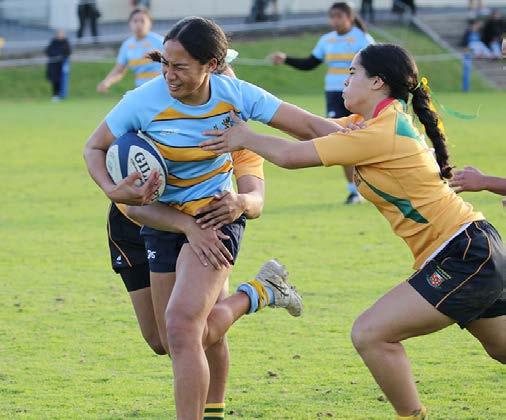
www.aucklandrugby.co.nz 155
Blue Card Overview
What is a Blue Card?
• A blue card is shown to a player by a referee for displaying symptoms of concussion
Who can give out a blue card
• An official referee - member of Auckland Rugby Referees Association 2nd year and above (Not an associate ref or parent/coach ref)
How do refs know if someone is concussed?
• There are a number of signs and symptoms that people suffering from concussion display and all referees have/are undergoing training in ‘identification of concussion symptoms’ through ARRA provided by Axis Sports Medicine Team.
What happens when someone is Blue carded?
1. Referee identifies a player they consider to be displaying signs of concussion
2. Player receives a blue card during a match – they must leave the field and not return.
3. Referee submits a Blue Card Report to Auckland Rugby
4. ARU sends Player and club a letter outlining the process. Players name kept on Blue card register
5. Player sees doctor as soon as possible after Blue Card issued (stage 1 of Graduated Return to Play GRTP).
6. The player cannot play until they complete the Graduated Return to Play Protocols (GRTP = 21 days for players 19 and over, 23 days for U19)
7. Player receives medical clearance from a doctor.
8. Medical clearance sent to Auckland Rugby
9. Player cleared to play by Auckland Rugby.
10. Notification given to club and kept on register
11. Please note - even though a player may have passed the minimum return to play period, they cannot play until they have submitted their medical clearance and received clearance from Auckland Rugby
12. New Zealand Rugby will cover the cost for all blued carded players’ medical clearance examinations. Players need to keep their receipts and send to Auckland Rugby, so the can be reimbursed
More information can be found at:
https://www.nzrugby.co.nz/about-nzr/policies-regulations-and-rules/safety-andwelfare/concussion & www.axissportsmedicine.co.nz
Auckland Rugby | Handbook 2024 156

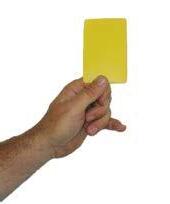
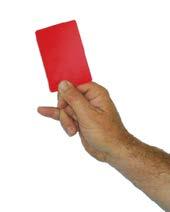
112 AUCKLAND RUGBY HANDBOOK 2022
112 AUCKLAND RUGBY HANDBOOK 2022
AUCKLAND RUGBY HANDBOOK 2022 13
www.aucklandrugby.co.nz 157
DISCIPLINARY SECTION
DISCIPLINARY SECTIONDISCIPLINARY SECTION
PARTNERS
FLOWCHART ( PRE HEARING )
Does the matter involve a Match call off by a Referee for persistent or serious Foul Play or Misconduct by Players, team management or supporters?
Has referee’s report been received?
(Refer Section 3, Part 6 of NZRU Disciplinary Rules 2021 )
Refer to hearing
Does the matter involve Misconduct by a Player or Person in connection with a Match?
Has misconduct complaint been received or laid? (Refer Section 3, Part 5 of NZRU Disciplinary Rules 2021)
ARU Complaints Review Officer to assess whether matter is referred to hearing
Has the Player been Temporarily Suspended three times? (Refer Section 3, Part 4 of NZRU Disciplinary Rules 2021) Automatic onematch suspension
Has a Referee Report been filed?
(Refer Section 3, Part 3 of NZRU Disciplinary Rules 2021)
Has a complaint been laid against the Player?

Does the matter involve Foul Play by a Player during a Match?
Was the Player ordered off?
(Refer Section 3, Part 2 of NZRU Disciplinary Rules 2021)
(Refer Section 3, Part 1 of NZRU Disciplinary Rules 2021)
ARU Complaints Review Officer to assess whether matter is referred to hearing
Does the Player request a hearing?
ineligibility to play CONVENE HEARING (REFER SECTION 4 OF NZRU DISCIPLINARY RULES 2021)
Written Notice to player including:
Player receives automatic twoweek suspension unless : 1. Player or Club requests a hearing. 2. Union Judicial Convenor or Union Complaints Review Officer requests a hearing
AUCKLAND RUGBY HANDBOOK 2022 113
o Copy of
o Advice
YES NO YES YES YES YES YES YES YES YES YES YES NO NO NO NO AUCKLAND
PROCESS
Auckland Rugby | Handbook 2024 158
o Details of hearing
report or complaint
regarding
RUGBY UNION DISCIPLINARY
AUCKLAND RUGBY UNION DISCIPLINARY PROCESS FLOWCHART (POST HEARING)
DISCIPLINARY HEARING
(REFER SECTION 4 OF NZRU DISCIPLINARY RULES 2021)
Has the persistent or serious Fou l Play or Misconduct been made out?
Has the Misconduct been made out?
YES YES
Sanctions imposed under Rules 91 and 92 of NZRU Disciplinary Rules 2021
Sanctions imposed under Rule 88 and Section 10 of NZRU Disciplinary Rules 2021
Has the Foul Play been made out?
YES
Sanctions imposed under Rule 87 and Section 9 of NZRU Disciplinary Rules 2021

RIGHT OF APPEAL TO AUCKLAND RUGBY UNION APPEAL COMMITTEE (REFER SECTION 5 OF NZRU DISCIPLINARY RULES 2021)
FURTHER RIGHT OF APPEAL TO NEW ZEALAND RUGBY UNION JUDICIAL COMMITTEE
(REFER SECTION 5 OF NZRU DISCIPLINARY RULES 2021) Disciplinary hearings are held in the Auckland Rugby Union Classroom, commencing at 5.30pm on Tuesdays. Clubs and players will be contacted if they are required to at tend. The ARU Classroom is located between Entry A & B (beside ARU Merchandise/Ticket Office), Ground Level, Eden Park, Walters Road entrance, Mt Eden .
This flowchart is a guide only. Please refer to the most recent edition of the NZRU Disciplinary Rules. NZRU Disciplinary Rul es will apply if there is any difference between the information in this chart and the Rules.
114 AUCKLAND RUGBY HANDBOOK 2022
www.aucklandrugby.co.nz 159
Covers Internal Thank You To Our Advertisers RobLawMax Recruitment IFC Bracewell Limited IBC View Master Window Doors Ltd OBC 2 Degrees 7 Baker Tilly Staples Rodway 82 Barfoot and Thompson 3 Barfoot & Thompson - Paul Neshausen 132 Bhana Family Farms 2 Debt Managers 40 Farrelly Photos 24 Hamill Refrigeration Limited 29 HART Sport 8 James G. Donovan 161 North Harbour Decorating Services 20 NZ Herald 6 Paladin Sports 4 Plymouth Publishing Ltd 161 Pure Nutrition 18 ROC Build 48 Auckland Rugby | Handbook 2024 160
Email:
Plymouth Publishing has been supplying sporting and recreational club hand books, annual reports and yearly publications for over 20 years throughout the country.
We specialise in sporting club handbooks containing yearly programmes. As well as club annual reports such as RSA and Cosmopolitan Clubs, for club members.


Contact us any time and find out just how easy and effortless your next publication can be.
You will be amazed that in most cases we can provide high quality printed books free of charge





James G. Donovan S olicitor - Howick • Buying and Selling Proper t y • Business Matters • Family Law • • Tra c O ences • Wills and Estates • $50 discount o your next sale or purchase - just mention this ad Phone: (09) 534 7169
info@jamesdonovan.co.nz | Fax: (09) 535 6720 | 22 Pic ton Street | PO Box 38-133 Howick
PUKEKOHE GOLF CLUB INC 2019 www.pukekohegolf.co.nz PONSONBY BOWLING CLUB INC Phone: (09) 376 3313 Email: admin@ponsonbybowls.nz www.ponsonbybowls.nz 2019-2020 MEMBER’S HANDBOOK ANNUAL REPORT 2018 40 Elliot Street, Papakura P. 09 489 9743 | E. sales@plymouthpublishing.co.nz W. www.plymouthpublishing.co.nz A. 3 Echelon Place | East Tamaki A Division of Alpine Print Limited www.aucklandrugby.co.nz 161
Auckland Rugby | Handbook 2024 162
Notes

Commercial Building Contractors and Apartment Specialists Proudly supporting Auckland Rugby T (09) 360 2644 W bracewell.co.nz
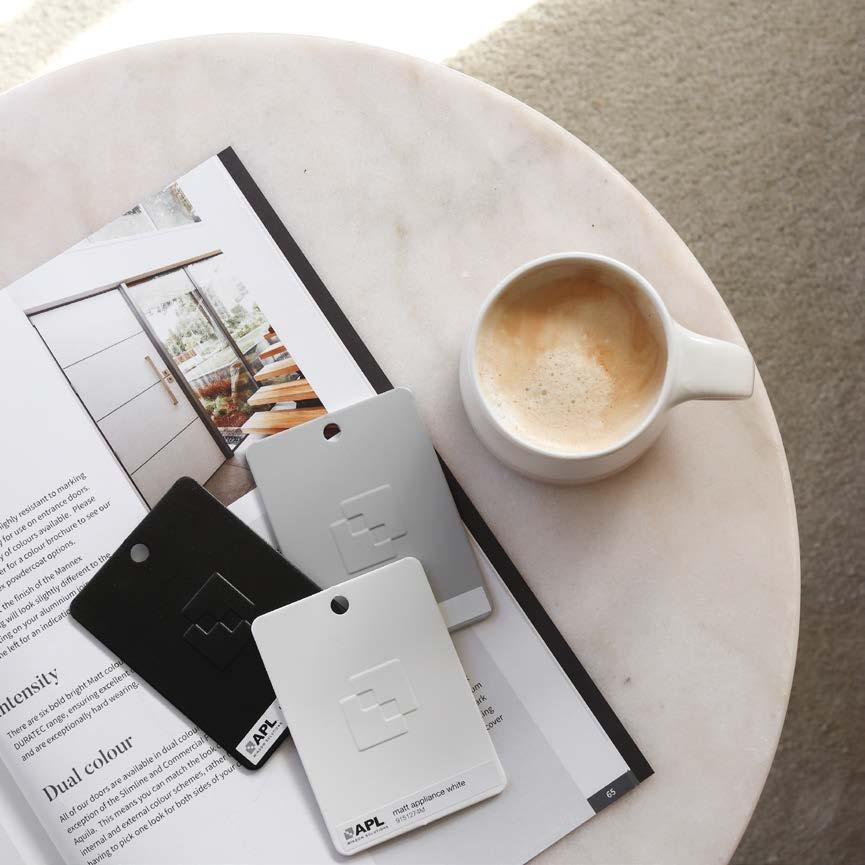
For ideas and advice about our exceptional windows and doors talk to View Master Auckland on 09 570 5271 or stop by 121 Morrin Road, St
P 09 570 5271 viewmaster.co.nz
Johns, Auckland.





























































































